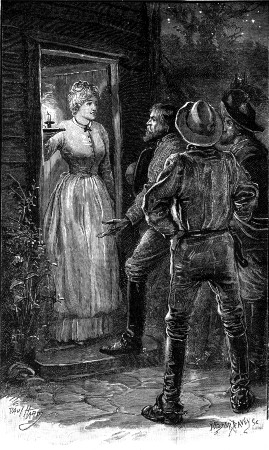 "EXCUSE OUR INTRUSION, MADAM."
"EXCUSE OUR INTRUSION, MADAM."(In the Shadow of the Sierras.)
Title: The Strand Magazine, Vol. 05, Issue 29, May 1893
Author: Various
Editor: George Newnes
Release date: November 10, 2009 [eBook #30443]
Most recently updated: October 24, 2024
Language: English
Credits: Produced by Victorian/Edwardian Pictorial Magazines,
Jonathan Ingram, Josephine Paolucci and the Online
Distributed Proofreading Team at https://www.pgdp.net
In The Shadow Of The Sierras.
The Royal Humane Society II.
Shafts from an Eastern Quiver XI.--In Quest of the Lost Galleon
Zig-Zags at the Zoo: Marsupial
Portraits of Celebrities at Different Times of their Lives.
The Adventures of Sherlock Holmes XVIII.--The Adventure of the Musgrave Ritual
From Behind the Speaker's Chair V.
At Dead of Night.
Illustrated Interviews: XXII.--Sir Robert Rawlinson
Beauties:—Children.
The Adjutant's Love-story.
The Queer Side of Things.
 "EXCUSE OUR INTRUSION, MADAM."
"EXCUSE OUR INTRUSION, MADAM."
Barbara Thorne sat leaning her head on her hand, looking at a photograph that lay on the table beneath her eyes. She had not intended to look for that when she pulled out a dusty drawer full of old letters, papers, and account-books to arrange and set in order. But when in the course of her rummaging and tidying she found that picture in her hand, she paused in her task. The neglected drawer stood open, with its dusty packets and rolls of faded papers. Barbara had forgotten it and all else around her.
She sat there lost in memory, her eyes fixed upon the "counterfeit presentment" of the face that once had been all the world to her. She did not often think of Oliver Desmond now; to think of him meant only pain—pain of outraged pride and wounded love. She had outgrown the time when she could not tear her thoughts from him, when his face was in her "mind's eye" by night and day, and yet she shrank with a shuddering revolt of anguish from those pictures of the past which she could not banish. For the memory that was the locked-up skeleton of her life—that rattled its dead bones to-day as Oliver Desmond's pictured eyes smiled into hers—was a cruel memory indeed, of grief and wrong and bitter humiliation, of broken troth and shattered faith, insulted love, and crushed and martyred pride. The blow that had rankled like iron in her heart for years was base and cowardly as a stab in the back from the hand that should have shielded and cherished her.
How strange it seemed to her to-day to think she had outlived it all—the love, the anguish, the bitterness, which once had seemed undying! There was nothing to disturb her reverie; she was alone, had been alone all day, and yet not lonely, albeit this solitary Californian ranch, in a secluded valley amongst the foot-hills of the Sierras, was a lonesome-looking place enough. But Barbara had been too busy all day to sit down and realize the loneliness. She lived on the Saucel Ranch with her married brother and his wife, she and her sister-in-law doing all the housework between them—servants or "helps" being unattainable luxuries in those parts. Mr. and Mrs. Thorne had gone out for all the day and all the night; a nervous woman might well have shrunk from being thus left alone and unprotected in such a place; but if Barbara had ever been troubled with the nineteenth century malady of "nerves," she had lived it down since she had taken up her abode on the Saucel Ranch. Her hands were always full. Even now, her day's task done, she had set herself to "improve the shining hour" by "tidying-up" the bureau drawer, [Pg 436]in which she had come across the photograph of Oliver Desmond.
It was rarely indeed that Barbara Thorne indulged in reverie by day; the night was her time for silence and thought; but now she was so lost in the train of memories aroused by the sight of his portrait—memories which had lost their sharpest sting, and only hurt her now with a dull ache—she had even forgotten that an hour ago she had been looking out for somebody—somebody who would never allow the long, lonely day to pass without coming to see her!
Through the open window a flood of sunlight poured in and turned Barbara's fair hair to gold. Far off, above and beyond the sombre masses of the evergreen pine forests, a jagged range of mountain peaks, like tossing billows frozen at their height, shone in snowy silhouette against a sky of deep and vivid, cloudless blue.
The scene was fair, but Barbara's eyes were not lifted to dwell on its beauty; they were brooding on the face of the man she had loved, and—had she ever hated him? Did she hate him now? She did not hear a sound or a step, till a shadow fell across the sunlight, and a man stood on the threshold of the long French window, which was open down to the ground.
Barbara turned with a start, and made a hasty, involuntary movement to push the photograph aside as she sprang up—a movement that, slight, swift, and momentary as it was, yet did not pass unnoticed by the visitor's eye. What, indeed, was ever known to escape the eagle eye of Rick Jeffreys—better known in the neighbourhood of Eden City (which was the flattering appellation bestowed by its builders on the nearest settlement) as "Colonel Jeff"?
He was a tall man, of massive and powerful build, with somewhat harsh features, black hair and beard just touched with grey, and a sallow complexion sunburnt as brown as a berry. According to the prevalent fashion in those latitudes, he wore truculent-looking boots up to his knees, and a big sombrero hat slouched over his brow. There was a stern, hard expression about his face, except when he smiled or looked at Barbara Thorne. He did not look stern now, as she came quickly to meet him, and welcomed him with a smile that was perhaps less bright, a blush that was certainly deeper than usual. He spoke no word of greeting at first, only looked at her as if her face were a magnet that drew and held his eyes, then put his arm gently round her waist and bent his dark head to her fair one, and kissed her with infinite tenderness.
Barbara yielded to his caress with the soft yielding of a woman who loves. She did not belong to the class of those who, deceived by one, distrust all thenceforth—who hate all men for one false one's sake. And the time had come which she had never thought to see, when she—even she, Barbara Thorne, the deserted, slighted, jilted, held up to the insult of the world's pity—yet trusted, loved again. For this man's devotion had been balm to her bruised spirit—a healing balsam poured into the still smarting wounds of her once crushed and outraged pride.
"All alone, my little lady?" he said, softly.
"Yes; Tom and Hatty went off this morning."
"Been lonesome?"
"Oh, no; I've had plenty to keep me brisk and busy."
Colonel Jeff cast a glance at the table, at the photograph which lay there face upwards. "And who have you there?" he inquired, but not suspiciously. Barbara conquered a foolish impulse to put out her hand to intercept his as he went to pick up the portrait.
He glanced at it, first easily, then keenly, and his dark brows lowered ominously. Colonel Jeff did not look like a person to offend—if one had the choice.
"You are thinking of that blackguard still?" he said; and in his tone anger and pain struggled equally matched.
"I found that photograph by chance while I was looking over a drawer full of old papers," she replied, answering the spirit rather than, the letter of his words.
"And you were looking at it as if—as if—it was all the world to you!" he retorted.
"My looks belied me, then. It is a memory only—and a painful one," she said, with the slightest shade of a tremor in her sweet voice.
"Only a memory?" fixing the stern questioning of his piercing eyes upon her.
"If it were more, should I be what I am to you?" she replied, meeting his look frankly.
"What are you to me?" he demanded. The words might have sounded brutal had the tone been different, but though they were harshly spoken, they bore no suggestion of denial or rebuff, no faintest hint of insulting disclaimer. "You know," he continued, "we both know, that you're the one woman in the world to me—but what more? What beyond that? Are you the woman who cares for me?"[Pg 437]
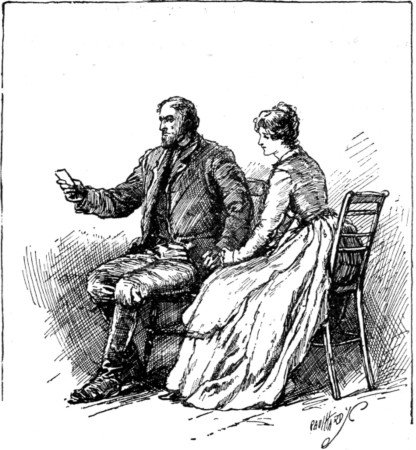 "HE GLANCED AT IT."
"HE GLANCED AT IT."
"For you more than for all the world beside."
"More than for——?" He cast a frowning glance at the photograph.
"Immeasurably more," she answered steadily, and the unconquerable truth in her forced her to add the word, "to-day!"
"To-day?" he echoed, with mingled anger and reluctant admiration. "Barbara, you are too honest to deny——" He paused with a quick indrawing of the breath and setting of the teeth.
"To deny the past?" her soft voice interposed as he paused. "Yes! I could never deny it! You know, Rick, you always knew, that I could not give you my yesterdays!"
"Barbara, I am jealous of those yesterdays," he said, after a silence.
"Why begrudge the yesterdays," she pleaded, "when all the to-morrows are yours?"
His dark eyes kindled with a deep and tender glow.
"All? All? None to share with me, or rob me? All mine?" He framed her delicate fair face between his big brown hands, and held it thus gently upturned to his as he gazed intently into it. "Barbara," he added, "do you know it would be a bad thing for any man who came between me and you?"
"No one could," she assured him earnestly.
Colonel Jeff clasped her in his strong arms.
"Is that so, indeed, my darling? my Barbara! my own one love," he whispered, pressing her to his heart.
"You must not be jealous of the past, dear Rick," she murmured.
"Forgive me my blundering roughness," he entreated her. "I ought not to have spoken so to you. Forgive me if I have hurt you, Barbara!"
"It did hurt me a little," she admitted. "Let us leave the dead bones to rest in their grave."
"I will never dig them up again," he promised her. "But put that away," he added, pushing the portrait aside. "It's very like him, and I hate to see it near you!"
Colonel Jeff had known Oliver Desmond, at least by sight and passing acquaintance, and he knew—as who did not?—Barbara Thorne's story; who had not heard the story of the bride deserted at the very altar, waiting in her bridal dress amongst the assembled party of her own and his friends—waiting for the bridegroom who never came?
Sometimes even now, when the memory of that horrible day came over Barbara, she shivered and turned sick and cold at heart. Only since she had known Rick Jeffreys loved her she had thought of it less; the scar of the old wound had ceased to throb.
At first she had thought Oliver Desmond was dead; felt sure that nothing but death could have kept him from her at that hour! But afterwards she and all the world—their world—learnt that he had left her for another; the one palliation of the cruel wrong and insult he had inflicted on his innocent and trusting betrothed being that it was no new love, but the resurrection of an old, supposed-to-be-dead passion that had lured him from her. Then they heard now and again rumours of Oliver Desmond's[Pg 438] career. It seemed to be a downward one. They heard of his drinking and gambling, sinking from bad to worse; of losses, of utter ruin. Now for years they had heard nothing of him at all; he had sunk out of knowledge, gone down under the storm of not unmerited misfortune; and his world knew him no more.
Their little differences made up, Rick Jeffreys spent a happy hour with Barbara, stayed until the golden haze of sunset was stealing soft and slow over the shadows of the sombre pine forest and the azure radiance of the sky; then he had an appointment to meet an old comrade in Eden City, and he tore himself reluctantly away from the Saucel Ranch—ready at the last moment to throw over his engagement and stay, if Barbara had urged him.
The shades of evening had closed when Barbara, having watched her stalwart lover out of sight, went into the kitchen, on domestic cares intent. It was very dark there, and she set the outer-door, which led into the court-yard, wide open to let in such light as there was, while she put a fresh log on the low wood fire, and prepared to light the lamp and make herself some tea. She was thus engaged when she heard a step outside the open door—not the quick, confident step of a friendly visitor, but a hurried yet hesitating tread—a tread that suggested skulking and hanging about.
It was a late hour for tramps, and Barbara, brave woman though she was, looked round a little anxiously, to see who the stranger might be. She had but just caught a glimpse of an evidently tired and travel-worn wayfarer—a haggard, dishevelled figure—when he spoke, raising his hat as he did so, with the courteous gesture of a gentleman. "Excuse me, madam, but can you give me a cup of water and a piece of bread, and shelter for an hour?"
As he spoke, Barbara glanced up with a start. That voice, it struck upon her ear like an echo from the past. And even in the deepening twilight there seemed to be something familiar in the outlines of face and form.
"Who—who are you?" she faltered.
It was his turn to start as he heard her voice, and gazed with sudden searching into her pale face in the gloaming. Then she knew him—knew, and yet could hardly believe her eyes, her ears, her instincts—could not realize that in this rough, disordered, unkempt figure, with the torn clothes and the dark stains on his ragged sleeve, she saw the handsome, graceful, debonair lover of her girlhood, the recreant bridegroom who had left her on the very threshold of the altar!
"Oliver!" she said, in a low and trembling tone.
And as the last faint glimmer of the dying day rested on her face he knew her too.
"Barbara!" he ejaculated, as if with a gasp, fairly staggered by the recognition. "Is it—can it be—Barbara?"
"Am I so changed?" she rejoined, with a touch of bitterness in her tone.
"I—I didn't know—in this light," he stammered. "If—if I had known——" He seemed for the moment more agitated than she. She stood stunned, silent, gazing at him as if in a dream. "I won't intrude on you, Barbara," he said, in a low, unsteady voice. "I didn't know you lived here. It isn't to you that I should have come."
"Oliver!" she exclaimed suddenly, waking up as he made a movement to turn away. "Stay! Did you ask for food and shelter?"
"I ask nothing from you," he replied, painfully.
"Come in," she said, firmly, no longer faltering or tremulous, but with an almost imperious gesture motioning him to enter. "You are tired?" as she noticed his stiff and dragging step. "Sit down while I get a light." She struck a match and lit the lamp. In its yellowish glare she saw that the stains upon his sleeve were red. "What is the matter? You have had some accident," she said, with a scrutinizing but not ungentle glance.
"Only a scratch," he answered, in a mechanical way, as if thinking of something else. "But my coat was nearly torn off my back scrambling through the chaparral yonder." He had not taken the chair she pointed out to him, but stood—leaning with the heaviness of fatigue against the shelf that served as a table—looking at her in the lamp-light. She saw how pale and haggard and half-famished-looking he was, and turned promptly to set out the supper.
"Wait, Barbara," he said, abruptly, and evidently with an effort. "Don't be doing anything for me till you know what you're doing. Those d—— hounds of the Vigilance Committee are after me; they're on my track now. They'll string me up to the nearest tree if they catch me; it's my life that's in your hands at this minute. I know too well I don't deserve of you that you should save it. And on the whole, Barbara," he added, with a touch of the light and half-mocking coolness she remembered of old, yet with more of bitterness now, "I don't know that it's worth saving."[Pg 439]
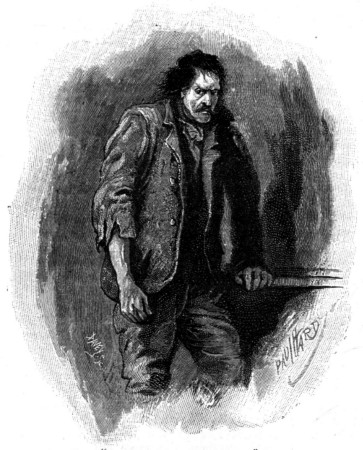 "HAGGARD AND HALF FAMISHED."
"HAGGARD AND HALF FAMISHED."
Barbara turned even paler than she had been as she listened to his words. "What is it you have done?" she asked.
"Oh, I've not killed anyone. Better for me if I had! One may shoot a man, but to take a horse is a hanging matter here."
"Tell me about it, Oliver," she said, preserving her self-possession, for she was no fragile flower to wilt and droop before the first breath of danger—no, nor the last.
"It's soon told," he answered. "I had bad luck—I was cleaned out, not a red cent in my pockets—and so I hired out to a farmer away in Pine Valley. We had words one day, and he refused to pay me my wages—so I took a horse out of his stables and rode off."
"It was madness, Oliver," she said; for she knew as well as he did that for the horse-stealer, in those parts and at that time, there was scant mercy and short shrift: it was danger to be accused, death to be detected.
"The horse was worth no more than my fair wages," he rejoined. "I was warned that they were after me, but I thought I'd got a good start of them. They were too sharp for me, though—they cut across by Devil's Ford, and were after me in full chase. They sent a hail of bullets after me; I sent all I had back—I winged one of them—I fancy he was the leader, and while they picked him up I got ahead; but, unluckily, before I was out of shot-range my horse was shot under me. I got clear of the saddle and bolted into the scrub. I gave them the slip for the time. I've been crawling like a dog through the chaparral—but you know as well as I do, those fellows are like blood-hounds on the scent. I was pretty nearly dead-beat when I caught sight of this place. I little thought it was you that I should find here."
"What is to be done?" she said, not helplessly wondering, but actively thinking. "First of all, you must eat and drink. Then—we must see what is the safest thing for you."
She set bread and meat and milk on the table; and Desmond fell to the simple meal as if half famished.
"My brother's horse is in the stable," said Barbara, thoughtfully. "He's fast, is old Sultan, and might take you safe—if we only knew from which quarter they'd be coming; and I'd take the risk with Tom."
"You must risk nothing for me," he rejoined. "I see, Barbara, you are what you always were—the salt of the earth! I deserve of you that you should shut your door on me now—that when they come this way after me you should send them on my trail. But—you won't do it?"
"No," she replied, slowly. "I will not do it."
He leant forward, resting his arm on the table, and looked at her. The oil-lamp that stood between them shed a circle of light in which he saw her face, unshrinking, steadfast, wrought up to high resolve.
"You were always too good for me, Barbara," he said. "Are you such an angel as to have forgiven me?"
"What has that to do with it?" she rejoined, coldly. "Enough that if I can help you now, I will."
She was looking at him as intently as he at her. She saw how changed was the[Pg 440] face of the idol of her girlhood—poor shattered idol with the feet of clay—base metal she had taken for pure gold! It was not only that he was older—he had aged more than she—but a subtler change had passed over him; he was hardened, embittered, coarsened, undefinably deteriorated. She saw the colour mount in his haggard cheek at her calm words.
"Coals of fire," he said, with a touch of bitter mockery that disguised pain. "Well, if it's a comfort to you to know it, Barbara, they burn."
"Which way are they most likely to come?" she asked, putting personal questions determinedly aside.
"They'd probably skirt the wood; but yet there's no knowing but what they might make their way down the gulch and round by the creek yonder."
"Whichever way you go," she said, in deep consideration, "you might run right into the jaws of danger. And if they found you with another horse, and that horse discovered not to be yours, it might be worse for you—if they refused to believe it had been freely lent to you."
"They'd not be likely to waste much time on inquiries," he observed, drily. "It's not their way to make allowance for priest or prayer. Perhaps I had better lie low for a time until the heat of the chase is over. Who is here with you, Barbara?"
"No one to-day. My brother and his wife are out until to-morrow."
"You are alone?" he said, with a softening of tender respect in his tone. "Forgive my intrusion. You must not risk the least trouble for me. I'll feel like a king after this rest and refreshment here, and be ready to go on my way."
They were still discussing the best course to be adopted when a faint sound in the distance struck on their ears—a sound so faint and far that, had it not been for the wonderful clearness and stillness of the dry, crisp, dewless air, it could not have reached them.
"Hark! What is that?" said Desmond, holding his breath.
"We can see the road better from the upstairs windows—come!" she exclaimed, springing to her feet. She hastily closed the outer door into the court-yard, which still stood open, and ran upstairs, followed by Desmond. From the highest window of the house—a sort of landing or look-out at the top of the stairs—they had a view of the windings of the white road between wood and hillside.
The night had fallen like a dark mantle over the land; but the sky was clear; the moon had risen; and in the dusk they could just distinguish the pale, dim line of the road between the shadows of the trees—could even discern upon it, though some distance off as yet, what looked at first like a dark, blurred, swift moving spot, then resolved itself into a group of mounted men riding straight for the Saucel Ranch.
"There they are," said Oliver Desmond in a low voice; but he was suddenly and strangely calm now the danger was at his door. "They're coming here. There's a handy tree I see over yonder, just outside your gates," he added, with the frequent tendency of men who are used to carry their lives in their hands to "jest upon the axe which kills them." Barbara clasped and wrung her hands.
"Too late to fly!" she said. "Before we could get Sultan out of the stable and saddle him they'll be here! There's no time for escape. You must hide!"
"If they've got dogs, I'm a dead man," he rejoined, staring at the fast nearing horsemen; "and I shall be dangling from that tree before an hour has passed!"
Barbara flew to the nearest door and opened it, then the next, and the next, glancing in wild and eager haste into each room to see in which any hiding-place might be found—although she knew too well the simple arrangements of the ranch offered no facilities for concealment. No secret chambers, no sliding panels, no dark recesses nor trap-doors in this plain wooden "frame" house. The outhouses? No, they would probably be the first places searched; the natural idea of the pursuers would be that he might have sought refuge there unknown to the inmates of the house. There were no cellars, no possible safe hiding-places on the lower floor; on the upper floor there were but three rooms—Mr. and Mrs. Thorne's room, Barbara's room, and the "guest-room." All were plainly furnished with bare necessaries: no "old oak chests," no tapestries nor hanging draperies, no curtained recesses, no place to hide a good-sized dog, much less a full-grown man. Barbara's was the only one of the bedrooms that could boast of a cupboard—a long, narrow cupboard which she used as a wardrobe, and kept her dresses there hung on pegs. This was the only place.
There was not a moment to lose in talk.[Pg 441] Barbara had hardly time to go downstairs, look round the kitchen, and assure herself that there were no traces of Desmond's presence to be detected there, when the trampling of horses sounded close at hand. She heard some of the party ride to the front, some to the back, and she knew they were surrounding the house, before there was a sharp, imperative knock on the front door. Barbara opened it. She stood there—a candle she had just lighted in her hand—a graceful, composed figure, with a placid, inquiring look.
The men who were gathered on the threshold looked somewhat taken aback by the appearance of a lady then and there.
"Excuse our intrusion, madam," said the foremost; "but we have called to inquire if there is anyone in this house but the members of your own family?"
"No one," she replied; and the feeble flicker of the candle showed the look of innocent, yet naturally somewhat anxious and surprised, inquiry on her serene, fair face.
"Has any stranger been here?"
"No."
"Miss Thorne," said another of the group—in whom she recognised a prominent citizen of Eden, with whom she had, however, but a very slight acquaintance, and who now came forward, doffing his hat with a deferential bow—"perhaps we had better speak to your brother."
"My brother is out. I represent the family at present, and can answer any question you may wish to ask. I presume, gentlemen, you come on business?"
"On business, lady, with which we would not trouble you, if it were not that we must ascertain whether the person of whom we are in search is here. We have ordered a search of the outhouses, where a tramp might take shelter. Meanwhile, with your permission, we will look over the house. A man might enter by one of the upper windows without your suspecting it."
"Indeed, I trust not," said Barbara.
"We have reason to believe that the man we want came this way, and he would be likely to try to gain entrance and get refuge here."
"I hope he will not. But you are most welcome to look round."
Barbara, gracious and self-possessed, accompanied them, in hostess-wise, from room to room on the ground floor. The kitchen looked cheerful with the lighted lamp and stove, the kettle singing merrily on the fire; one cup, saucer, and plate were set out upon the table, with a cake. Evidently Miss Thorne had been busy preparing her modest tea when their arrival interrupted her. The whole party were crossing the hall to the parlour when they heard the clatter of galloping horses' hoofs, and two horsemen dashed into the court-yard, hastily dismounted, and entered the house. And one of these was no other than Colonel Jeff! He and his companion were evidently expected by the "Vigilance" party, who received them quietly, as a matter of course, and indeed an awaited addition to their ranks, one of the men from Eden City observing as he nodded a greeting, "Guessed you wouldn't keep us waiting long."
The Colonel looked at Barbara; she paled a little as she met his gaze, albeit there was no shadow of suspicion in it, only a tender and respectful solicitude lest she should be alarmed or agitated by this invasion. But she compelled herself to return his look calmly and gently, and he was reassured by her tranquillity.
"Any traces?" he demanded, turning to the one who was apparently the leader of the committee.
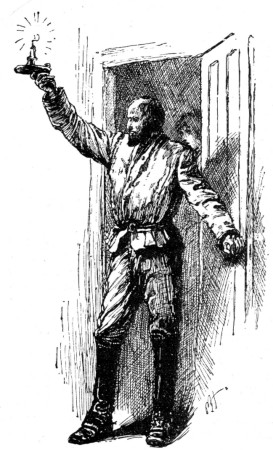 "'ALLOW ME,' SAID COLONEL JEFF."
"'ALLOW ME,' SAID COLONEL JEFF."
"Not yet. We're going through the house."
"Upstairs?" added Colonel Jeff, inquiringly, briefly glancing at Barbara, and indicating the staircase at the end of the long hall.
"Are merely three sleeping-rooms," she replied—"my brother's, my own, and our guest-room."
"I perceive that anyone might gain access to your upper rooms by the roof of the lean-to or by the balcony," observed the leader. "By your leave, madam, we will go up and look round. It will be to your advantage also to be assured that there is no one lurking about."
Barbara's heart sank, but she saw it would be fatal to offer any objection. "Certainly," she said, and led the way towards the staircase. The gentleman from Eden City, to whom all the Thornes were known, although not intimately, here put in a suggestion that perhaps it would be more agreeable to the lady's feelings if they were to depute one, or say two gentlemen, to accompany her upstairs. The suggestion was accepted; two searchers were by unanimous vote regarded as sufficient; and Colonel Jeff and his friend were deputed to go up with Miss Thorne and examine the bedrooms.
Barbara was cold and sick with terror, but she kept her self-possession, and tried to cling to one frail straw of hope—that they might by some providential chance overlook the door of the cupboard (which was papered like the walls of the room) and pass it by. She trembled lest Oliver, hearing the tramp of his enemies' steps approaching, should attempt to make his escape by the windows, in which case he would fall straight into the hands of the detachment who were surrounding the house and searching the grounds. Yet—if they should detect and open the cupboard, and she should see him caught like a rat in a trap, dragged out to his death! There was no time for thought; the moment was imminent; in another minute the die of Oliver Desmond's fate would be cast for life or death. Yet a moment to breathe was hers. She turned to Mr. Thorne's room first.
"Allow me," said Colonel Jeff, taking the candle from her hand as she threw open the door and drew back. He stepped in past her and held up the light. His eagle eye swept the room—searched every corner; he saw there was no hiding-place there. His comrade stood back respectfully on the threshold, apparently considerate of the lady's feelings, deeming it sufficient for one to enter the room, and regarding Colonel Jeff as competent to conduct the search alone.
They came next to the spare-room, and again the Colonel was the one to enter and look carefully round. Was it not partly in his liege lady's own interests, and for her sake, he was assuring himself that no dangerous intruder lurked in her home and she might sleep in peace?
Then was the turn of Barbara's own room—the sacred temple that enshrined his treasure!
This time he had kept the candle in his hand. Barbara had made no offer to take it back; she feared the trembling of her hand might betray her. Wrought up to a pitch of suspense at which every nerve quivered like a tense chord, she yet by a desperate effort controlled her features and steadied her step, but she felt she could not keep her fingers from trembling. Colonel Jeff's comrade remained as before, standing in the open doorway, while the Colonel, accompanied by Barbara, stepped into the room.
As he strode forward she kept near him; it seemed that she could not let him move an arm's length from her. It took all her self-command to refrain from flinging herself between him and the cupboard door. Wild thoughts of appealing to his mercy shot like lightning through her brain. If only his comrade on the threshold had not been there watching! With that man looking on, the frail, frail hope would be lost if she betrayed any sign of fear or agitation.
Colonel Jeff stood casting his keen glance, around. Barbara stood like a statue, all her life in her strained eyes, as she followed his glance.
Colonel Jeff's eye fell on the cupboard door. He moved towards it. As he did so, he chanced to turn his look on Barbara's face and met her eyes. A swift and sudden change passed for a moment over his own rough-hewn features; his dark eyes blazed upon her with an instant's startled, piercing scrutiny; he set his hand on the cupboard door. And still Barbara stood paralyzed, rooted to the ground as if the unveiled horror of the Gorgon's stare had struck her to stone.
Her lips moved, but no sound came from them. In the whirl of thought that dazed her she remembered that she did not know, she had never asked, if Desmond was armed! A desperate man turns at bay, and sells his life dearly. What if Oliver had a knife or pistol clutched now, this moment, in his hand?[Pg 443] What if he shot or stabbed Rick Jeffreys before the Colonel could draw his own weapon? There would be a moment's horror—and Rick, her own true, loyal lover, stricken down at her feet, and Oliver, whom she once had loved—was it a century ago?—dragged out and murdered before her eyes!
She felt the springs of life stop at her heart as Rick Jeffreys opened the cupboard door. He raised the flickering candle. For one terrible moment, in which Barbara tasted the bitterness of death, he stood looking in.
Then he deliberately drew back, closed the door, turned and crossed the room to his waiting comrade on the threshold. He did not cast even an instant's glance at Barbara as he passed her.
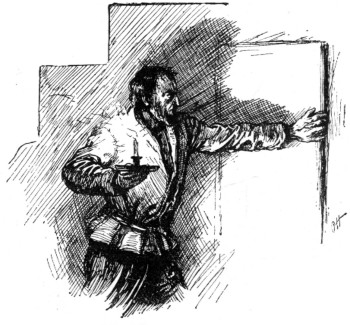 "RICK JEFFREYS OPENED THE CUPBOARD DOOR."
"RICK JEFFREYS OPENED THE CUPBOARD DOOR."
"Is there any loft?" he demanded, in his usual deep, harsh tone, looking around the passage as if to complete the search.
Barbara heard a voice, that seemed to her not her own, issue from her parted lips, saying, "No, there is no loft."
They saw there was not, and proceeded downstairs. She followed them with trembling limbs. She was almost fainting, but followed because she dared not stay behind. The ominous silence in which Rick Jeffreys had passed her seemed fraught with something worse than even the horror she had dreaded.
The Vigilance Committee did not waste their time, but being assured that the fugitive they sought was not lurking in or about the ranch, they promptly went on their way—the leader, before they departed, however, pausing to express his regret for any inconvenience they might have occasioned the lady by their unexpected inroad.
Colonel Jeff was the last to speak.
"I will make my apologies later," he said, as he took his leave. Barbara caught the sinister gleam of his eye as he spoke, and she knew that "later" time would be soon.
Barely an hour had passed since the tramp of the horses of the departing Vigilantes had died away into the silence of the windless night, when another knock summoned Barbara to the front door.
"I knew you would come back," she said, as the big, powerful form of Colonel Jeff towered upon the threshold, tall and dark against the background of the darkness.
"You knew me well enough for that?" he rejoined, grimly.
She closed the door, and turned towards the parlour.
"In here," she said, quietly.
He looked at her with a kind of fierce astonishment. Into his dark eyes, that seemed to burn black with smouldering fury, there leapt a flash of reluctant admiration, that shook and thrilled him with a passion more of bitter wrath than of love. Instead of being crushed with shame and humiliation, drooping in fear and beseeching, this woman faced him like a queen.
"It is not with you that I have come to speak," he said, his deep voice a trifle huskier than usual. "I have saved you from open shame and public scandal. That's enough between you and me. I've nothing more to do with you, but I've an account to settle with your lover. I deal with him first, and alone. Where is he?"
"Wait," she said, as he made a movement to turn to the door. "He is no lover of mine."
"You will tell me, I suppose," he retorted, "that he was hidden there"—he ground his teeth upon the word as if he would crush it—"without your knowledge and consent?"
"I shall not tell you that."
"No, you dare not. I saw your face. I read it in your eyes before I opened that door. You dare not tell me you did not know of his presence?"
"No, I dare tell you the truth—that I did!" she replied, meeting the fiery glance of his sombre eyes fearlessly. In the midst of his concentrated rage—and Colonel Jeff in wrath was well known to be dangerous—he could not help admiring this frail, fair,[Pg 444] delicate woman's dauntless courage. "I had no chance of speaking to you alone," she continued, "or I would have told you—explained to you——"
"I want no explanation," he said, harshly, bitterly; "I know enough."
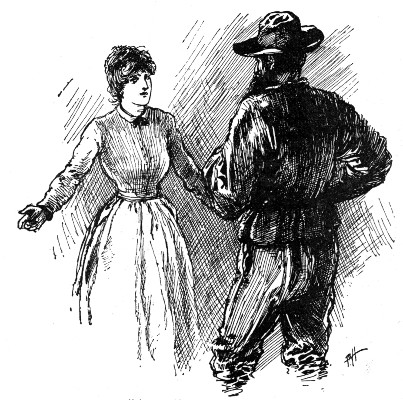 "'STAY!' SHE EXCLAIMED."
"'STAY!' SHE EXCLAIMED."
"Stay!" she exclaimed, lifting her fair head with a royal gesture. "That man, the man whom I helped to a hiding-place to save his life—for you know they would have killed him, they came here for his death——"
"And if they did," he interposed, "what is his life or death to you?"
"That man," she continued, waving his interruption aside, "did me a cruel wrong—you know it well. He killed my love for him. Love once dead rises no more. I have no grain of love left for the man who insulted, wronged, deserted me. But I tell you now that he wronged me less than you do if you say to me that you 'know enough!' You do not know enough. You must know all. Rick, you have said you loved me. You have made me love you. You shall hear me now!" She spoke not pleadingly, but with passionate resolution.
"What have you to say?" he rejoined, sternly still, but less bitterly.
"That if you love me you must trust me! If you love me you must respect me! The woman who could turn a helpless, hunted fugitive—even a stranger—from her doors would be unworthy of love or respect."
"This man was no stranger!"
"He came to me as one, not dreaming that I lived here. Would you ask me, because he was not a stranger, to revenge myself for a wrong of years ago by refusing to him the help I would have given to any stranger? You could not think that I would stoop to so base a revenge as to hand him over to death when I would have given up no other man who stood in his place? I would not turn a dog away that came to me for help and shelter. He came here, not knowing whose house this was—came to ask for food and help because he was exhausted, famishing. It was as much a surprise to him to find me here as it was to me to see who the man was who asked me for shelter. And I promised it to him, and I kept my word. He told me what he had done, and that the Vigilance Committee were on his track. I've lived here long enough to know what that means! I would not see the man who appealed to me to save him lawlessly murdered. He has done wrong; he deserves punishment; but he does not deserve the fate they would have dealt to him."
"They'd have strung him up on that big tree outside your gate," said Colonel Jeff, grim still, but relenting, "and serve him right!"
"I did not think he deserved death," rejoined Barbara, firmly; "I risked—more than my life"—her voice quivered for the first time—"to save him."
"You did," he said; "you risked having your good name dragged in the gutter, for the sake of that worthless scamp."
"I risked more than that," she returned in a lower tone.
"More than that?" He shot a keen, questioning glance at her from under his dark, heavy brows.
"Yes—I risked—and have I lost?—your faith?"
He paused a moment before he answered: "Barbara, when a man loves as I do, he loves to the end of life—and after!"
A light kindled in her steadfast, questioning eyes.
"Then I have not lost your love, Rick?"
"I love you always."
"But—your faith?" she urged. "One is worthless to me without the other."
"Do you say that my love is worthless, Barbara?"
"If it is given without your trust, it is the[Pg 445] setting without the jewel. Trust me, Rick—or, leave me!"
"I trust you, my love," he replied, catching her hands and holding them fast and close in his strong clasp. "Who could look in those eyes of yours and doubt that you're true and pure as truth itself? But, my darling, you've been foolish—with a woman's noble folly! Rash and reckless—with an angel's courage! You have ventured too much—in such a cause. These matters are not for women. Our Vigilante justice may be rough and ready, but it fits the time and place. Anyhow, we keep the neighbourhood so that the worst class of characters give it a wide berth. You should not have crossed its path, my Barbara. It was not safe for you; and for all that you have hazarded, he is not safe; they'll get him yet."
"No, they will not; you will not betray him?"
"No. To betray him would be betraying you! Not for his sake, but for yours, I'll hold my tongue. But what will he do? He cannot stay here."
"He need not. He can have my brother's horse, my brother's overcoat and hat. He can take the trail up the gully under cover of the night, or with the first streak of dawn."
"But your brother? Tom Thorne's a pretty hard citizen; what will he say?"
"I don't know. And, Rick, I don't care! I've taken this on myself, and I'll see it through. I know Tom may be hard—and Hatty, too. The worst they can do is to turn me out of the house. And if they do——"
"You'll come to mine! Be mistress of all I have—queen of my home—my wife!"
As the first pale pearly streak of dawn was stealing over the snow-capped peaks of the Sierras, Oliver Desmond bowed his head—as he had never bent it to mortal man—before the woman who had risked so much for his safety, and raised her hand to his lips, as if it were the hand of a shrined saint. And Colonel Jeff stood by, grim and silent. For good or ill, Rick Jeffreys was thorough. He had promised, and he would keep his word.
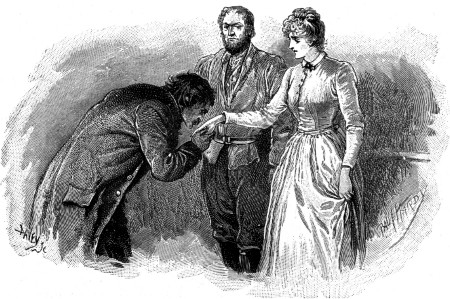 "HE RAISED HER HAND TO HIS LIPS."
"HE RAISED HER HAND TO HIS LIPS."
"You are the best and bravest of women," Desmond said. "Forget that I have ever crossed your path. I shall cross it no more. But I shall never forget."
Barbara is Colonel Jeff's happy and idolized wife to-day; and between her and her husband there is no forbidden subject—not even that of Oliver Desmond. For the faith between them is perfect; Rick knows that whoever may have ruled her yesterdays—he and he only holds Barbara's heart to-day, and the shadow of Oliver Desmond has passed from off her life for ever. It was long after that eventful night that they heard how his ill-starred career had come to an untimely close; but his last words to Barbara were true; he crossed her path no more—and I for my part think that he never forgot.[Pg 446]
The following is a narrative of an escape from peril, and the rescue of five lives by individual gallantry, rarely equalled, and never exceeded, in the records of high and noble daring. It is from the pen of Captain Bryan Milman (now General Milman), of the 5th Fusiliers, in a letter addressed to his father, Major-General Milman, late of the Coldstream Guards:
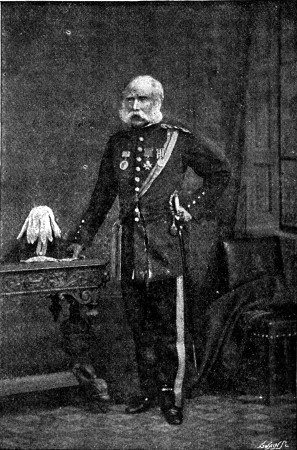 GENERAL BRYAN MILMAN.
GENERAL BRYAN MILMAN."Mahebourg, Island of Mauritius,
"June 30, 1848.
"The following account of an almost miraculous escape that I and five other officers have had from drowning will interest you all, I have no doubt. The names of the others are Colquitt, Bellew, Fitzgerald, Home (all of the 5th Fusiliers), and Palmer, a commissariat officer, in whose boat we were at the time of the accident. Colquitt and Fitzgerald are in the first battalion, and had come down here to stay with me and Bellew. On the 25th we made a boating party, for them to visit one of our detachments about fifteen miles from hence, at Grand River, south-east. We left this about eleven a.m., and after reaching our destination all safe, left it about three o'clock p.m. for home, the weather then looking anything but promising. When about four miles from home and from the shore, we were overset by a squall. It came upon us so suddenly that we had no time to do anything; torrents of rain fell at the same time, and there we were, drifting along on the side of the boat (which luckily did not sink) without a chance of assistance, and the night setting in. This happened about half-past five o'clock, and at this season it is dark at six. We drifted in this way for about two hours, and at last grounded in about seven feet of water. It was very nearly dark, and all that we could see were the tops of the mountains in the horizon. We supposed we were about two miles from shore. All of us but myself had stripped on being upset, as I knew, if we came to a swim, that I could take my clothes off in a moment. As it turned out, I think I was lucky in this, for they perhaps, though wet, kept me a little warmer than my companions. Nothing seemed to give us a chance of being saved, except holding on till daylight, and as it was terribly cold, this seemed next to impossible. At last it struck me I might be able to swim ashore to procure assistance, and I got permission from the others to do so. Our boatman, a Creole, who also said he would go, started with me to make the attempt. I left them with a hearty 'God bless you!' from all. After swimming some time, I lost sight of the boatman, and was left to myself. I swam back a little, shouting as loud as I could; but getting no answer, and feeling for my own sake that I must push on, I turned my head towards the mountain tops (my only guides), and struck out my best. I must have been[Pg 447] swimming for more than an hour when I landed. I found myself a little tired, and very much benumbed, barefooted, en chemise, and not able to see ten yards before me, it was so dark. My first impulse was to fall on my knees and thank Providence; after which, curious to say, my military schooling came to my aid in the 'extension motions,' which brought some little feeling into my limbs, and enabled me to continue my work. After feeling my way for about half an hour along the shore, shouting all the time, I came to a cottage, where I was hospitably received. They told me that they had heard my cries some time, but fancied I was some drunken man returning home, or else they would have come out to my assistance. The poor black gave me some dry clothes, and made me a cup of tea, and then conducted me to the proprietor of the estate, who lived close by, and had the nearest pirogue (a small boat like a canoe, dug out of a solid trunk of a large tree) in the neighbourhood. M. Chiron, the name of the proprietor, a man of colour, as soon as I explained my situation and my want of a boat to go and assist the others, immediately offered to go himself, and his son also insisted on going with him. I jumped at the offer, of course, and we immediately walked down to where his pirogue was moored, and started, myself at the bottom to serve as guide. By the blessing of Providence, after about an hour's search, we heard the cries from the wreck. I think I never felt so happy or so light-hearted in my life as I did at this moment; for there were so many chances against us finding it. We could not see many yards from our own boat. It was then about eleven o'clock, so that my companions had been exposed on the boat for upwards of five hours. Luckily, with great care, we got them safely into the pirogue, without capsizing her; and by twelve o'clock we were safely housed under M. Chiron's hospitable roof, who fed, clothed, and lodged us for the night. In the morning, the unfortunate Creole boatman was found dead, from cold and cramp, about half a mile from the place he was supposed to have landed at. The kindness, hospitality, and truly courageous assistance afforded us by M. Chiron, at the risk of his own life and that of his son, are deserving of all praise. It was a service of danger to go out even at all in a pirogue on such a rough night: much more to go and seek for five drowning men three miles at sea. He wished his son not to go; but the latter would not allow his father to go without him. Constantly during our long search, when the son was getting tired of pulling the boat, the father would cry out and encourage him, saying 'Courage, mon fils.'
(Signed) "Bryan Milman,
"Capt. 5th Fusiliers."
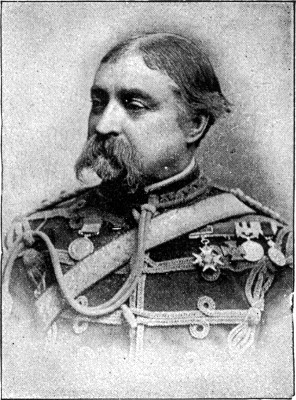 GENERAL FRASER.
GENERAL FRASER."The Army List makes no allusion to the gallant way in which Major Charles Craufurd Fraser, of the 7th Hussars, won the Victoria Cross—that coveted and hardly-won decoration which, to the honour of England, graces not a few of the breasts of humble privates as well as generals. The London Gazette, however, tells us that the Victoria Cross was awarded to Charles Craufurd Fraser 'for conspicuous and cool gallantry on the 31st December, 1858, in having volunteered, at great personal risk, and under a sharp fire of musketry, to swim to the rescue of Captain Stisted and some men of the 7th Hussars, who were in imminent danger of being drowned in the River Raptee, while in pursuit of the rebels. Major Fraser succeeded in this gallant service, although at the time partially disabled, not having recovered from a severe wound received while leading a squadron in a charge against some fanatics in the action of Nawabgunge on the 13th of June, 1858.'"
"Lord Charles Beresford, R.N., on September 18th, 1883, at Liverpool, saved Mr. Richardson, who accidentally fell into the Mersey. Lord Charles jumped overboard and supported[Pg 448] him in the water until assistance came. It may be mentioned that a strong tide was running at the time. Lord Charles is also the holder of the Bronze Clasp, for saving, in conjunction with John Harry, ship's corporal of H.M.S. Galatea, a marine named W. James, at Port Stanley, Falkland Islands, October 6th, 1868. Lord Charles jumped overboard with heavy shooting clothes and pockets filled with gun and cartridges. Harry assisted Lord Charles to support the man until a boat arrived."
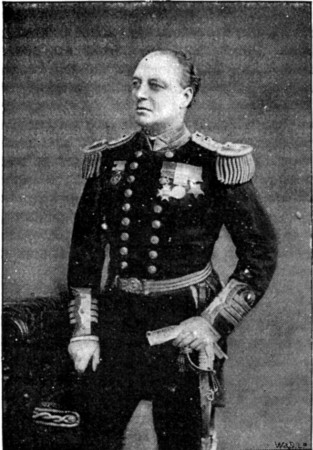 LORD CHARLES BERESFORD.
LORD CHARLES BERESFORD.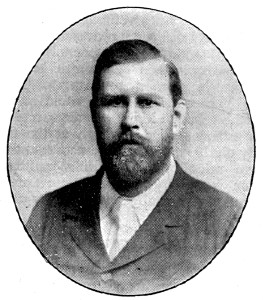 MR. BRAM STOKER.
From a Photo. by Walery.
MR. BRAM STOKER.
From a Photo. by Walery.
"On September 14th, 1882, a man jumped overboard from a steamboat, and after being seized hold of by Mr. Stoker he persistently kept his face under water. Mr. Stoker then divested himself of some of his clothing and jumped in after him, and sustained the man until a boat came to them. The man was insensible. Mr. Stoker, a surgeon, brother to Mr. Bram Stoker, did his utmost to try and restore the man, but unfortunately failed."
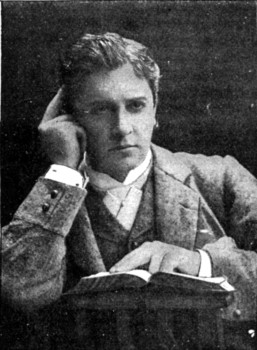 MR. WILLIAM TERRISS.
MR. WILLIAM TERRISS."On August 16th, 1885, Mr. William Terriss saved a boy off the North Foreland, off Deal. Three lads were bathing near the shore, and one of them was seized with cramp. Mr. Terriss jumped overboard from a boat, with all his clothes on, and saved the boy. He was presented with the Royal Humane Society's Medal by H. Irving, Esq., in the presence of the whole of the Lyceum employees."
"On the afternoon of Wednesday, August 19th, 1891, Miss Mary Collier, daughter of Mr. Simon Collier, shoe manufacturer, of Northampton, was out bathing with her sister and some friends. The party had been amusing themselves with a life-buoy, and one of them called attention to the distance two children, aged respectively eleven and fifteen, were out. Miss Collier exclaimed: 'Why, they are drowning,' and at once took[Pg 449] the buoy and went out to them. She succeeded in reaching them just as they were going down for the third time, locked in each other's arms. They seized hold of the buoy, and Miss Collier attempted to swim back to the shore; but the tide was going out, and the current too strong, and they were observed to be drifting farther away. At length the cries of her companions reached the ears of those on the beach, and the machine attendant on horseback dashed off to the rescue. After swimming his horse a considerable distance he reached the scene of danger. Miss Collier at once seized on a chain attached to the collar, and the horse's head being with difficulty set towards the shore, the whole party were dragged through the water, the two children holding on to the buoy, through which Miss Collier had thrust her spare arm. After going some distance, the rider called to them that his horse's feet touched the bottom, and soon they were dragged ashore, amid intense excitement among the large crowd who had assembled and witnessed the rescue. A sum of money was collected on the spot to reward the plucky rider for his conduct, and we are glad to say Miss Collier was none the worse for the excitement and exertion."
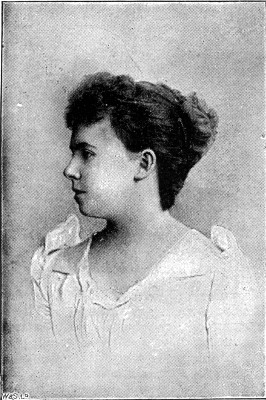 MISS MARY COLLIER.
MISS MARY COLLIER.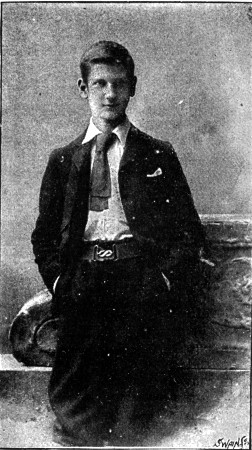 JAMES WILLOUGHBY JARDINE.
JAMES WILLOUGHBY JARDINE."A boy, R. H. Anderson, ten years of age, was trying to swim, but the current took him out of his depth, when he lost presence of mind and began to sink. Jardine pluckily swam to the drowning boy, reached him and held him up as best he could, but the current carried them towards the opposite point, and finally a boat picked them up."
"Albert Ernest Deacon, of 25, Canterbury Road, a youth only fourteen years of age, gallantly rescued two other boys from drowning on Thursday, July 16th, 1891. It appears that on the day named Deacon and some of his companions had been bathing, and had just come ashore and commenced to dress, when their attention was called to two boys struggling in the water. The other boys on the beach, regarding him as the best swimmer, shouted out, 'Go for them.' He immediately divested himself of the only garment he had on, and, plunging into the water, succeeded in bringing Walter Marsh within reach of Albert Nicholls, who was walking out waist-deep to meet him. He then at once swam off to the rescue of the other[Pg 450] boy, George Hook, who had sunk twice, and brought him ashore also. Both boys were greatly exhausted, more especially Hook, and fears were at first entertained for his recovery. However, Dr. Wheeler, who was sent for and promptly attended, put into exercise the remedies usual in such cases, which happily had the desired effect. The conduct of Albert Ernest Deacon in such an emergency was highly praiseworthy. Bronze Medal awarded to Deacon; Vellum Testimonial to Nicholls."
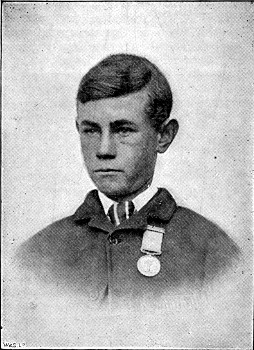 ALBERT ERNEST DEACON.
ALBERT ERNEST DEACON.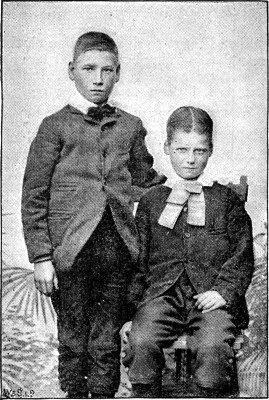 WALTER MARSH AND GEORGE HOOK, SAVED BY A. E. DEACON.
WALTER MARSH AND GEORGE HOOK, SAVED BY A. E. DEACON.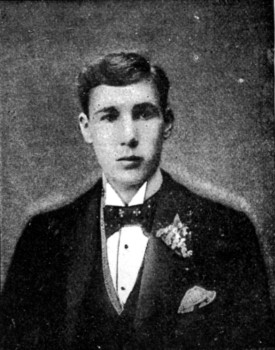 SYDNEY GRAVES.
SYDNEY GRAVES."Mr. Sydney Graves is the grandson of the late Henry Graves, the famous art publisher, of Pall Mall. It was whilst at Ventnor on August 28th, 1888, that he distinguished himself and made good his claim to the Bronze Medal of the Royal Humane Society by rendering material assistance, with others, in saving life at sea. He was bathing and had returned to his machine. The sea was very rough. An exclamation from a little boy on the shore told him that somebody was drowning. He saw two men about fifty yards away struggling in the water, and he at once swam out, carrying with him a rope which was thrown to him. The rope he gave to one of the men—a boatman; the other swimmer was already under water. Mr. Graves got him up and helped both men ashore. The Medal was presented at the annual festival of the Otter Swimming Club, of which—at that time—Mr. Graves was the youngest member. He was under fifteen years of age when he won the Medal."
"On Tuesday, the 14th July, 1891, some boys were bathing in a place called the 'Salts' on the 'Brook,' Snodland, Kent, when William[Pg 451] Hodges, aged eleven years, got out of his depth. It being evident that the boy was drowning, one of the party ran for assistance, and fortunately soon met Charles Wickenden, a lad ten years of age. Wickenden, without the slightest hesitation, plunged into the water, and after a severe struggle, during which he was pulled under twice, succeeded in bringing the unfortunate boy to land. He was unconscious, but the other boys held him head downwards to get rid of the water and rubbed him, and fortunately succeeded in bringing him back to consciousness again. He was afterwards taken to Dr. Palmer, who gave it as his opinion that the boy had had a narrow escape. The conduct of Wickenden, who bravely, at great peril to himself, attempted successfully to save the life of a playmate, cannot be too highly commended."
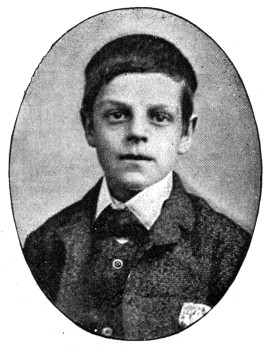 WILLIAM HODGES.
WILLIAM HODGES.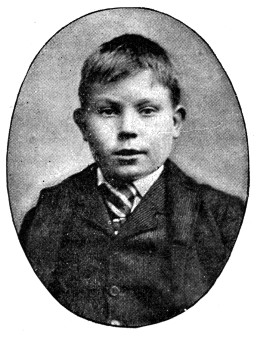 CHARLES WICKENDEN.
CHARLES WICKENDEN.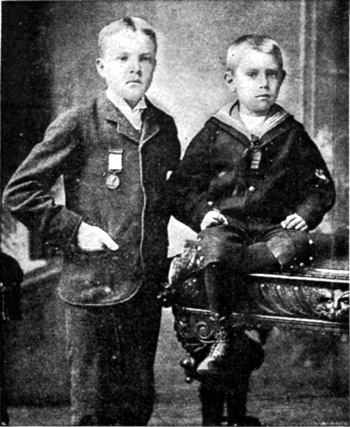 HARRY FOOTE AND W. SAXON.
HARRY FOOTE AND W. SAXON."Harry Foote, a schoolboy, aged thirteen, saved W. Saxon, five years old, on August 10th, 1891. The boy fell off the quay whilst playing. Harry Foote ran to the place and jumped off the quay with all his clothes on, and succeeded in bringing him to a landing place, a distance of twelve yards. There were ten feet of water and the tide was running swiftly."
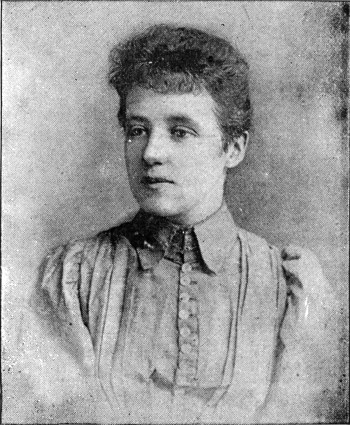 MISS ANNIE E. MACAULAY.
MISS ANNIE E. MACAULAY."John Martin, a child five years of age, was bathing with other boys much older than[Pg 452] himself, when he was carried out of his depth and they could render him no assistance. Miss Macaulay went to the rescue and, with some difficulty, got the boy safely out. She received the Vellum Testimonial from the Society."
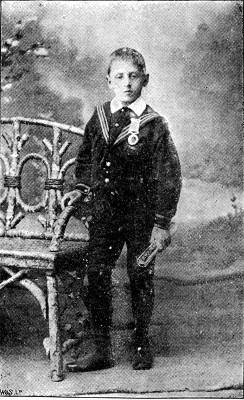 FRANK LINES.
FRANK LINES."Frank Lines, a little boy aged eight, saved James Cochrane on the 28th December, 1891, in Broadwater, Brocket Park, Hatfield. Cochrane ran after a ball on the ice, and when forty-five yards from the bank the ice broke. He managed, however, to cling to the edge for some time. The other boys who were present ran away, but Frank Lines crawled to the hole, and with the aid of a stick got Cochrane out. The ice again gave way and Cochrane fell in once more; but still his little rescuer made another attempt, and finally saved him."
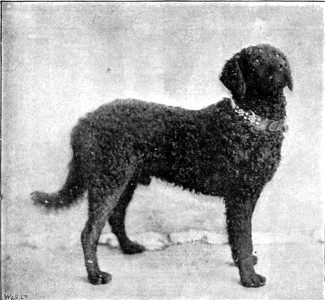 "PRINCE."
"PRINCE.""Dear Sir,—I enclose, with pleasure, the photo. of my dog 'Prince.' I need hardly say how proud I feel to think that it will be inserted in the well-known Strand Magazine. I am sorry that I could not send it before; but, as I had to have his photo. taken, I have been forced to wait. 'Prince' is a thoroughbred (absolutely pure) black retriever, and is nearly three years old. His photo. is taken in the act of 'Toeing the line,' a trick that I have taught him. He retrieves perfectly, and is a remarkably rapid swimmer. Three weeks ago he jumped from a height of 30 ft., with 14 ft. to clear, into one of the dry docks, which had about 6 ft. to 8 ft. of water in it. In saving the lives of the men he was of great assistance to me by diving under the water and lifting the feet of the second officer out of the quicksand. Throughout the whole affair he displayed great intelligence. I forgot to mention that the collar he is wearing was presented by the brother of the captain who, unfortunately, was drowned; and on the plate are engraved these words: 'Presented to "Prince" for his gallant behaviour, October 22nd, 1892, by J. J. W.'
"Yours truly, "Frank David Pengelly."
"Hassan," I said to our guide as he rested before us in the shade of the tent, "what was it those coolies lying under the trees yonder told you about Formosa?"
"The sahib shall hear," replied the Arab. "They wish to persuade the Englishmen to hire their junk to visit the island, for they learnt from me that we have met with many strange experiences during our wanderings. They declare that what may be seen in one part of it is almost beyond belief."
"Never mind what they say," I expostulated, "go on and tell us about the island. There ought to be some story concerning it to interest us, considering that the Spaniards, the Dutch, and the Chinese have all possessed it in turn. It is quite notorious for the shipwrecks on its coast, not to mention the pirates who have held it at different times, and the savage tribes said to inhabit its wildest parts."
"Ye shall hear the story, strange indeed as it is," responded the Arab; "and, besides, it partly concerns a Feringhee sailor."
"Well, go on with your yarn, Hassan," said Denviers. "What a nigger you are for trying to excite our interest before you really tell us anything."
"The sahib does not give his slave a chance to continue, but makes always a most indifferent listener," replied the Arab gravely; "and yet the great Mahomet has said that he who is impatient——"
"The story!" I interposed. "Go on, Hassan, you can tell us about Mahomet some other day." Thus abjured, the Arab, after being silent for a few minutes, related to us the strange events which followed the quest of the lost galleon.
Soon after our adventure with the Hunted Tribe of Three Hundred Peaks we left Siam, and sailing through the China Sea made for Hong Kong. Thence we set out to traverse a part of the coast of China, and at this time our tent was pitched not far from Swatow. There Hassan held a conversation with some coolies, when, from the various excited exclamations and gestures both of them and the Arab, my interest was roused sufficiently to question our guide, as narrated. As it afterwards transpired, the coolies had moved away a little only to await our decision, and were resting patiently meanwhile under the shade of a huge umbrella in addition to that afforded by the pine clump.
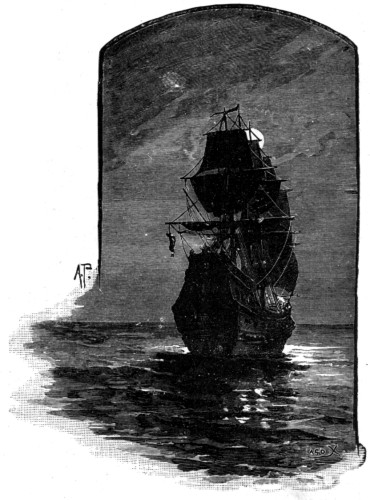 "THE SPANISH GALLEON."
"THE SPANISH GALLEON."
"Many years ago," began Hassan, "when the far-off people of Spain ruled a great[Pg 454] continent, a galleon laden heavily with treasure wrung from the natives set out to return with its great store under the command of Don Luego, a grandee, whose name was a terror to all those who came under the Spaniard's sway. The riches which the vessel carried were almost incredible, yet Don Luego had no word of praise or thanks for the sailors who toiled to convey it home across the stormy seas.
"More than one brave sailor was hung at the yard-arm for venturing to utter incautious expressions against the Spaniard's despotic rule, but at last some of the crew grew strangely silent, and took to watching Luego and conspiring together under the hatches. Among these men was one who had been put in chains several times, and whom the constant fear of death nerved on to lead his disaffected comrades against the commander.
"One morning all hands were piped on deck to witness the execution of a seaman, and José, the leader of the discontented part of the crew, was told off to assist. With a stern-set countenance he stepped forward, pulled the rope from his comrade's neck, and struck the fell Spaniard full in the face with it.
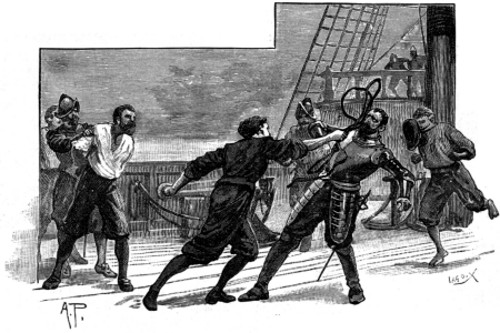 "MUTINY!"
"MUTINY!"
"'Mutiny!' gasped the astonished Don Luego; then, turning to the other seamen, he cried, 'Seize him and swing the two together from the yard-arm!'
"A number of the sailors ran forward, eager to gain favour with their commander by obeying his orders, while the rest hurriedly gathered round the doomed men, and, drawing their keen knives, prepared to defend them. Don Luego unsheathed his sword and rushed forward with a fierce cry, while the mutineers fought hand-to-hand with the other seamen. It was a desperate fray, for the men who had revolted knew their fate if once they became overpowered. On the mutineers pressed over the slippery decks, until at last their disheartened opponents ceased fighting and surrendered.
"Deserted by his men, Don Luego stood alone with his blood-red sword still gripped in his hand, for he expected no mercy from the sailors whom he had driven into rebellion. The chief mutineers gathered in a group and eagerly discussed the fate to be awarded to their defeated commander. Most of them were in favour of putting him to death in the same manner in which he had doomed his seamen; but José, who now headed them, proposed another plan, which eventually was agreed upon. A quantity of provisions and water were got ready, and then Don Luego was seized and disarmed in spite of his struggles. The seamen lowered him in a boat over the side of the galleon, and then, cutting the ropes, cast the fierce commander adrift at the mercy of wind and wave. They watched him as the boat was seen to rise at times on the crest of a huge wave, and saw that he shook at them threateningly his disarmed hand. At last they lost sight of him, and gathered together once more to consider their own plans and what to do with the treasure of the galleon.
"José, who seemed to be above the lust for gold which sprang up in the hearts of the[Pg 455] other sailors, assumed the command, and bade the men prepare to return to Spain. He thought it best to throw himself and his crew on the mercy of the King, and, delivering up the treasure, to tell of the cruelties of Don Luego. With some reluctance the seamen agreed, and so they took their course homeward. Three days afterwards a sailor on the look-out descried several Spanish caracks to leeward, to which they signalled, and having joined company sailed on together. All the vessels carried bombards and cannons, yet within a week the whole of them, save one, had struck their colours, and nailed to the mast of each was the flag of the capturing enemy, who belonged to the sahibs' nation. The single vessel not taken was the galleon which José commanded, and after it, as it fled through the waves with every stitch of canvas spread, went one of the Feringhee ships.
"It was a long stern chase, for the enemy was determined to capture the galleon, yet so well were the vessels matched in speed that they swept on without any perceptible difference being made in the distance which separated them. Through all their course nothing seemed to hinder the relentless pursuit of the treasure-ship. Many times José cried out to his men to turn the vessel about to grapple with the other for the mastery, but they would not obey, for the Spaniards knew too well how the Feringhees could fight. A violent storm came on in which both ships were partly disabled, but still they went on as best they could before a driving wind, until they were carried from west to east and then driven north into a sea which none of them had seen before.
"Then the Spanish galleon began to slacken and the English ship to draw nearer and nearer by degrees, until one stormy evening the towering crests of the volcanic range which runs through Formosa were visible, although the sailors knew not what the land was named. José called upon his men to run the vessel towards it, and as the pursuers drew still closer in the gloom he determined to be revenged, even at the cost of every Spaniard's life, for the dogged way in which the enemy had hunted him down. He chose, as well as he could distinguish it, that part of the coast which seemed the most rock-bound, and then, slackening his vessel's speed, lured on the other for a time, then suddenly sped ahead as though making for a known harbour. Deceived by this, the ship which chased him followed on, and before even José himself was aware of the outlying reefs of coral, they struck almost together. The next minute Spaniard and Feringhee were struggling for their lives, while tremendous seas were sweeping over the two ill-fated vessels.
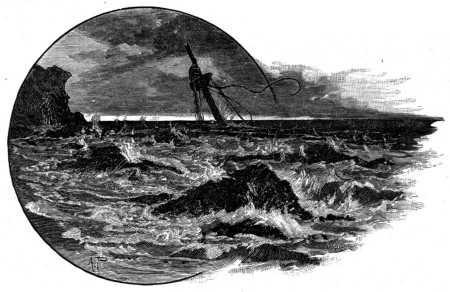 "ONLY A SOLITARY SAILOR WAS LEFT."
"ONLY A SOLITARY SAILOR WAS LEFT."
"The English ship went down, leaving only part of her mast to be seen, to which for a time a few seamen clung until one by one the waves swept them off, and out of the entire crew only a solitary sailor was left there. The Spanish galleon struck nearer to the coast, and at low water its hull could long afterwards be seen, but not a man aboard was saved. The Feringhee sailor clung to the mast all through that dreary night. Next morning, seizing a floating spar, he struck out for the shore and battled with the seething waters until, almost unconscious, he was flung high on the coral beach. Towards sunset the seaman rose, and struggling forward to the entrance of one of the caves before him, he flung himself down to sleep.
"The coolies say that the sailor afterwards[Pg 456] explored a part of the roast and then set about making his presence known to any vessel which might chance to pass the island. Getting possession of part of the broken mast of one of the ships, he raised it on the beach, and hoisted to the top of it the tattered flag of the English vessel, which chanced to be flung up by the waves. For weeks and months his signal passed unnoticed; and meanwhile the sailor made a raft, and at low water reached the hulk of the Spanish ship several times, from which by degrees he carried away the treasure. This he hid in the cave which he occupied, hoping that one day he would be rescued. He found arms and ammunition in the galleon in abundance, and well it was for him that he secured them and made them serviceable in case of need.
"Lying before the cave one day he saw the dusky forms of several savages appear, at which the sailor immediately seized the nearest Spanish musket and prepared to defend himself. In a moment they discovered him and cast a shower of spears towards the entrance of the cave. The Feringhee shouldered his loaded muskets in turn and picked the savages off one at a time in quick succession, and despite their onsets he managed for a time to keep them at bay. At last they gathered together and made a desperate attack upon the cave, while the undaunted sailor clubbed them with the butt of a musket as fast as they came upon him. Then they withdrew and left him to pass the night watching and waiting for the assault to be renewed, but this was not attempted. Next day one of the savages appeared alone and unarmed, making signs which indicated that the tribe desired peace.
"Not only was this goodwill maintained, but the chief of the fierce islanders, full of admiration for the sailor's bravery, treated him with marked respect, and when more than a year had passed, during which no vessel apparently sighted the fluttering flag at the top of the broken mast, the seaman became almost reconciled to his strange fate, and took the chief's daughter as his wife. Watching from the beach one day, long after this, the sailor saw a vessel, and climbing up the mast seized the flag and raised frantic cries for rescue; for on seeing a ship once more his old longing to leave the island at once returned. Anxiously he watched, and then saw a flag run up to the mast of the ship, which told him that his signal had been observed—then the dull roar of cannon rang out over the waters. The vessel tacked and soon bore down towards the island, the sailor madly waving the tattered flag and uttering exclamations of delight, for he was almost beside himself at the near prospect of rescue.
"The vessel was brought to at some little distance from the island and a boat sent out, which was carefully steered through the breakers. Forgetting the treasure which he had concealed in the cave, and the friendly treatment which he had so long received from the tribe who knew of its whereabouts, the sailor rushed into the surf, and throwing himself into the boat bade the men pull back to the ship. When he was standing on the deck of the latter he recognised fully his own position. Above him floated the Spanish flag, fierce glances of hatred from all the crew were turned upon him, and to complete his discomfiture the commander who came forward to meet him was none other than Don Luego, of whom every Feringhee sailor had heard.
"Cast adrift by the crew of the galleon which he had commanded, Don Luego had been rescued and carried to Spain by a trading vessel, by which he chanced to be observed after suffering terrible privations at sea. He made his way into the King's presence, told his own tale of the mutiny of his sailors, and persuaded the monarch to put him in command of a fast vessel with which to return and, hunting them down, to restore the great treasure to the Spanish coffers. Strange rumours were heard by him when again in the southern seas of the galleon having been seen flying before the wind with another vessel pursuing it. After cruising about for a considerable time he had quite unknowingly come within sight of the island where the English vessel and the Spanish galleon had both been wrecked.
"Pretending that hostilities had long ceased between the two nations, Don Luego endeavoured to get the rescued man to relate the story of his shipwreck; but the seaman, conscious of his danger, gave evasive answers, and asked to be landed upon the island once more. The Spaniard's suspicions were aroused, and he determined to keep the sailor on board as his prisoner while a number of men were sent ashore to see if anything could be discovered. They soon come back and reported that upon the beach they had seen portions of wreckage which had evidently formed part of a Spanish galleon. The Feringhee seaman was strictly questioned by the commander, but at first would say nothing. Stung at length by Don Luego's taunts, he pointed towards the tattered flag which still[Pg 457] floated from the broken mast, and declared that it waved over a treasure belonging no longer to Spain but to him.
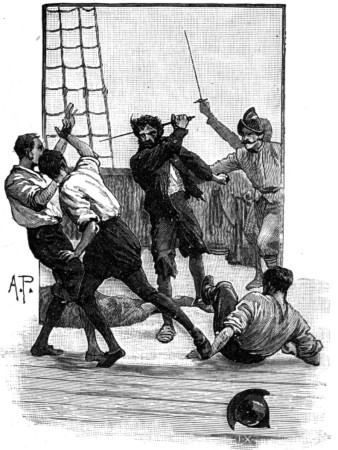 "CUTTING HIS WAY THROUGH THE SPANIARDS."
"CUTTING HIS WAY THROUGH THE SPANIARDS."
"Don Luego responded by threatening the hardy sailor with death unless he pointed out where the contents of the lost galleon were concealed. The seaman suddenly sprang forward, wrenched the sword from his interrogator's hand, and, cutting a way through the surprised Spaniards, flung himself headlong from the vessel's side, and struck out for the shore.
"'Shoot him, men!' cried Don Luego, as the sailor's head emerged for a minute from the water, and instantly a volley from a hundred muskets whistled round the swimmer's head. He dived at once and swam under water, only coming up to take breath occasionally. A second and a third time the muskets were discharged, and then the savages—who had meanwhile gathered in a threatening band at the water's edge, on hearing the strange reports ring out—saw the sailor flung upon the coral beach. They bent over him, then raised a wild cry for vengeance, for the waves had cast at their feet the blood-stained body of the lifeless seaman.
"Landing from their boats, the Spaniards tried to force the natives from the shore, but were driven back time after time at the point of the savages' spears, till disheartened they leapt into their boats again and made for the vessel. Foremost among the wild horde which fought so desperately to avenge the murdered sailor was the daughter of the chief—for among this tribe the women fight in battle no less than the men. Her spear it was which pierced the traitorous Don Luego through as he led on the Spaniards.
"Soon after the ship sailed away the savages took up their dead, and carrying the sailor's body away they placed it in some secret spot, whither also they conveyed the treasure which he had hidden near the shore. There it is said to remain still, for though many daring explorers have set out to find it, none have ever returned to speak of their success, so the coolies say. Yet they would gladly convey the sahibs to the island and help them to overcome the savage tribe still living there, for they are bold seamen, and do not fear fighting whatever enemies may appear."
"I daresay," commented Denviers, with a glance of amusement at the coolies still shading themselves with the umbrella, "they would willingly go with us until the first savage appeared, then they would jump into the junk and make off, leaving us to defend ourselves as best we knew how. I have not the slightest objection to setting out for Formosa, but we will see to the craft ourselves and not trust to them. What is your opinion, Harold?"
"Let us go, by all means," I answered. "Between us we can manage the junk very well, and if we act cautiously we may come across this strangely hidden treasure; at all events, we might try."
Hassan was accordingly dispatched to the coolies to tell them what course we had decided to follow, and after some bargaining the junk was placed at our disposal. Before many hours had passed we were on our way to Formosa, little knowing what a strange adventure was in store for us, or how perilous a task we had so lightly undertaken. Before commencing our journey we carefully questioned the coolies as to where it was rumoured the treasure had been secreted, and, learning this, provided ourselves with everything we thought necessary for the enterprise. Our[Pg 458] tent and possessions were left in charge of a wealthy mandarin, whom we fortunately met at Swatow, while we looked to the state of our weapons, for we fully expected to need them in the adventure before us.
"I think these Formosans are altogether too friendly, Harold," said Denviers, as we eventually reached the rough coast to which we had been directed, and our boat was being dragged through the blinding surf by a dozen fierce-looking savages.
"The sahibs need not fear," interposed Hassan, as he overheard this remark; "it is necessary that we should be led by them, for not otherwise could we see Wimpai, who is their head-man, so the coolies told me."
"I expect we could have managed very well without seeing him," I replied. "Would it not have been possible to have found the sailor's treasure, wherever it is hidden, without landing at a spot where these savages were evidently on the look-out?"
"Not so, by Mahomet!" answered the Arab. "The sahibs would certainly be slain if they attempted to do so without Wimpai permitted them."
"Well, come on then," said Denviers, as he made his way through the wreckage and huge fragments of coral lying on the beach: "I daresay we shall get out of this adventure as safely as we have others. Our new acquaintances are certainly making themselves quite at home with our possessions, before being invited even," he added, as four of them placed on their heads some pieces of cloth and a native basket filled with handsome beads, which Hassan had advised us to bring in order to propitiate Wimpai.
"They seem to consider us their prisoners," I remarked, as the savages marched on the right and left of us, while we strode on with our rifles shouldered.
"I don't relish the look of their knives," commented Denviers; "they are likely to do us far more harm with them than with the clumsy matchlocks which they now carry instead of spears. What a splendid set of fellows they are!"
The savages who inhabited this part of Formosa, so much avoided on account of its dangerous coral reefs, wore only a blue loin-cloth. Their hair was adorned with a number of brightly-coloured feathers, while across the shoulder of each passed a strip of scarlet cloth, reaching to the waist, supporting a plaited loop, into which was thrust the long-bladed knife which my companion mentioned. For some time the tangled pathway which we traversed wound up the steep side of a mountain spur, running almost down to the edge of the raised coral beach. Forcing our way through the screw-pine, which obstructed us, we were soon passing under the shade of some bamboos and banyans, when Denviers motioned to some trees a little way ahead, and suddenly exclaimed:—
"Look out, Harold! These savage niggers mean mischief!"
I glanced carefully to where my companion directed me, and saw a number of matchlocks pointed at us, while the heads of those who held them peered cautiously forth. We raised our rifles to defend ourselves, for we were completely covered by the shining barrels of the enemy, and for a moment fully expected that the lighted port-fires would be applied to their old-fashioned weapons. Seeing that we were closely guarded by the others from any attempt to escape, the savages came out from their lurking-places and advanced to meet us.
"It looks as if Hassan's incredible yarn is going to turn out true after all," said Denviers to me, aside; "at all events, there are several women carrying arms among those in front."
Upon getting close to us the savages passed on one side, and giving a fierce yell of triumph as they did so, turned and followed behind, while our guides or captors still inclosed us, except one of them who led the way. The burden-bearers soon after this disappeared, and we saw no more of the presents which we had brought.
"I expect we are in for it," said Denviers, as the savage led us towards a narrow gap in the heart of the mountain up which we had been toiling. Through this a number of the men passed in single file, and we were bidden to follow them. We halted irresolutely and turned round, only to see the wild horde pressing on behind, impatient at our delay.
"We must go on," said Denviers, "for we are completely surrounded."
The Arab pressed forward, anxious to be the first to test whatever danger confronted us, but my companion prevented this, and Hassan was compelled to take second place, while I followed him. We were absolutely in the dark before we had proceeded a dozen yards through the cleft in the mountain side, and then our worst fears were realized.
I heard a warning cry from Denviers, followed by Hassan's fierce answer, as the savages gathered closely about us where the passage or cave mist have widened out, and[Pg 459] then I felt the grip of a hand upon my throat and saw even in the gloom the fierce glitter of my enemy's eyes. With a thud I brought my rifle down, and the blow evidently told, for my throat was released, while the one who had attacked me fell heavily to the ground.
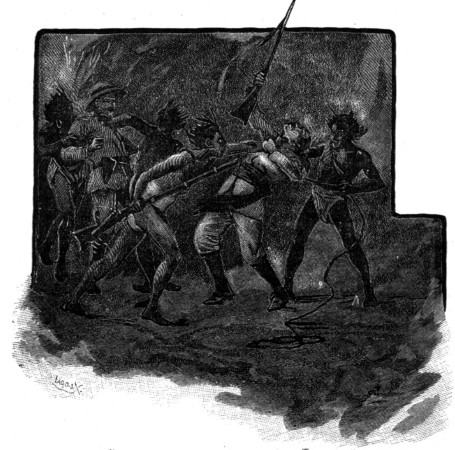 "I FELT THE GRIP OF A HAND UPON MY THROAT."
"I FELT THE GRIP OF A HAND UPON MY THROAT."
Of all the adventures which we had met with, that one, during those few minutes of desperate fighting for our lives in the blackness about us, seemed the most weird and exciting. Once I heard the ring of the Arab's sword as it struck against the side of the rocky excavation, and a call to Mahomet for help came from his lips, while through it all Denviers was cheering us madly on in the blind conflict with our foes. I felt my rifle wrenched at last from my hands, and drawing a pistol from my belt thrust it between the glaring eyes of a savage and fired, sending him down at my feet. In a second that weapon too was snatched from me, and feeling hastily for the other I found it gone! Still another savage faced me, and I struck blindly at him with my fist, dealing a stunning blow which sent him spinning and laid my knuckles bare. With all my might I struggled to keep off the rope or thong which I felt was being bound about me, but the odds were too great, and with my arms lashed tightly to my sides I was dragged forward, wondering what fate was in store and why the savages did not kill us outright with their knives. Evidently that was not their purpose, for as soon as I was helplessly bound no more blows were rained upon me, nor did my captors attempt to inflict further injuries.
How long I was hauled through the gloomy passage in the mountain would be difficult to conjecture, but eventually a stifling heat seemed to penetrate to where I was being hurried along, and a dull red glow appeared ahead which lit up the scene, showing what had happened and where we were. Denviers and Hassan were both bound, the latter having one of his arms left loose, from which circumstance I concluded that it was broken, and this was subsequently found to be true.
The glowing mass ahead increased in its intensity, and cast strange shadows of the savages upon the jagged walls of rock which inclosed us on each side and rose to a height of more than twenty feet at the point we had then reached. We drew near to each other as we emerged into the lighter part of the mountain passage, and the savages ceased to drag us along, since they could watch our movements.
"We ought to be glad these niggers didn't try conclusions with their knives in that fight in the dark," said Denviers, as I got close to him and the Arab. Then, observing the latter's injured arm, he added: "You seem to have got the worst of the encounter with one of them, Hassan——"
"Not so, by the Koran!" answered the Arab, promptly. "He who dealt that blow felt the edge of my sword, and lived but a second after he did it."
"Where are we being taken to, do you think, Hassan?" I asked, looking in surprise at the changing colours of the walls of the passage, which just there were tinted a bluish-grey, then crimsoned a little further on, until the long cave seemed to terminate in an enormous[Pg 460] hollow surrounded by blood-red rocks which rose precipitously upwards.
"The sahib will soon see for himself," answered the Arab. "The savage tribe has chosen a safe retreat where none would expect to find living people, for, see! before us is the jagged side of a crater!"
We emerged from the cave to observe in front of us the cause of the intense heat which had been so oppressive while we were in it. A white cloud of smoke rose from the funnel-like hollow, and occasionally flickering red flames shot up and turned this to the same hue, while at times the cloud wore a blue colour, matching the changing tints of the lake of fire below. Round the interior of the great crater in which we were ran a rugged path of broken masses of rock, between which streams of lava lay, and over them we had to pass. Even as we went along, scarcely able to breathe, we saw a huge fragment of rock crash down into the depths below. This was followed by a grinding sound and a rumble like thunder; then high above us shot a shower of red-hot lava and stones, while we crouched under a projecting shelf of black basalt, and forgot that we were prisoners in the midst of such an impressive scene. When the stream of fire which darted upwards had somewhat subsided, our captives urged us forward, and on we went, tumbling and slipping over the dangerous rocks, which threatened every instant to give way beneath our feet. Even the savages became exceedingly cautious as we wound our way around the crater, and seemed to be getting nearer and nearer still to the molten fire below.
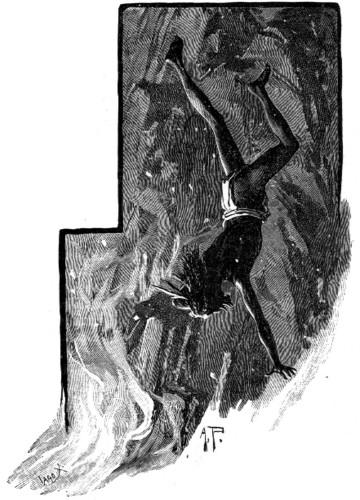 "HE FELL HEAD FIRST."
"HE FELL HEAD FIRST."
As he turned round for a moment to see if we were following, the foremost of our captors missed his footing, and, bound as we were, none of us could make an attempt to save him. Uttering an appalling cry of horror, he fell head first into the roaring furnace! We flung ourselves upon our faces and tried to shut out that weird scream of terror; then Denviers, prone as he was, worked his body forward upon a loose, overhanging rock, and stared down into the red sea of fire below.
"The sahib is mad! Come back, come back!" cried Hassan, excitedly; whereupon the savages, looking more like demons than men, as their faces were lighted up by the glow of the lambent flames, seized hold of my companion and dragged him from threatening death.
"He has not fallen right in," said Denviers to me, calmly, as though his own danger had been a mere nothing; "the man is clinging to a projecting crag just above the flames. Hassan," he cried to our guide, "tell these savages if they will unbind me I think I can save him."
Half stupefied with fear and horror, our captors unbound the long rope which held my companion's arms to his sides, and at once he made a loop at one end of it and advanced again upon the projecting rock. Quickly the rope was lowered and, leaning right over, Denviers managed to reach the almost senseless man, for we saw him hauling the rope slowly in, and finally the head of the savage appeared before us, while the loose rock which upheld rescuer and rescued swayed ominously upon the solid mass which supported it. Scarcely were the two of them dragged back from the rock when over it went, and again a fierce shower of fire shot up, from which with much difficulty we protected ourselves.
The savage lay scorched and motionless for several minutes, then, struggling to his feet, he took one of the knives which another proffered and cut Hassan's bonds as well as my own. Again we moved forward and, conscious that this unexpected rescue of their companion had won for us the goodwill of[Pg 461] all, we passed on, hoping that when we faced Wimpai, their chief, it would be turned to good account. Freed from our bonds so unexpectedly, we went on with more confidence than before, and at last saw another huge cavern facing us, upon entering which we found ourselves in the presence of the savage chief.
We were not able to observe what the entire number of the savages was, since the cave into which we went led to several others where we caught glimpses of many of the wild tribe. We estimated that those among whom we were amounted to about five hundred, more than a half of whom were female warriors. Our appearance was the signal for the savages to raise excited cries, which continued till we stood before Wimpai, who was partly surrounded by a number of his armed women. The chief of our captors, who had received several severe burns and injuries through his fall, pressed forward, and telling first of our fight in the rocky passage, afterwards spoke of his own rescue by Denviers, so we learnt from Hassan. Wimpai rose and leant upon his spear when the savage had concluded his account, and was evidently perplexed as to what course to pursue.
Hassan managed to explain our purpose in visiting the chief, and with an immobile countenance asked for us to be shown the hidden treasure, a request which brought forth a shrill laugh from those around. We could not understand what passed between Wimpai and the Arab, but the latter succeeded in producing a favourable effect by his persuasive words, for he turned to us eventually, saying:—
"Wimpai declares that between his tribe and those who carry the dragon banner to war there has been of late much fighting, which is the reason his people have sought this strange shelter."
"I should have thought these niggers could tell the difference between us and Chinamen," interposed Denviers.
"That is so," responded the Arab; "but the sahib forgets that in the memory of every wild tribe those who have injured them are never forgotten. Finding that we were not like the people with whom they have recently been fighting, those who took us prisoners thought we were the descendants of the fell Spaniards whom their traditions recall. I have told Wimpai that ye are of the same nation as the Feringhee sailor who married the daughter of one of their chiefs so long ago, and he promises that we shall see the treasure, and may take as much of it as we can bear away. Even now a boat is being got ready for us to enter, and a warrior woman is to accompany us down the strange stream which leads to the place where the contents of the galleon have long been hidden."
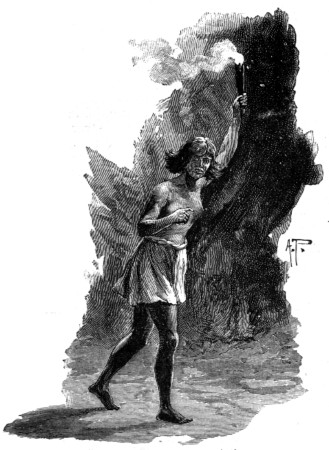 "WE SAW A WOMAN APPROACH."
"WE SAW A WOMAN APPROACH."
As the Arab finished speaking, we saw a woman approach, bearing a torch. Obedient to Wimpai's command, she moved towards one of the rocky passages, and motioned to us to follow. We advanced in single file behind our strange guide, and soon found ourselves in another of the great fissures, which seemed to traverse the heart of the volcano in all directions. Before us, by the light of the flaring torch, we saw a wide stream flowing between lava walls, the lofty top of these meeting far above our heads, and supporting long crystal prisms of a yellowish hue, which hung down in thousands.
The woman who was appointed to guide us pointed to where the native boat had been placed, and into it we leapt, eager to see the treasure taken from the lost galleon. Although there were two pairs of oars of peeled wood ready to hand, we had no occasion[Pg 462] to use them, for the underground river carried us along with its steady current. We each held aloft a blazing torch, which the female warrior had thrust into our hands before she took her seat in the prow of the boat, where she sat facing us.
For more than an hour we passed on, watching the shifting lights of that wonderful scene, and the grey mist that stole upwards from the hot spring down which our little craft was floating fast.
At last we saw several narrow channels into which the stream was divided by its rocky bed, and down one of these we passed in devious turns until our new-found guide rose again in the boat and pointed to a jagged fissure which faced us. Denviers seized a pair of the rude oars and pulled the boat towards it, then leaping out he secured our frail conveyance, after which the woman handed to him a fresh torch, and we all advanced into the cave before us, vaguely wondering what treasure would be revealed to us.
All doubts as to the truth of the wreck of the richly-laden galleon off the coast about which Hassan had told us vanished as soon as ever we entered there. The various things which had formed the cargo of the vessel lay strewed in confused heaps about us. There were wedges of gold and bars of silver, discoloured by the fumes from the crater and the mists from the hot stream, while Spanish muskets, strange-looking pistols, and swords with richly-chased handles, and rust-incrusted barrels and blades lay about in piles. Among these weapons I observed a pair of pistols with gems studding their handles, and thrust them into my sash, besides a splendid sword, which proved very serviceable when polished up, especially as my own defensive arms had been taken away.
Hassan and Denviers followed my example, and then the latter remarked:—
"We may as well make the most of Wimpai's permission to enrich ourselves," and he raised several wedges of gold, which he proceeded to carry towards the entrance of the cave. Hassan and I assisted to load the boat, then we threw in a few more weapons which we thought might prove useful to us, and with a look of regret at the wealth we were forced to leave behind us we turned to leave the place. Just then Hassan moved away from us to another part of the cave, and a moment afterwards he called out to us. Going over to him, we found the Arab and the tribeswoman both looking intently at something lying upon the rocky floor.
"Every word of Hassan's singular story is undoubtedly true," I said to Denviers, in sheer amazement, as we stooped over the object and observed it in the torch-light. The wild tribe had carried and placed the slain sailor by the spoils of the galleon which he had claimed for his own in the very face of Don Luego, the Spanish commander.
There, before our eyes, was stretched the outline of a human form, above which was spread all that remained of the tattered flag that once had fluttered from the masthead of the ship which chased the Spanish galleon, and went down with it on the coral reefs of the Formosan shore!
Slowly we moved away from the spot towards where our boat was, and re-entered it. The task which we had undertaken, however—that of pulling against the stream, with such a weight of treasure as we had obtained—proved a most difficult one. Indeed, Denviers and I exerted ourselves to little purpose for some time, then found that the boat was slowly making headway. We reached the spot where the underground stream divided into its several channels, and then, by an unlucky accident, the prow of our craft was dashed against one of the many rocks which lay between. For a minute we entirely lost control of it, and back it drifted down one of the other channels. At this the female warrior rose, and thrusting the head of her long spear against the rock tried to assist us to get the boat back into the main stream before us. Our efforts were made in vain, for the bed of the narrow channel into which we had got sloped rapidly down, and its waters hurried us along at a speed which defied all our attempts to force the boat back. The woman had dropped her torch when she came to our assistance, and in the light of the solitary one still flaring, as Hassan held it, I saw a look upon her face which startled me. She pointed before us, uttering a wild, despairing cry, which was drowned a moment after in a dull roar which struck upon our ears.
"Pull, sahibs; in Allah's name, pull!" cried Hassan, who was looking ahead at the danger which we faced. "If the boat cannot be stopped from drifting on before a few more hundred yards are gone over, we are lost!"
We gripped the rude oars again, and strained till our arms ached, but still the relentless current bore us on. I gave another glance at the danger ahead, then Hassan wildly exclaimed:—
"Allah and Mahomet help us! We are on the verge of a cataract!"[Pg 463]
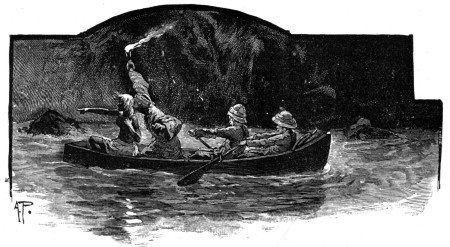 "ON THE VERGE OF A CATARACT!"
"ON THE VERGE OF A CATARACT!"
"Throw the treasure overboard!" cried Denviers, and each of us worked desperately to free the boat of what we had been so eager to obtain. Into the stream we cast the wedges of gold and Spanish arms, and scarcely had our purpose been accomplished, when the boat, lightened of its heavy cargo, was caught up by the rushing stream, swirled round, and then borne madly forward at a rate which brought another despairing cry from the woman's lips.
"Pull with all your might with the stream, Harold!" said Denviers to me, as we drew close to where the roaring waters were leaping down. "Pull, pull, it is our last chance!"
We both knew that if we failed to shoot the rapid ahead we should be sucked down and drowned. We tugged at the oars together, then amid a cloud of blinding spray our boat seemed to hover for a moment over the tumbling waters, then shot forward and left the danger behind.
"We are saved, thank Allah!" cried Hassan, and as we ventured to look round we saw the wonderful escape which had been ours. Swiftly we were carried along by the stream, which began to widen out as it passed between the precipitous sides of a vast ravine.
"Daylight at last!" I exclaimed, with a feeling of relief. "I wonder where we are now being hurried towards."
For a considerable time the stream kept on its rapid course, then grew less violent, and we floated down it gently at last, until we were carried to where we saw the river flowing into the sea, when we at once sprang out upon the rough coral beach.
The Formosan woman hastened away along the shore, making for the distant cave by which we first entered into the strange haunt of her tribe, while we followed slowly after her, having drawn the rude boat high up on the beach.
"Well!" said Denviers, when at last we found our junk, after walking several miles along the coast, and prepared to launch it into the sea in order to leave the island. "We lost the treasure after all, but still we have something left to recall this strange adventure at times," and he drew from his sash the Spanish sword which he had thrust there. After examining it I passed to him the arms which I had taken from the cave. The pistols, although proving useless, were fine specimens of workmanship, and as richly chased as the jewel-studded hilt of the sword which I had also obtained.
"Mahomet has well rewarded the sahibs with such treasures," interposed Hassan, gravely, "and has not forgotten their slave." We glanced towards his waist as he spoke, and saw that the Arab had certainly taken care to arm himself well from the treasures of the lost galleon, for he bristled with swords and poniards like a small armoury.
"Come on, Hassan," said Denviers, with an amused smile at the Arab's weapons, "Mahomet evidently looks with high favour upon you."
We pushed the junk through the surf, then entering it, put out for the distant coast of the mainland, which we reached in safety.

When an animal is more than usually a fool for its size, Nature indulgently permits it to go about with a pouch that it may not lose its family. Nature also sends it to live in Australia, and man, seeing more common sense in the pouch than anywhere else in the creature, calls the entire organism a marsupial, after the pouch. Only one marsupial is allowed to live out of Australia, and that is the opossum; but, then, the opossum is no fool, and can take care of itself in the outer world. Here at the Zoo, besides the opossum, we have kangaroos, wallabies, wallaroos, wombats, and certain other eccentric things, including the[Pg 465] Tasmanian devil; but none is a bigger fool than the biggest marsupial, the kangaroo. This is natural, because he has most room to store his imbecility. The kangaroo's general weakness of character is visible all over him. He has never quite made up his mind what to be even now; he is nothing but a flabby compromise.

There would appear to be two plausible theories about the construction of the kangaroo; when, in the beginning, the animals chose their parts, the kangaroo may have been first, and weakly and indecisively chose at random, of no set purpose; or he may have been last, and obliged to put up with what was left. I incline to the first theory, partly because the kangaroo is well furnished as regards quality of parts, although they are oddly assorted, and partly because to make an indecisive selection would be just in accord with his character. He fancied a sheep's head, rather, but hadn't enough decision of character to take a sheep's head as it was and be[Pg 466] thankful for it. He preferred a donkey's ears to the sheep's, so had them substituted. Even then, some mistrust of the boldness of the design intimidated him, and he cautiously compromised by having them small. The only part of a kangaroo or wallaby that has the least independence about it is the tail; and the wallabies are so proud of the individuality, that they sit with their tails extended before them all day: and the colonist acknowledges the merit of the kangaroo's tail by making soup of it. Let us grant the kangaroo his tail, since it is the only thing that is unmistakably his own. Abashed at his own temerity in venturing to take an independent tail, all the kangaroo's other selections became hopelessly demoralized. He took a grasshopper's hind legs, and plagiarized a rat's fore-paws. Obviously, he got the design of his coat partly from the rabbit and partly from the rat, and the idea of his pouch from the bookmaker.
 THE WICKED DINGO DOG; OR,
THE WICKED DINGO DOG; OR,
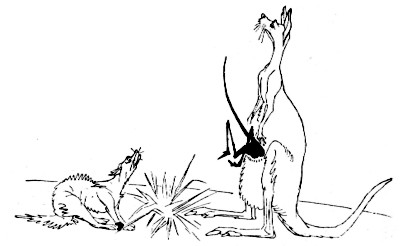 INNOCENCE
INNOCENCE
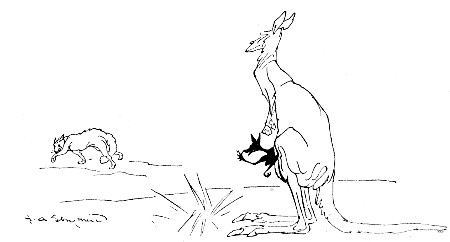 PRESERVED.
PRESERVED.
Now, it is a noticeable thing, illustrative of the mental stagnation of the kangaroo, that, having adopted the crude idea of the bookmaker's or 'bus-conductor's pouch, he—or, rather, she—through all the generations, has never developed an improvement on that pouch, either by evolution, selection, or natural adaptation. Even in these days of improvement, the kangaroo's pouch has no separate compartment for silver. Of course it is mainly used to carry the family in, but in any really intelligent and enterprising class of animals that pouch would long ago have improved and developed, through the countless ages, into a convenient perambulator, with rubber tires and a leather hood. As it is, the kangaroo has not so much as added a patent clasp.
Still, in its merely primitive form, the pouch is found useful by the small kangaroo. It is an ever-ready refuge from the prowling dingo dog, and any little kangaroo who breaks a window has always a capital hiding-place handy. Indeed, the young kangaroo would fare ill without this retreat, because any other cradle the mother, being a kangaroo, would probably forget all about, and lose. It is only because the pouch hangs under her very nose that she remembers she has a family at all. All the kangaroo's strength seems to have settled down into the hind legs and the tail, leaving the other parts comparatively weak, and the head superlatively useless, except as an attachment for the mouth. One would imagine that in the period which has elapsed since the Creation the feeblest-minded of animals would have had time to arrive at some final choice in the matter of coat-colour; but the kangaroo hasn't. He never makes up his mind about anything; he begins life in a pale-grey colour; in a year or two he changes his mind and turns very dark—darker than either his father or his mother. The originality pleases him for a little while, and then he gets doubtful of his choice, and makes a wretched compromise—the kangaroo is compromise all over—settling[Pg 467] down for the rest of his life to a tint midway between the light and the dark. If he lived a little longer he would probably experiment in blue. As it is, he sometimes makes an attempt in pink—with powder. Only the male kangaroo uses this cosmetic, and where he finds it and how he keeps it is a mystery; he doesn't put it on his face—he devotes it entirely to the complexion of his chest and stomach.
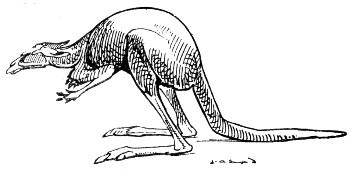 WRESTLING PRACTICE.
WRESTLING PRACTICE.
Australians call a full-grown male kangaroo a "boomer": why, I don't know. I could understand the application of the term in this country, where such a thing as a boom in boxing kangaroos has been heard of, and—this some while ago—a "white kangaroo" boom. The boxing kangaroo has made a very loud boom indeed, and has done something to earn the title of "boomer." Here, at the Zoo, however, there would seem to be little ambition among the kangaroos to distinguish themselves as boxing boomers; but there is a very frequent attitude suggestive of wrestling practice—perhaps because these would-be boomers have muddled things, and are thinking of the wrestling lion. Personally, I am not anxious either to box or to wrestle with a kangaroo; for the beast has a plaguey unpleasant hind foot, armed with a claw like a marline-spike, and a most respectable ability to kick a hole in a stranger with it. It is a kind of weapon that ordinary boxing and wrestling systems don't allow for, and not at all an amusing sort of thing to have lashing about among one's internal machinery. I don't wish to attribute any unsportsmanlike proceedings to the kangaroo now before the public, but to point out that the indiscriminate election of kangaroos into boxing clubs should be discouraged; especially of raw young kangaroos, ready to put on the gloves with anybody and to lose their tempers. Beware of kangaroo upper-cuts. Indeed, the boxing kangaroo should properly wear two pairs of gloves, and the bigger and softer pair should go upon his hind feet. For his is a form of la savate which admits neither of duck, guard, nor counter; and leaves its signature in a form long to be remembered and hard to stitch up.
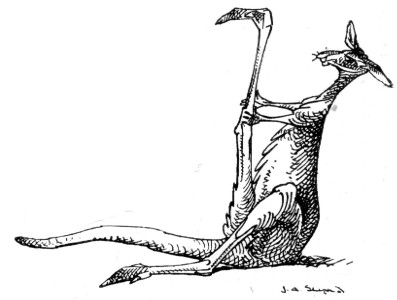 A NASTY WEAPON.
A NASTY WEAPON.
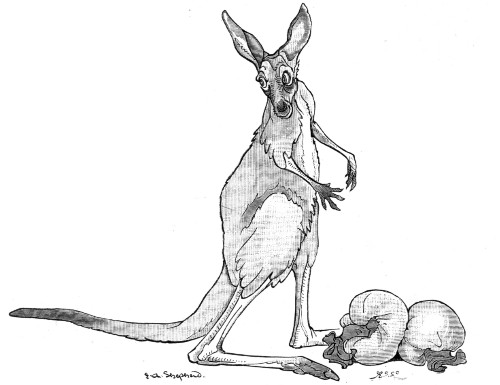 RAW YOUTH—"YES, WILL I."
RAW YOUTH—"YES, WILL I."
The white kangaroo was much less of a boomer. He dared to be original as to colour, and has been shivering and cowering and looking miserable ever since in terror of his own independence; he looks only a sort of unhappy white rabbit, overgrown in the hinder half. But there is encouragement[Pg 468] to be got from the case of the boxing boomer. The kangaroo will never become clever of himself, but perhaps the showman may teach him. There are many comic opportunities in the kangaroo—particularly in the pouch. Let the showman see to it.
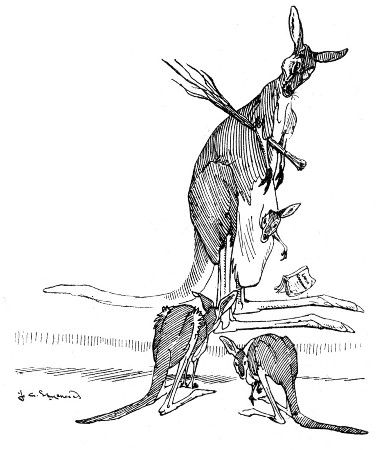 "PLEASE, CAN TOMMY COME OUT?"
"PLEASE, CAN TOMMY COME OUT?"
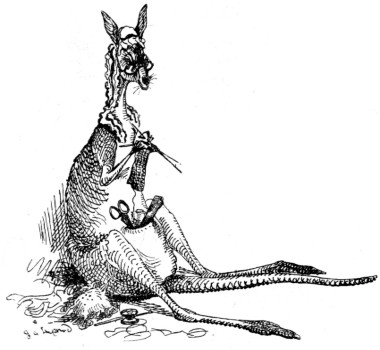 AN OLD MAID.
AN OLD MAID.
The most entirely objectionable of all the marsupials is the Tasmanian devil. It is only a little devil, a couple of feet or so long, but its savagery is beyond measuring by anything like a two-foot rule. No reasonable devils could wish to be treated with more indulgence than the Zoological Society extends to these. A rolling blind is provided to keep the sun out of their eyes, and they are politely labelled "Ursine Dasyures," for fear of offending them. They ill deserve either attention, and at any rate I should like to see the label changed. The function of the Tasmanian devil in the economy of Nature is to bite, scratch, tear and mangle whatever other work of Nature happens to be within reach. It is touching to observe the preference exhibited by the Tasmanian devil for its keeper, who feeds it; it tries to bite him much oftener and more savagely than anybody else. Thus you observe that kindness has some effect, even with the Tasmanian devil. Of course, by its nature, it resents kindness more than anything else, but it will also attack anybody for cruelty, or indifference, or admiration, or curiosity, or for looking at it, or for not looking at it, or any other injury. You can't drive it away with anything; it won't go for a stick and it won't go for a gun; nevertheless it will go for you, like three hundred wild cats.

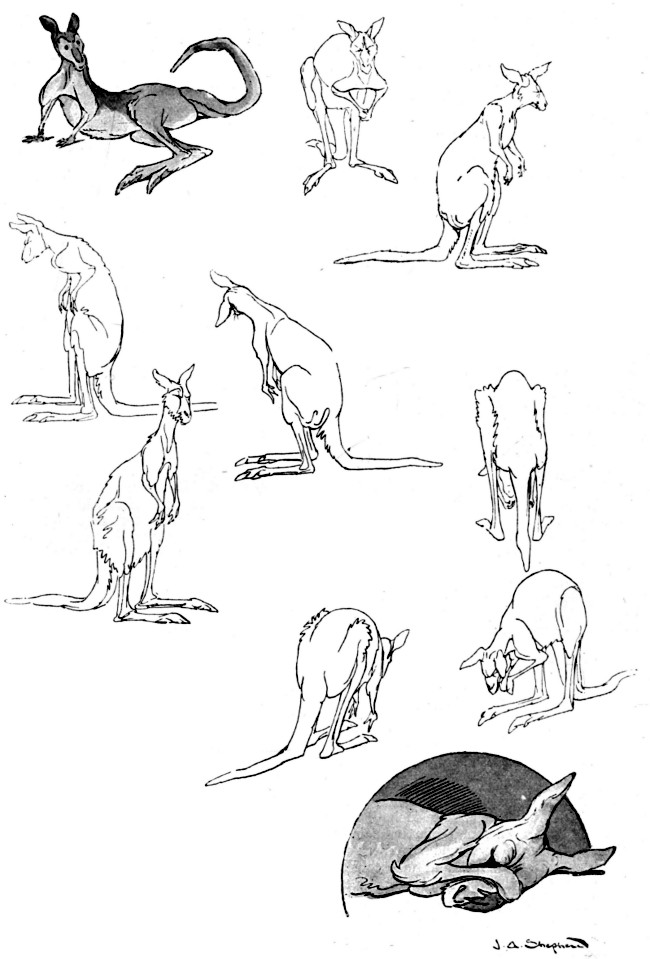 THAT IDEA.
THAT IDEA.
The Tasmanian method of taming it is to blow it into space with a heavy charge of buckshot; and this seems to be the only way of rendering it quite harmless. In life the Tasmanian devil has one desire, one belief, one idea—general devastation. Herein, perhaps, he is the superior of the kangaroo, who doesn't have ideas. There is a superstition that once, in distant ages, a kangaroo had an idea, and if you closely observe a kangaroo who is left to himself,[Pg 469] you may see something in that superstition. Ever since the time of that idea (which, of course, the kangaroo forgot) the whole race of kangaroos has been trying desperately to remember it. Whenever a kangaroo finds himself alone, and unobserved, he addresses himself to recollecting that idea. He gazes thoughtfully at his paws, finding no inspiration. Then, he tries the vacant air above him, with equal ill-success. He brown-studies at the fence, at the ground, at his own tail; he will never, never rescue that lost idea (which is probably a most insane one, not worth rescuing), but he is always persuading himself that he is on the very point of catching it; frowning and turning his head aside as though the words were in his mouth but wouldn't come off the tongue. You will also notice that he wrestles desperately with it in his sleep, with his fore paw over his nose. If in his waking efforts he sees you watching him, he instantly assumes an air of alert wisdom, intended to convey the belief that he has known all about the idea for years, and is only thinking about applying it in some practical way or making a book of it. But the attempt is a failure—those ears give it away. For intellectual pursuits the kangaroo is not[Pg 470] fitted. But he can jump; and the disconsolate grasshopper, whose hind-leg copyright the kangaroo has infringed, is far behind the record. It is, in fact, reported of an educated West Indian that, visiting New South Wales and encountering his first kangaroo, he sat down immediately to write an essay on the unusually large grasshoppers of Australasia.
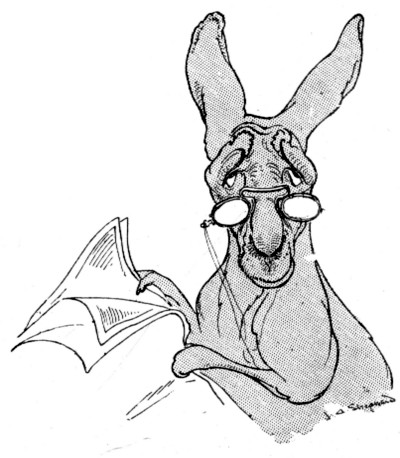 THOSE EARS.
THOSE EARS.
Whether or not a serious naturalist is justified in excluding from a chapter on marsupial animals a careful and detailed consideration of the bookmaker and the 'bus-conductor, I will not stay to argue. I refrain from dealing at length with these interesting creatures in this place, because of the regrettable absence of specimens from the Zoo. The conductor (Bellpunchus familiaris) is readily capturable in this country. The habits of the bookmakers (marsupialis vulgaris) may be studied, and their curious habits learned by anybody willing to incur the expense in the inclosures set apart for their exhibition at the various racecourses, where their sportive gambles are the subject of great interest (and principal) on the part of speculative inquirers.
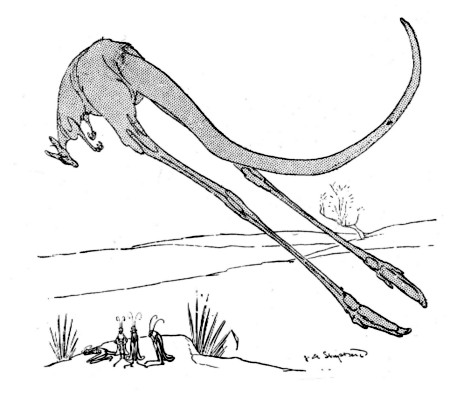 THE RECORD.
THE RECORD.
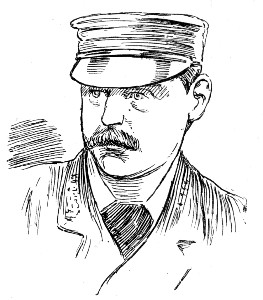 THE KANGARULER.
THE KANGARULER.
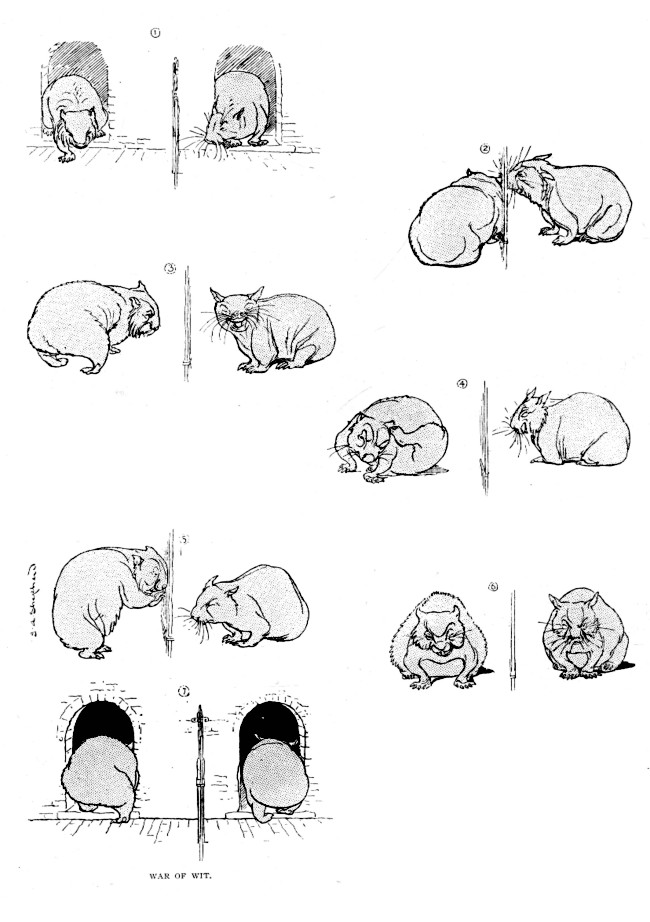 WAR OF WIT.
WAR OF WIT.
Mansbridge is the guardian of the kangaroos in the Zoo—or the kangaruler, as one may say. Most pouched things in the Gardens are given to the care of Mansbridge, which involves a sort of compliment, for a pouched thing is never clever by itself, and wants a keeper who can think for it. He has the wallabies, the kangaroo hares, the kangaroo rats (mad things these, greater hotch-potches than the others), and the wombats. The wombat cannot jump like the kangaroo or the wallaby, and his sprightliness and activity are the sprightliness and activity of a cast-iron pig. He is slow, but I scarcely think he is quite such an ass as the kangaroo. I have even found him indulging in repartee, as you shall see. Every single movement of any part of the wombat is deliberate and well considered; it is apparently debated at great length by all the other parts, and determined upon by a formal resolution, duly proposed, seconded, and carried by the complete animal properly assembled. Once the motion is carried, nothing can stop it. If the wombat's travels are crossed by a river, he merely walks into it, across the bottom, and out at the other side. Here, in lairs side by side,[Pg 471] live a common wombat and a hairy-nosed wombat. They don't come out much in daylight, and they had been here some time before they found themselves both out for an airing together. "Halloa," reflected the hairy-nosed wombat, "here is my neighbour. I'll chaff him!" and he straightway set to work to invent some facetious observation. In an hour or so an idea struck him, and, advancing to the partition bars, he said to the common wombat, "Here, I say—you're common!" and laughed uproariously. The common wombat felt the sting of the remark and determined upon a crushing repartee. While the other chuckled over his achievement (about an hour and a half) the common wombat laboriously constructed his retort. "Yah! hairy-nose!" he said, when the reply was properly finished and polished. And then he chuckled, while the other thought it over. The hairy-nosed wombat thought it over and the common wombat thought it over (chuckling the while) for some hours without arriving at any more epigrams. After that they went into their dens to take a rest. And to this day it is a matter of dispute as to which has the best of that chaffing match: and the hairy-nosed wombat is as far off a brilliant reply to the common wombat as ever, while, of course, the common wombat need not begin to think of another witticism until the hairy-nosed wombat invents, constructs and delivers his. Which is why they never speak to one another now, as anybody may see for himself in proof of the anecdote, if he feel inclined to doubt it. Both are good—tempered and affable in their way; but while they still have this portentous combat of wits on hand they can't afford much time and attention for visitors. The common wombat still meditates and chuckles inwardly over his victory, and[Pg 472] the hairy-nosed wombat is thinking hard, and mustn't be disturbed. It is difficult to imagine what may be the end of the affair, or when the minds of both the wombats may be free to attend to the friendly greetings of visitors; in the meantime, it is well that the reason for their preoccupation may be known. They are not proud. The intelligence of the marsupials is in some sort redeemed by the wombat, who is given a slow and inelastic gait to accord with his mental weight, while the frivolous kangaroo bounces about the world like a thing of india-rubber, and plays a game of leap-frog with all Nature.

Miss Iza Duffus Hardy, only daughter of the late Sir Thomas Duffus Hardy, was educated chiefly at home, and began writing stories at a very early age. Amongst the many popular novels she has published are "A New Othello," "Glencairn," "Only a Love Story," "A Broken Faith," "Hearts or Diamonds," and "Love in Idleness." She has also published two well-known volumes of American reminiscences, "Between Two Oceans" and "Oranges and Alligators." The opening tale of our present number, "In the Shadow of the Sierras," is an excellent specimen of her abilities as a story-writer.

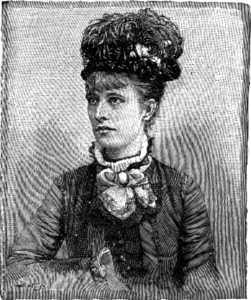 AGE 28.
AGE 28.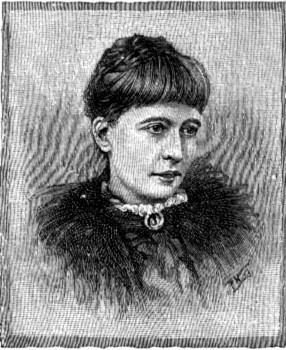 PRESENT DAY.
PRESENT DAY.Mr. Herkomer, who was born at Waal, in Bavaria, is the son of a wood engraver who settled at Southampton in 1857. At thirteen he entered the Art School in that town, and afterwards studied for a time at South Kensington. His first Academy picture was "After the Toil of the Day," exhibited in 1873, when he was twenty-four, a work which extended his reputation and prepared the way for "The Last Muster," 1875, the memorable picture of the Chelsea pensioners, which afterwards figured in the Paris Exhibition of 1878, and was there awarded one of the two Grand Medals of Honour carried off by the English School. Among his best known later pictures may be mentioned "Missing" (1881), "Homeward" (1882), and "The Chapel of the Charterhouse" (1889). He was elected A.R.A. in 1879 and R.A. in 1890.
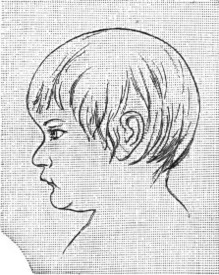 AGE 12 MONTHS.
From a Drawing.
AGE 12 MONTHS.
From a Drawing.
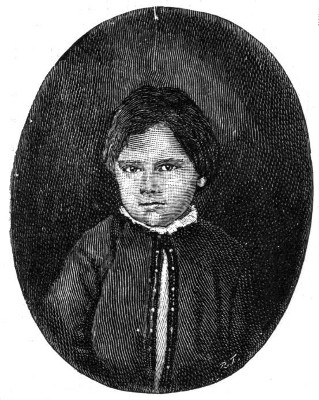 AGE 3.
From a Drawing.
AGE 3.
From a Drawing.
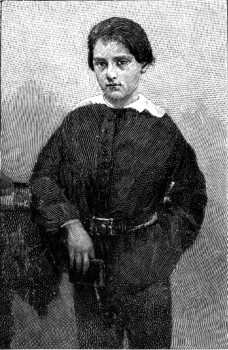 AGE 11.
From a Photograph.
AGE 11.
From a Photograph.
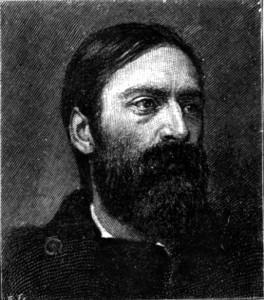 AGE 47.
From a Drawing by Himself.
AGE 47.
From a Drawing by Himself.
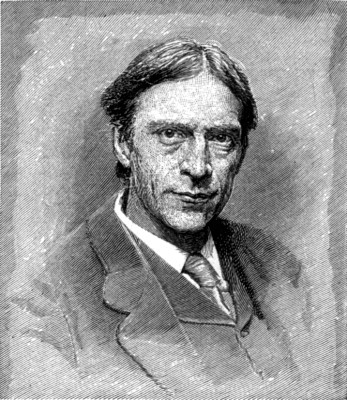 PRESENT DAY.
From a Photo. by Gabell, Ebury St., S.W.
PRESENT DAY.
From a Photo. by Gabell, Ebury St., S.W.
The Hon. Erskine Nicol, A.R.A., was born at Leith, Scotland, in 1825, and received his art education in the Trustees' Academy, Edinburgh, under Sir William Allan and Mr. Thomas Duncan. In 1846 he went to reside in Ireland, where he remained three or four years. It was this residence in the sister isle which decided the painter's choice of his peculiar field of representation, for most of his subsequent pictures have been Irish in subject. From Ireland he returned to Edinburgh, and after exhibiting for some time, he was ultimately elected a member of the Royal Scottish Academy. In 1862 he settled in London, and after that date contributed regularly to the exhibitions of the Royal Academy, of which body he was elected an Associate in June, 1866.
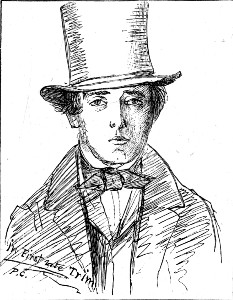 AGE 19.
From a Pencil Sketch by Peter Clelland.
AGE 19.
From a Pencil Sketch by Peter Clelland.
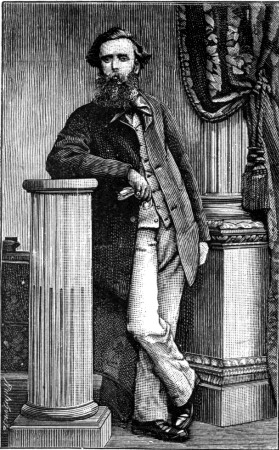 AGE 32.
From a Photo. by J. G. Tunny, Edinburgh.
AGE 32.
From a Photo. by J. G. Tunny, Edinburgh.
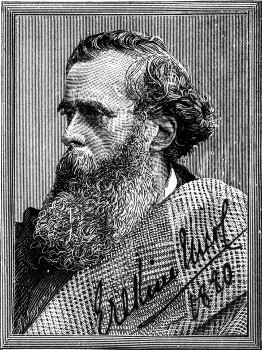 AGE 55.
From a Photo. by Fradelle & Marshall.
AGE 55.
From a Photo. by Fradelle & Marshall.
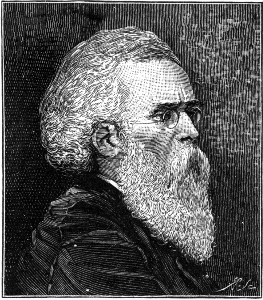 PRESENT DAY.
From a Water Colour Drawing by Himself.
PRESENT DAY.
From a Water Colour Drawing by Himself.

Mr. John MacWhirter, A.R.A., was born at Slateford, near Edinburgh, and educated at Peebles. He was elected an Associate of the Royal Scottish Academy in 1863. In the following year he came to London, and was elected an Associate of the Royal Academy on January 22nd, 1879. He was elected an Honorary Member of the Royal Scotch Academy in 1882; elected member of the Royal Institute of Painters in Water Colours, same year; exhibited in R.A., 1884, "The Windings of the Forth," "A Sermon by the Sea," and "Home of the Grizzly Bear"; 1885, "Track of a Hurricane," "Iona," "Loch Scavaig"; "The Three Witches," 1886. Mr. MacWhirter has painted "Loch Cornisk, Skye," 1867; "A great while ago the world began with hey ho, the wind and the rain," 1871; "Caledonia," 1875; "The Lady of the Woods," 1876; "The Three Graces," 1878; "The Valley by the Sea," 1879; "The Lord of the Glen," 1880; "Sunday in the Highlands," and "Mountain Tops," 1881; "A Highland Auction" and "Ossian's Grave," 1882; "Corrie, Isle of Arran," "Sunset Fires," "Nature's Mirror," "A Highland Harvest," 1883; and "Edinburgh from Salisbury Crag," 1887.
Mr. Forbes-Robertson, who is the son of the well-known art critic and historian, Mr. John Forbes-Robertson, was educated at the Charterhouse, and afterwards at various art schools in France and Germany. Being intended for an artist, he in due course entered the Royal Academy as a student, where he proved a most promising pupil, but his great natural bent towards the stage was too strong to be overcome, and he made his début as Chastelard in "Marie Stuart," at the Princess's. He rapidly made a very high reputation, especially as Baron Scarpia in "La Tosca," in which he displayed extraordinary passion, power, and earnestness. At the present time he is appearing in the remarkable revival of "Diplomacy" at the Garrick.
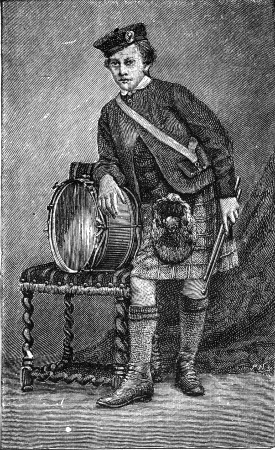 AGE 12.
From a Photograph.
AGE 12.
From a Photograph.
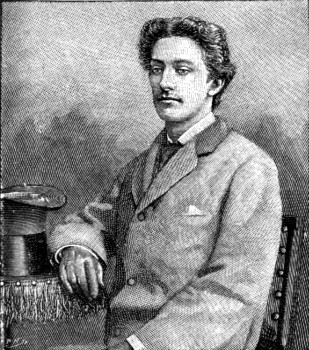 AGE 21.
From a Photo. by The London Stereo. Co.
AGE 21.
From a Photo. by The London Stereo. Co.
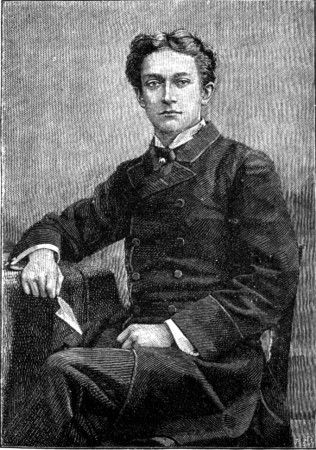 AGE 28.
From a Photo. by Elliott & Fry.
AGE 28.
From a Photo. by Elliott & Fry.
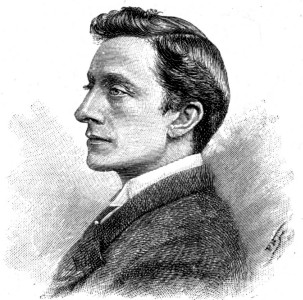 PRESENT DAY.
From a Photo. by Elliott & Fry.
PRESENT DAY.
From a Photo. by Elliott & Fry.
Mr. Edward Lloyd, the famous tenor vocalist, was born in London in 1845. When seven years of age he entered Westminster Abbey choir. Afterwards he became solo tenor at the Chapel Royal, St. James's. Mr. Lloyd sang in Novello's Concerts in 1867, and at the Gloucester Festival in 1871, where he attracted much attention by his part in Bach's "Passion." In 1888 he went on tour in America, and sang in the Cincinnati Festival. In the same year he sang also in the Handel Festival; and was principal tenor in the Leeds Musical Festival in 1889. Mr. Edward Lloyd is an artist "to the manner born," gifted with a perfect ear, a voice not only of exquisite quality, but of remarkable flexibility, and is without doubt the most popular tenor now before the public.
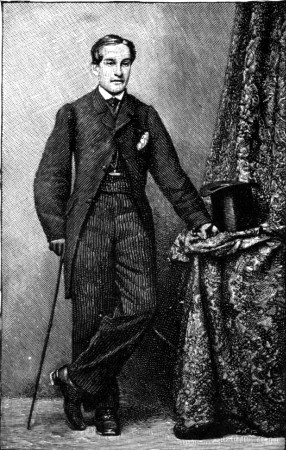 AGE 17.
From a Photo. by Alder Bros., Cheltenham.
AGE 17.
From a Photo. by Alder Bros., Cheltenham.
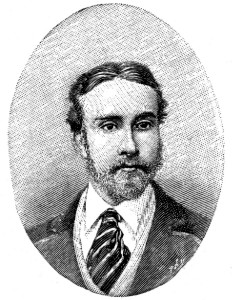 AGE 21.
From a Photo. by Mayland, Cambridge.
AGE 21.
From a Photo. by Mayland, Cambridge.
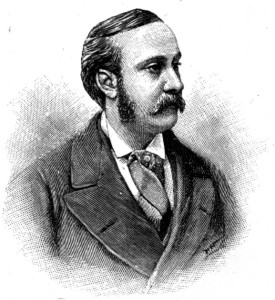 AGE 26.
From a Photo. by Thomas, Gloucester.
AGE 26.
From a Photo. by Thomas, Gloucester.
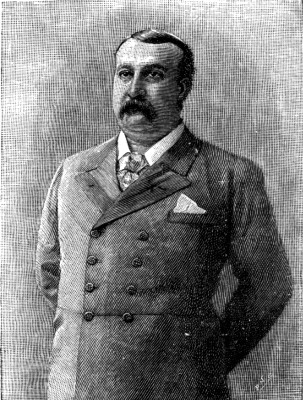 PRESENT DAY.
From a Photo. by Falk, New York.
PRESENT DAY.
From a Photo. by Falk, New York.
An anomaly which often struck me in the character of my friend Sherlock Holmes was that, although in his methods of thought he was the neatest and most methodical of mankind, and although also he affected a certain quiet primness of dress, he was none the less in his personal habits one of the most untidy men that ever drove a fellow-lodger to distraction. Not that I am in the least conventional in that respect myself. The rough-and-tumble work in Afghanistan, coming on the top of a natural Bohemianism of disposition, has made me rather more lax than befits a medical man. But with me there is a limit, and when I find a man who keeps his cigars in the coal-scuttle, his tobacco in the toe end of a Persian slipper, and his unanswered correspondence transfixed by a jack-knife into the very centre of his wooden mantelpiece, then I begin to give myself virtuous airs. I have always held, too, that pistol practice should distinctly be an open-air pastime; and when Holmes in one of his queer humours would sit in an arm-chair, with his hair-trigger and a hundred Boxer cartridges, and proceed to adorn the opposite wall with a patriotic V. R. done in bullet-pocks, I felt strongly that neither the atmosphere nor the appearance of our room was improved by it.
Our chambers were always full of chemicals and of criminal relics, which had a way of wandering into unlikely positions, and of turning up in the butter-dish, or in even less desirable places. But his papers were my great crux. He had a horror of destroying documents, especially those which were connected with his past cases, and yet it was only once in every year or two that he would muster energy to docket and arrange them, for as I have mentioned somewhere in these incoherent memoirs, the outbursts of passionate energy when he performed the remarkable feats with which his name is associated were followed by reactions of lethargy, during which he would lie about with his violin and his books, hardly moving, save from the sofa to the table. Thus month after month his papers accumulated, until every corner of the room was stacked with bundles of manuscript which were on no account to be burned, and which could not be put away save by their owner.
One winter's night, as we sat together by the fire, I ventured to suggest to him that as he had finished pasting extracts into his commonplace book he might employ the next two hours in making our room a little more habitable. He could not deny the justice of my request, so with a rather rueful face he went off to his bedroom, from which he returned presently pulling a large tin box behind him. This he placed in the middle of the floor, and squatting down upon a stool in front of it he threw back the lid. I could see that it was already a third full of bundles of paper tied up with red tape into separate packages.
"There are cases enough here, Watson," said he, looking at me with mischievous eyes. "I think that if you knew all that I had in this box you would ask me to pull some out instead of putting others in."
"These are the records of your early work, then?" I asked. "I have often wished that I had notes of those cases."
"Yes, my boy; these were all done prematurely, before my biographer had come to glorify me." He lifted bundle after bundle in a tender, caressing sort of way. "They are not all successes, Watson," said he, "but there are some pretty little problems among them. Here's the record of the Tarleton murders, and the case of Vamberry, the wine merchant, and the adventure of the old Russian woman, and the singular affair of the aluminium crutch, as well as a full account of Ricoletti of the club foot and his abominable wife. And here—ah, now! this really is something a little recherché."
He dived his arm down to the bottom of the chest, and brought up a small wooden box, with a sliding lid, such as children's toys are kept in. From within he produced a crumpled piece of paper, an old-fashioned brass key, a peg of wood with a ball of string[Pg 480] attached to it, and three rusty old discs of metal.
"Well, my boy, what do you make of this lot?" he asked, smiling at my expression.
"It is a curious collection."
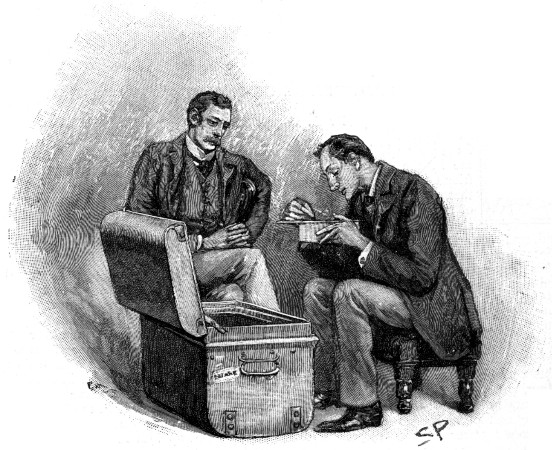 "A CURIOUS COLLECTION."
"A CURIOUS COLLECTION."
"Very curious, and the story that hangs round it will strike you as being more curious still."
"These relics have a history, then?"
"So much so that they are history."
"What do you mean by that?"
Sherlock Holmes picked them up one by one, and laid them along the edge of the table. Then he reseated himself in his chair, and looked them over with a gleam of satisfaction in his eyes.
"These," said he, "are all that I have left to remind me of 'The Adventure of the Musgrave Ritual.'"
I had heard him mention the case more than once, though I had never been able to gather the details.
"I should be so glad," said I, "if you would give me an account of it."
"And leave the litter as it is," he cried, mischievously. "Your tidiness won't bear much strain, after all, Watson. But I should be glad that you should add this case to your annals, for there are points in it which make it quite unique in the criminal records of this or, I believe, of any other country. A collection of my trifling achievements would certainly be incomplete which contained no account of this very singular business.
"You may remember how the affair of the Gloria Scott, and my conversation with the unhappy man whose fate I told you of, first turned my attention in the direction of the profession which has become my life's work. You see me now when my name has become known far and wide, and when I am generally recognised both by the public and by the official force as being a final court of appeal in doubtful cases. Even when you knew me first, at the time of the affair which you have commemorated in 'A Study in Scarlet,' I had already established a considerable, though not a very lucrative, connection. You can hardly realize, then, how difficult I found it at first, and how long I had to wait before I succeeded in making any headway.
"When I first came up to London I had rooms in Montague Street, just round the corner from the British Museum, and there I waited, filling in my too abundant leisure time by studying all those branches of science which might make me more efficient. Now and again cases came in my way principally through the introduction of old fellow students, for during my last years at the university there was a good deal of talk[Pg 481] there about myself and my methods. The third of these cases was that of the Musgrave Ritual, and it is to the interest which was aroused by that singular chain of events, and the large issues which proved to be at stake, that I trace my first stride towards the position which I now hold.
"Reginald Musgrave had been in the same college as myself, and I had some slight acquaintance with him. He was not generally popular among the undergraduates, though it always seemed to me that what was set down as pride was really an attempt to cover extreme natural diffidence. In appearance he was a man of an exceedingly aristocratic type, thin, high-nosed, and large-eyed, with languid and yet courtly manners. He was indeed a scion of one of the very oldest families in the kingdom, though his branch was a cadet one which had separated from the Northern Musgraves some time in the sixteenth century, and had established itself in Western Sussex, where the manor house of Hurlstone is perhaps the oldest inhabited building in the county. Something of his birthplace seemed to cling to the man, and I never looked at his pale, keen face, or the poise of his head without associating him with grey archways and mullioned windows and all the venerable wreckage of a feudal keep. Once or twice we drifted into talk, and I can remember that more than once he expressed a keen interest in my methods of observation and inference.
"For four years I had seen nothing of him, until one morning he walked into my room in Montague Street. He had changed little, was dressed like a young man of fashion—he was always a bit of a dandy—and preserved the same quiet, suave manner which had formerly distinguished him.
"'How has all gone with you, Musgrave?' I asked, after we had cordially shaken hands.
"'You probably heard of my poor father's death,' said he. 'He was carried off about two years ago. Since then I have, of course, had the Hurlstone estates to manage, and as I am member for my district as well, my life has been a busy one; but I understand, Holmes, that you are turning to practical ends those powers with which you used to amaze us?'
"'Yes,' said I, 'I have taken to living by my wits.'
"'I am delighted to hear it, for your advice at present would be exceedingly valuable to me. We have had some very strange doings at Hurlstone, and the police have been able to throw no light upon the matter. It is really the most extraordinary and inexplicable business.'
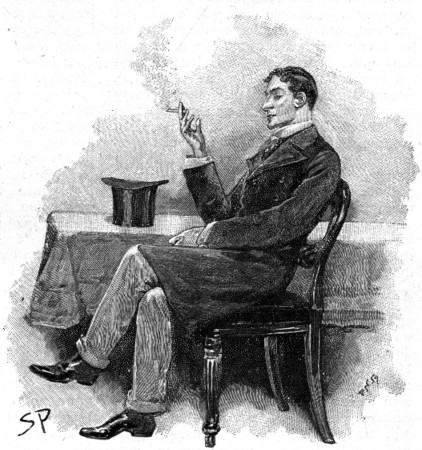 REGINALD MUSGRAVE
REGINALD MUSGRAVE
"You can imagine with what eagerness I listened to him, Watson, for the very chance for which I had been panting during all those months of inaction seemed to have come within my reach. In my inmost heart I believed that I could succeed where others failed, and now I had the opportunity to test myself.
"'Pray let me have the details,' I cried.
"Reginald Musgrave sat down opposite to me, and lit the cigarette which I had pushed towards him.
"'You must know,' said he, 'that though I am a bachelor I have to keep up a considerable staff of servants at Hurlstone, for[Pg 482] it is a rambling old place, and takes a good deal of looking after. I preserve, too, and in the pheasant months I usually have a house party, so that it would not do to be short-handed. Altogether there are eight maids, the cook, the butler, two footmen, and a boy. The garden and the stables, of course, have a separate staff.
"'Of these servants the one who had been longest in our service was Brunton, the butler. He was a young schoolmaster out of place when he was first taken up by my father, but he was a man of great energy and character, and he soon became quite invaluable in the household. He was a well-grown, handsome man, with a splendid forehead, and though he has been with us for twenty years he cannot be more than forty now. With his personal advantages and his extraordinary gifts, for he can speak several languages and play nearly every musical instrument, it is wonderful that he should have been satisfied so long in such a position, but I suppose that he was comfortable and lacked energy to make any change. The butler of Hurlstone is always a thing that is remembered by all who visit us.
"'But this paragon has one fault. He is a bit of a Don Juan, and you can imagine that for a man like him it is not a very difficult part to play in a quiet country district.
"'When he was married it was all right, but since he has been a widower we have had no end of trouble with him. A few months ago we were in hopes that he was about to settle down again, for he became engaged to Rachel Howells, our second housemaid, but he has thrown her over since then and taken up with Janet Tregellis, the daughter of the head gamekeeper. Rachel, who is a very good girl, but of an excitable Welsh temperament, had a sharp touch of brain fever, and goes about the house now—or did until yesterday—like a black-eyed shadow of her former self. That was our first drama at Hurlstone, but a second one came to drive it from our minds, and it was prefaced by the disgrace and dismissal of butler Brunton.
"'This is how it came about. I have said that the man was intelligent, and this very intelligence has caused his ruin, for it seems to have led to an insatiable curiosity about things which did not in the least concern him. I had no idea of the lengths to which this would carry him until the merest accident opened my eyes to it.
"'I have said that the house is a rambling one. One night last week—on Thursday night, to be more exact—I found that I could not sleep, having foolishly taken a cup of strong café noir after my dinner. After struggling against it until two in the morning I felt that it was quite hopeless, so I rose and lit the candle with the intention of continuing a novel which I was reading. The book, however, had been left in the billiard-room, so I pulled on my dressing-gown and started off to get it.
"'In order to reach the billiard-room I had to descend a flight of stairs, and then to cross the head of a passage which led to the library and the gun-room. You can imagine my surprise when as I looked down this corridor I saw a glimmer of light coming from the open door of the library. I had myself extinguished the lamp and closed the door before coming to bed. Naturally, my first thought was of burglars. The corridors at Hurlstone have their walls largely decorated with trophies of old weapons. From one of these I picked a battle-axe, and then, leaving my candle behind me, I crept on tip-toe down the passage and peeped in at the open door.
"'Brunton, the butler, was in the library. He was sitting, fully dressed, in an easy chair, with a slip of paper, which looked like a map, upon his knee, and his forehead sunk forward upon his hand in deep thought. I stood, dumb with astonishment, watching him from the darkness. A small taper on the edge of the table shed a feeble light, which sufficed to show me that he was fully dressed. Suddenly, as I looked, he rose from his chair, and walking over to a bureau at the side he unlocked it and drew out one of the drawers. From this he took a paper, and, returning to his seat, he flattened it out beside the taper on the edge of the table, and began to study it with minute attention. My indignation at this calm examination of our family documents overcame me so far that I took a step forward, and Brunton looking up saw me standing in the doorway. He sprang to his feet, his face turned livid with fear, and he thrust into his breast the chart-like paper which he had been originally studying.
"'So!' said I, 'this is how you repay the trust which we have reposed in you! You will leave my service to-morrow.'
"'He bowed with the look of a man who is utterly crushed, and slunk past me without a word. The taper was still on the table, and by its light I glanced to see what the paper was which Brunton had taken from the bureau. To my surprise it was nothing of[Pg 483] any importance at all, but simply a copy of the questions and answers in the singular old observance called the Musgrave Ritual. It is a sort of ceremony peculiar to our family, which each Musgrave for centuries past has gone through upon his coming of age—a thing of private interest, and perhaps of some little importance to the archæologist, like our own blazonings and charges, but of no practical use whatever.'
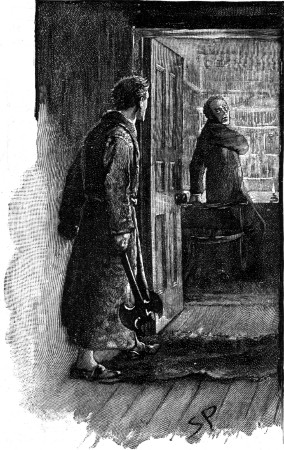 "HE SPRANG TO HIS FEET."
"HE SPRANG TO HIS FEET."
"'We had better come back to the paper afterwards,' said I.
"'If you think it really necessary,' he answered, with some hesitation. 'To continue my statement, however, I re-locked the bureau, using the key which Brunton had left, and I had turned to go, when I was surprised to find that the butler had returned and was standing before me.
"'Mr. Musgrave, sir,' he cried, in a voice which was hoarse with emotion, 'I can't bear disgrace, sir. I've always been proud above my station in life, and disgrace would kill me. My blood will be on your head, sir—it will, indeed—if you drive me to despair. If you cannot keep me after what has passed, then for God's sake let me give you notice and leave in a month, as if of my own free will. I could stand that, Mr. Musgrave, but not to be cast out before all the folk that I know so well.'
"'You don't deserve much consideration, Brunton,' I answered. 'Your conduct has been most infamous. However, as you have been a long time in the family, I have no wish to bring public disgrace upon you. A month, however, is too long. Take yourself away in a week, and give what reason you like for going.'
"'Only a week, sir?' he cried in a despairing voice. 'A fortnight—say at least a fortnight.'
"'A week,' I repeated, 'and you may consider yourself to have been very leniently dealt with.'
"'He crept away, his face sunk upon his breast, like a broken man, while I put out the light and returned to my room.
"'For two days after this Brunton was most assiduous in his attention to his duties. I made no allusion to what had passed, and waited with some curiosity to see how he would cover his disgrace. On the third morning, however, he did not appear, as was his custom, after breakfast to receive my instructions for the day. As I left the dining-room I happened to meet Rachel Howells, the maid. I have told you that she had only recently recovered from an illness, and was looking so wretchedly pale and wan that I remonstrated with her for being at work.
"'You should be in bed,' I said. 'Come back to your duties when you are stronger.'
"'She looked at me with so strange an expression that I began to suspect that her brain was affected.
"'I am strong enough, Mr. Musgrave,' said she.
"'We will see what the doctor says,' I answered. 'You must stop work now, and when you go downstairs just say that I wish to see Brunton.'
"'The butler is gone,' said she.
"'Gone! Gone where?'[Pg 484]
"'He is gone. No one has seen him. He is not in his room. Oh, yes, he is gone—he is gone!' She fell back against the wall with shriek after shriek of laughter, while I, horrified at this sudden hysterical attack, rushed to the bell to summon help. The girl was taken to her room, still screaming and sobbing, while I made inquiries about Brunton. There was no doubt about it that he had disappeared. His bed had not been slept in; he had been seen by no one since he had retired to his room the night before; and yet it was difficult to see how he could have left the house, as both windows and doors were found to be fastened in the morning. His clothes, his watch, and even his money were in his room—but the black suit which he usually wore was missing. His slippers, too, were gone, but his boots were left behind. Where, then, could butler Brunton have gone in the night, and what could have become of him now?
"'Of course we searched the house from cellar to garret, but there was no trace of him. It is as I have said a labyrinth of an old house, especially the original wing, which is now practically uninhabited, but we ransacked every room and cellar without discovering the least sign of the missing man. It was incredible to me that he could have gone away leaving all his property behind him, and yet where could he be? I called in the local police, but without success. Rain had fallen on the night before, and we examined the lawn and the paths all round the house, but in vain. Matters were in this state when a new development quite drew our attention away from the original mystery.
"'For two days Rachel Howells had been so ill, sometimes delirious, sometimes hysterical, that a nurse had been employed to sit up with her at night. On the third night after Brunton's disappearance the nurse, finding her patient sleeping nicely, had dropped into a nap in the arm-chair, when she woke in the early morning to find the bed empty, the window open, and no signs of the invalid. I was instantly aroused, and with the two footmen started off at once in search of the missing girl. It was not difficult to tell the direction which she had taken, for, starting from under her window, we could follow her footmarks easily across the lawn to the edge of the mere, where they vanished, close to the gravel path which leads out of the grounds. The lake there is 8 ft. deep, and you can imagine our feelings when we saw that the trail of the poor demented girl came to an end at the edge of it.
"'Of course, we had the drags at once, and set to work to recover the remains; but no trace of the body could we find. On the other hand, we brought to the surface an object of a most unexpected kind. It was a linen bag, which contained within it a mass of old rusted and discoloured metal and several dull-coloured pieces of pebble or glass. This strange find was all that we could get from the mere, and although we made every possible search and inquiry yesterday, we know nothing of the fate either of Rachel Howells or Richard Brunton. The county police are at their wits' end, and I have come up to you as a last resource.'
"You can imagine, Watson, with what eagerness I listened to this extraordinary sequence of events, and endeavoured to piece them together, and to devise some common thread upon which they might all hang.
"The butler was gone. The maid was gone. The maid had loved the butler, but had afterwards had cause to hate him. She was of Welsh blood, fiery and passionate. She had been terribly excited immediately after his disappearance. She had flung into the lake a bag containing some curious contents. These were all factors which had to be taken into consideration, and yet none of them got quite to the heart of the matter. What was the starting point of this chain of events? There lay the end of this tangled line.
"'I must see that paper, Musgrave,' said I, 'which this butler of yours thought it worth his while to consult, even at the risk of the loss of his place.'
"'It is rather an absurd business, this Ritual of ours,' he answered, 'but it has at least the saving grace of antiquity to excuse it. I have a copy of the questions and answers here, if you care to ran your eye over them.'
"He handed me the very paper which I have here, Watson, and this is the strange catechism to which each Musgrave had to submit when he came to man's estate. I will read you the questions and answers as they stand:—
"'Whose was it?
"'His who is gone.
"'Who shall have it?
"'He who will come.
"'Where was the sun?
"'Over the oak.
"'Where was the shadow?
"'Under the elm.
"'How was it stepped?
"'North by ten and by ten, east by five[Pg 485] and by five, south by two and by two, west by one and by one, and so under.
"'What shall we give for it?
"'All that is ours.
"'Why should we give it?
"'For the sake of the trust.'
"'The original has no date, but is in the spelling of the middle of the seventeenth century,' remarked Musgrave. 'I am afraid, however, that it can be of little help to you in solving this mystery.'
"'At least,' said I, 'it gives us another mystery, and one which is even more interesting than the first. It may be that the solution of the one may prove to be the solution of the other. You will excuse me, Musgrave, if I say that your butler appears to me to have been a very clever man, and to have had a clearer insight than ten generations of his masters.'
"'I hardly follow you,' said Musgrave. 'The paper seems to me to be of no practical importance.'
"'But to me it seems immensely practical, and I fancy that Brunton took the same view. He had probably seen it before that night on which you caught him.'
"'It is very possible. We took no pains to hide it.'
"'He simply wished, I should imagine, to refresh his memory upon that last occasion. He had, as I understand, some sort of map or chart which he was comparing with the manuscript, and which he thrust into his pocket when you appeared?'
"'That is true. But what could he have to do with this old family custom of ours, and what does this rigmarole mean?'
"'I don't think that we should have much difficulty in determining that,' said I. 'With your permission we will take the first train down to Sussex and go a little more deeply into the matter upon the spot.'
"The same afternoon saw us both at Hurlstone. Possibly you have seen pictures and read descriptions of the famous old building, so I will confine my account of it to saying that it is built in the shape of an L, the long arm being the more modern portion, and the shorter the ancient nucleus from which the other has developed. Over the low, heavy-lintelled door, in the centre of this old part, is chiselled the date 1607, but experts are agreed that the beams and stone-work are really much older than this. The enormously thick walls and tiny windows of this part had in the last century driven the family into building the new wing, and the old one was used now as a storehouse and a cellar when it was used at all. A splendid park, with fine old timber, surrounded the house, and the lake, to which my client had referred, lay close to the avenue, about two hundred yards from the building.
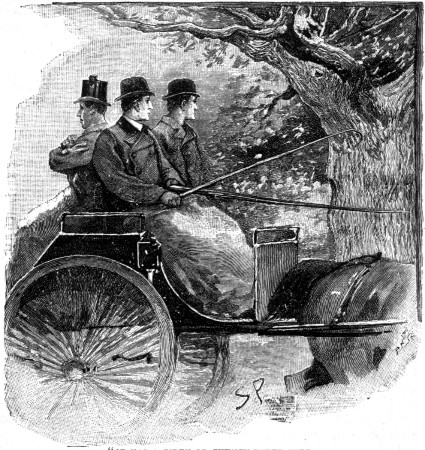 "IT HAS A GIRTH OF TWENTY-THREE FEET."
"IT HAS A GIRTH OF TWENTY-THREE FEET."
"I was already firmly convinced, Watson, that there were not three separate mysteries here, but one only, and that if I could read the Musgrave Ritual aright, I should hold in my hand the clue which would lead me to the truth concerning both the butler Brunton and the maid Howells. To that, then, I turned all my energies. Why should this servant be so anxious to master this old[Pg 486] formula? Evidently because he saw something in it which had escaped all those generations of country squires, and from which he expected some personal advantage. What was it, then, and how had it affected his fate?
"It was perfectly obvious to me on reading the Ritual that the measurements must refer to some spot to which the rest of the document alluded, and that if we could find that spot we should be in a fair way towards knowing what the secret was which the old Musgraves had thought it necessary to embalm in so curious a fashion. There were two guides given us to start with, an oak and an elm. As to the oak, there could be no question at all. Right in front of the house, upon the left-hand side of the drive, there stood a patriarch among oaks, one of the most magnificent trees that I have ever seen.
"'That was there when your Ritual was drawn up?' said I, as we drove past it.
"'It was there at the Norman Conquest, in all probability,' he answered. 'It has a girth of 23 ft.'
"Here was one of my fixed points secured.
"'Have you any old elms?' I asked.
"'There used to be a very old one over yonder, but it was struck by lightning ten years ago, and we cut down the stump.'
"'You can see where it used to be?'
"'Oh, yes.'
"'There are no other elms?'
"'No old ones, but plenty of beeches.'
"'I should like to see where it grew.'
"'We had driven up in a dog-cart, and my client led me away at once, without our entering the house, to the scar on the lawn where the elm had stood. It was nearly midway between the oak and the house. My investigation seemed to be progressing.
"'I suppose it is impossible to find out how high the elm was?' I asked.
"'I can give you it at once. It was 64 ft.'
"'How do you come to know it?' I asked in surprise.
"'When my old tutor used to give me an exercise in trigonometry it always took the shape of measuring heights. When I was a lad I worked out every tree and building on the estate.'
"This was an unexpected piece of luck. My data were coming more quickly than I could have reasonably hoped.
"'Tell me,' I asked, 'did your butler ever ask you such a question?'
"Reginald Musgrave looked at me in astonishment. 'Now that you call it to my mind,' he answered, 'Brunton did ask me about the height of the tree some months ago, in connection with some little argument with the groom.'
"This was excellent news, Watson, for it showed me that I was on the right road. I looked up at the sun. It was low in the heavens, and I calculated that in less than an hour it would lie just above the topmost branches of the old oak. One condition mentioned in the Ritual would then be fulfilled. And the shadow of the elm must mean the further end of the shadow, otherwise the trunk would have been chosen as the guide. I had then to find where the far end of the shadow would fall when the sun was just clear of the oak."
"That must have been difficult, Holmes, when the elm was no longer there."
"Well, at least, I knew that if Brunton could do it I could also. Besides, there was no real difficulty. I went with Musgrave to his study and whittled myself this peg, to which I tied this long string, with a knot at each yard. Then I took two lengths of a fishing-rod, which came to just six feet, and I went back with my client to where the elm had been. The sun was just grazing the top of the oak. I fastened the rod on end, marked out the direction of the shadow, and measured it. It was 9 ft. in length.
"Of course, the calculation now was a simple one. If a rod of 6 ft. threw a shadow of 9 ft., a tree of 64 ft. would throw one of 96 ft., and the line of the one would of course be the line of the other. I measured out the distance, which brought me almost to the wall of the house, and I thrust a peg into the spot. You can imagine my exultation, Watson, when within 2 in. of my peg I saw a conical depression in the ground. I knew that it was the mark made by Brunton in his measurements, and that I was still upon his trail.
"From this starting point I proceeded to step, having first taken the cardinal points by my pocket compass. Ten steps with each foot took me along parallel with the wall of the house, and again I marked my spot with a peg. Then I carefully paced off five to the east and two to the south. It brought me to the very threshold of the old door. Two steps to the west meant now that I was to go two paces down the stone-flagged passage, and this was the place indicated by the Ritual.
"Never have I felt such a cold chill of disappointment, Watson. For a moment it seemed to me that there must be some radical mistake in my calculations. The[Pg 487] setting sun shone full upon the passage floor, and I could see that the old foot-worn grey stones, with which it was paved, were firmly cemented together, and had certainly not been moved for many a long year. Brunton had not been at work here. I tapped upon the floor, but it sounded the same all over, and there was no sign of any crack or crevice. But fortunately, Musgrave, who had begun to appreciate the meaning of my proceedings, and who was now as excited as myself, took out his manuscript to check my calculations.
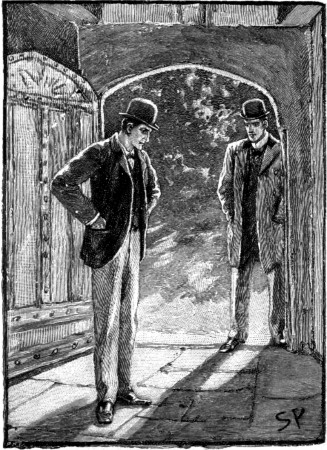 "THIS WAS THE PLACE INDICATED."
"THIS WAS THE PLACE INDICATED."
"'And under,' he cried: 'you have omitted the "and under."'
"I had thought that it meant that we were to dig, but now of course I saw at once that I was wrong. 'There is a cellar under this, then?' I cried.
"'Yes, and as old as the house. Down here, through this door.'
"We went down a winding stone stair, and my companion, striking a match, lit a large lantern which stood on a barrel in the corner. In an instant it was obvious that we had at last come upon the true place, and that we had not been the only people to visit the spot recently.
"It had been used for the storage of wood, but the billets, which had evidently been littered over the floor, were now piled at the sides so as to leave a clear space in the middle. In this space lay a large and heavy flagstone, with a rusted iron ring in the centre, to which a thick shepherd's check muffler was attached.
"'By Jove!' cried my client, 'that's Brunton's muffler. I have seen it on him, and could swear to it. What has the villain been doing here?'
"At my suggestion a couple of the county police were summoned to be present, and I then endeavoured to raise the stone by pulling on the cravat. I could only move it slightly, and it was with the aid of one of the constables that I succeeded at last in carrying it to one side. A black hole yawned beneath, into which we all peered, while Musgrave, kneeling at the side, pushed down the lantern.
"A small chamber about 7 ft. deep and 4 ft. square lay open to us. At one side of this was a squat, brass-bound, wooden box, the lid of which was hinged upwards, with this curious, old-fashioned key projecting from the lock. It was furred outside by a thick layer of dust, and damp and worms had eaten through the wood so that a crop of livid fungi was growing on the inside of it. Several discs of metal—old coins apparently—such as I hold here, were scattered over the bottom of the box, but it contained nothing else.
"At the moment, however, we had no thought for the old chest, for our eyes were riveted upon that which crouched beside it. It was the figure of a man, clad in a suit of black, who squatted down upon his hams with his forehead sunk upon the edge of the box and his two arms thrown out on each side of it. The attitude had drawn all the stagnant blood to the face, and no man could have recognised that distorted, liver-coloured countenance; but his height, his dress, and his hair were all sufficient to show my client, when we had drawn the body up, that it was, indeed, his missing butler. He had been dead some days, but there was no wound or bruise upon his person to show how he had met his dreadful end. When his body had been carried from the cellar we found ourselves still confronted with a problem which was almost as formidable as that with which we had started.[Pg 488]
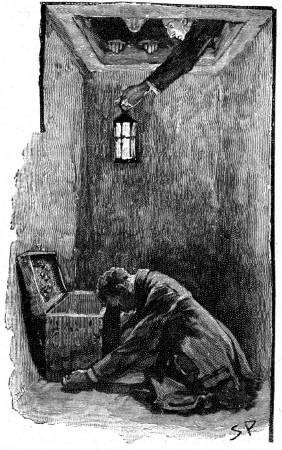 "IT WAS THE FIGURE OF A MAN."
"IT WAS THE FIGURE OF A MAN."
"I confess that so far, Watson, I had been disappointed in my investigation. I had reckoned upon solving the matter when once I had found the place referred to in the Ritual; but now I was there, and was apparently as far as ever from knowing what it was which the family had concealed with such elaborate precautions. It is true that I had thrown a light upon the fate of Brunton, but now I had to ascertain how that fate had come upon him, and what part had been played in the matter by the woman who had disappeared. I sat down upon a keg in the corner and thought the whole matter carefully over.
"You know my methods in such cases, Watson: I put myself in the man's place, and having first gauged his intelligence, I try to imagine how I should myself have proceeded under the same circumstances. In this case the matter was simplified by Brunton's intelligence being quite first rate, so that it was unnecessary to make any allowance for the personal equation, as the astronomers have dubbed it. He knew that something valuable was concealed. He had spotted the place. He found that the stone which covered it was just too heavy for a man to move unaided. What would he do next? He could not get help from outside, even if he had someone whom he could trust, without the unbarring of doors, and considerable risk of detection. It was better, if he could, to have his helpmate inside the house. But whom could he ask? This girl had been devoted to him. A man always finds it hard to realize that he may have finally lost a woman's love, however badly he may have treated her. He would try by a few attentions to make his peace with the girl Howells, and then would engage her as his accomplice. Together they would come at night to the cellar, and their united force would suffice to raise the stone. So far I could follow their actions as if I had actually seen them.
"But for two of them, and one a woman, it must have been heavy work, the raising of that stone. A burly Sussex policeman and I had found it no light job. What would they do to assist them? Probably what I should have done myself. I rose and examined carefully the different billets of wood which were scattered round the floor. Almost at once I came upon what I expected. One piece, about 3 ft. in length, had a marked indentation at one end, while several were flattened at the sides as if they had been compressed by some considerable weight. Evidently as they had dragged the stone up they had thrust the chunks of wood into the chink, until at last, when the opening was large enough to crawl through, they would hold it open by a billet placed length-wise, which might very well become indented at the lower end, since the whole weight of the stone would press it down on to the edge of this other slab. So far I was still on safe ground.
"And now, how was I to proceed to reconstruct this midnight drama? Clearly only one could get into the hole, and that one was Brunton. The girl must have waited above. Brunton then unlocked the box, handed up the contents, presumably—since they were not to be found—and then—and then what happened?
"What smouldering fire of vengeance had suddenly sprung into flame in this passionate Celtic woman's soul when she saw the man[Pg 489] who had wronged her—wronged her perhaps far more than we suspected—in her power? Was it a chance that the wood had slipped and that the stone had shut Brunton into what had become his sepulchre? Had she only been guilty of silence as to his fate? Or had some sudden blow from her hand dashed the support away and sent the slab crashing down into its place. Be that as it might, I seemed to see that woman's figure, still clutching at her treasure-trove, and flying wildly up the winding stair with her ears ringing perhaps with the muffled screams from behind her, and with the drumming of frenzied hands against the slab of stone which was choking her faithless lover's life out.
"Here was the secret of her blanched face, her shaken nerves, her peals of hysterical laughter on the next morning. But what had been in the box? What had she done with that? Of course, it must have been the old metal and pebbles which my client had dragged from the mere. She had thrown them in there at the first opportunity, to remove the last trace of her crime.
"For twenty minutes I had sat motionless thinking the matter out. Musgrave still stood with a very pale face swinging his lantern and peering down into the hole.
"'These are coins of Charles I.,' said he, holding out the few which had been left in the box. 'You see we were right in fixing our date for the Ritual.'
"'We may find something else of Charles I.,' I cried, as the probable meaning of the first two questions of the Ritual broke suddenly upon me. 'Let me see the contents of the bag which you fished from the mere.'
"We ascended to his study, and he laid the débris before me. I could understand his regarding it as of small importance when I looked at it, for the metal was almost black, and the stones lustreless and dull. I rubbed one of them on my sleeve, however, and it glowed afterwards like a spark, in the dark hollow of my hand. The metal-work was in the form of a double ring, but it had been bent and twisted out of its original shape.
"'You must bear in mind,' said I, 'that the Royal party made head in England even after the death of the King, and that when they at last fled they probably left many of their most precious possessions buried behind them, with the intention of returning for them in more peaceful times.'
"'My ancestor, Sir Ralph Musgrave, was a prominent Cavalier, and the right-hand man of Charles II. in his wanderings,' said my friend.
"'Ah, indeed!' I answered. 'Well, now, I think that really should give us the last link that we wanted. I must congratulate you on coming into the possession, though in rather a tragic manner, of a relic which is of great intrinsic value, but of even greater importance as an historical curiosity.'
"'What is it, then?' he gasped in astonishment.
"'It is nothing less than the ancient crown of the Kings of England.'
"'The crown!'
"'Precisely. Consider what the Ritual says. How does it run? "Whose was it?" "His who is gone." That was after the execution of Charles. Then, "Who shall have it?" "He who will come." That was Charles II., whose advent was already foreseen. There can I think be no doubt that this battered and shapeless diadem once encircled the brows of the Royal Stuarts.'
"'And how came it in the pond?'
"'Ah, that is a question which will take some time to answer,' and with that I sketched out to him the whole long chain of surmise and of proof which I had constructed. The twilight had closed in and the moon was shining brightly in the sky before my narrative was finished.
"'And how was it, then, that Charles did not get his crown when he returned?' asked Musgrave, pushing back the relic into its linen bag.
"'Ah, there you lay your finger upon the one point which we shall probably never be able to clear up. It is likely that the Musgrave who held the secret died in the interval, and by some oversight left this guide to his descendant without explaining the meaning of it. From that day to this it has been handed down from father to son, until at last it came within reach of a man who tore its secret out of it and lost his life in the venture.'
"And that's the story of the Musgrave Ritual, Watson. They have the crown down at Hurlstone—though they had some legal bother, and a considerable sum to pay before they were allowed to retain it. I am sure that if you mentioned my name they would be happy to show it to you. Of the woman nothing was ever heard, and the probability is that she got away out of England, and carried herself, and the memory of her crime, to some land beyond the seas."[Pg 490]
The history of Sir Charles Lewis, long time member for Derry, who sat in the last Parliament for North Antrim, is full of instruction for young members. Mr. Charles Lewis, as he was most familiarly known, entered the House as member for Derry in 1872, representing the city for just fourteen years. He was returned again at the General Election of 1886; and it was part of the evil fate that pursued him through his Parliamentary career that he should have been unseated on a petition. In the following February he was returned for North Antrim, and with the Salisbury Parliament disappeared from the political arena.
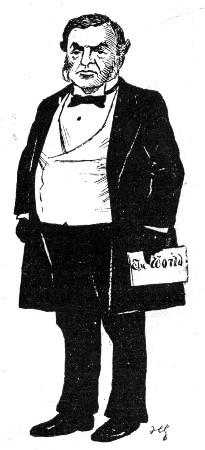 SIR CHARLES LEWIS.
SIR CHARLES LEWIS.
It was in the Session of 1874 that he bounded into fame. Conservatives were in high spirits, just entering under Mr. Disraeli's leadership upon a long lease of untrammelled power. Mr. Lewis, unnoticed in the preceding Parliament, came to the front in the earliest weeks of the new one, buzzing around in what some of his contemporaries were inclined to regard as an unnecessarily blatant manner. He attracted the notice of the World, just then founded, and, under the new and vigorous system of editorship inaugurated by Mr. Edmund Yates, boldly striking out for a leading place in weekly journalism. Mr. Lewis, whom his most relentless detractors would not accuse of lack of courage, resented the playfully bitter attacks of the World, and brought before Mr. Justice Coleridge and a special jury what, at the time, achieved some notoriety as the great White Waistcoat question.
It must be admitted that whether a member of the House of Commons wears a white waistcoat or a black one is no business of anyone but himself; certainly has nothing to do with his political position. But of Mr. Lewis's once famous white waistcoat it may be said, as was written long ago in another connection, "which thing is an allegory." A white waistcoat worn in sultry weather with light tweed or other summer suit is appropriate to the occasion and pleasant to the eye. It was an indication of Mr. Lewis's character—perhaps too subtly, possibly erroneously, deduced—that in bleak March weather he should have breasted an angry House of Commons in a spacious white waistcoat, made all the more aggressive since it was worn in conjunction with a stubbornly-shaped black frock-coat and a pair of black trousers of uncompromising Derry cut. However it be, Mr. Lewis would stand no reflections upon his white waistcoat, and gave the new World an appreciable fillip on its career by haling it into court on a charge of libel, which Lord Coleridge dismissed without thinking it necessary to trouble a jury.
That was not a hopeful start for a new member. But Mr. Lewis was not the kind of man to be daunted by repulse. It supplies testimony to his strong personality that, whilst more or less damaging himself, he succeeded on more than one occasion in seriously compromising his political friends[Pg 491] and the House itself. In the whirlwind that followed it was forgotten that it was Mr. Lewis (now Sir Charles, "B.B.K." as the Claimant put it) who brought about the appointment of the Parnell Commission and all it boded. When in May, 1887, the Times published an article accusing Mr. Parnell of wilful and deliberate falsehood in denying his connection with P. J. Sheridan, Sir Charles Lewis reappeared on the scene, and, with protest of his desire that the Irish leader should have the earliest opportunity of clearing his character from the slur cast upon it, moved that the printers of the Times be brought to the Bar on a charge of breach of privilege. Mr. W. H. Smith, then fresh to the leadership, did his best to shake off this inconvenient counsellor. Sir Charles's proposal was burked; but he had laid the powder, which was soon after fired and led to the successive explosions around the Parnell Commission.
That in later life Sir Charles Lewis should have taken this precise means of bringing himself once more to the front was fresh proof of his courage. It was on an analogous motion that he had made his earliest mark. A Select Committee sitting on Foreign Loans, the morning papers had, as usual, given some report of the proceedings. But though this was customary, it was, none the less, technically a breach of Standing Order. Mr. Charles Lewis, availing himself of the existence of the anachronism, moved that the printers of the Times and the Daily News be summoned to the Bar, charged with breach of privilege. Mr. Disraeli, then leader, did his best to get out of the difficulty. Mr. Lewis, in full flush with the white waistcoat, was inexorable. The printers were ordered to appear. They obeyed the summons, and the House finding itself in a position of ludicrous embarrassment, they were privily entreated to withdraw, and, above all, to be so good as to say nothing more on the matter.
Never since the House of Commons grew out of the Wittenagemot has that august Assembly been brought so nearly into the position of Dogberry. "You shall comprehend all vagrom men; you are to bid any man stand, in the Prince's name." "How, if a' will not stand?" queried the wary second watchman. "Why, then," said the unshakable City officer, "take no note of him, but let him go; and presently call the rest of the watch together, and thank God you are rid of a knave." Thus, in the spring of 1875, under the temporary leadership of Mr. Charles Lewis, did the House of Commons act towards the representatives of the Times and the Daily News, with the added embarrassment that the vagrom men in question had not refused to stand, but were even then in the lobby awaiting judgment.
In the following Session Mr. Lewis succeeded in stirring up another historic scene. It was he who brought under the notice of the House of Commons Mr. Lowe's historic declaration, made in a speech delivered at Retford, that before Mr. Disraeli had undertaken to pass a Bill creating the Queen Empress of India, two other Prime Ministers had been approached on the subject by Her Majesty, and had declined to be a party to the proceedings. Mr. Lewis was utterly devoid of sense of humour, a poverty that largely accounts for his failure in public life. The only joke he ever made was unconsciously produced. It happened one night in Committee of Supply, when, girding at the Irish members opposite, he sarcastically expressed the hope that the vote before the Committee "would not prove another fly in the ointment to spoil the digestion of honourable gentlemen opposite."
"Mr. Chairman," observed Mr. Delahunty, who then represented Waterford City, "we have many peculiarities in Ireland, but we don't eat ointment."
Thus, though Mr. Lewis had no humour in his own nature, he was occasionally the cause of its ebullition in others. The short note he elicited from Mr. Lowe when he assumed the right to call the right hon. gentleman to task for this indiscretion hugely delighted the House of Commons.
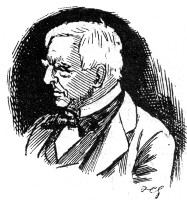 MR. LOWE.
MR. LOWE.
"Sir," snapped Mr. Lowe, "my recent speech at Retford contains nothing relating to you. I must therefore decline to answer your questions."
That would have shut up some men. It had the effect of inciting Mr. Charles Lewis to further action. He brought forward a motion for a return setting forth the text of the oath of Privy Councillors, explaining that he desired to show that Mr. Lowe had, in the disclosure made, violated his oath. There followed an animated and angry scene. Disraeli, whilst dealing a back-handed blow[Pg 492] at the inconvenient friend behind him, struck out at his ancient enemy, Lowe, whose statement he said was "monstrous, if true." He added that he was permitted to state on the personal authority of the Queen it was absolutely without foundation.
These are some of the episodes writ large in a notable Parliamentary career. Their range shows that Mr. Lewis was a man of high, if ill-directed, capacity. No mere blunderer could have stirred the depths of the House of Commons as from time to time he did. He was, in truth—and here is the pity of it—a man of great ability, an admirable speaker. If his instincts had been finer and his training more severe he would have made a position of quite another kind in Parliamentary annals. Vain, restless, with narrow views and strong prejudices, he was his own worst enemy. But he will not have lived in vain if new members, entering the House from whatever quarter, sitting on whichever side, will study his career, and apply its lesson. His character in its main bearings is by no means unfamiliar in the House of Commons. It was his special qualities of courage and capacity that made him so beneficially prominent as an example of what to avoid.
Amongst the characteristics of the present Government that make them in Ministries a thing apart is the almost total absence of the air of mystery that, through the ages, has enveloped Cabinets and their consultations. Never in times ancient or modern was there on the eve of a new Session so little mystery about the intentions of the Government. There was still practised by the morning newspapers the dear old farce of purporting to forecast the unknown. On the morning that opens the new Session there appears in all well-conducted morning papers an article delivered in the style of the Priestess Pythia in the temple at Delphi. Nothing is positively assumed, but the public are told that when the Queen's Speech is disclosed "it will probably contain promise of legislation" on such a head, whilst it will "doubtless be found that Her Majesty's Ministers have not been unmindful of" such another question.
This fashion was invented generations ago, either by the Times or the Morning Chronicle. The editor, having access to those gilded saloons to which Lord Palmerston once made historic reference, or profiting by personal acquaintance with a Minister, obtained more or less full knowledge of what the Queen's Speech would contain. But he was bound in honour to preserve his informant from possibly inconvenient consequences of his garrulity, and so the oracular style was adopted. When other papers, put on the track, obtained information in the same way they adopted the same quaint practice, till now it has become deeply ingrained in journalism. To-day, whilst there is no secret of the sources of information very properly conveyed to the Press on the eve of the Session, this same style of dealing with it, in which Mr. Wemmick would have revelled, is sedulously observed.
At the beginning of this Session other than newspaper editors had been made aware of the general legislative intentions of the Government. Ministers speaking at various public meetings had openly announced that their several departments were at the time engaged upon the preparation of particular Bills, the main directions of which were plainly indicated. It is true that details of the Home Rule Bill were lacking, though two or three weeks in advance of its presentation one journal, the Speaker, gave an exceedingly close summary of its clauses. But that a Home Rule Bill was to be introduced, that it would take precedence of all other measures, and that it would be thorough enough to satisfy the Irish members, were commonplaces of information long before the Speech was read in the House of Lords. It used to be different. Within the range of recent memory, the publication of the Queen's Speech, or at least a forecast in the morning papers, was the first authoritative indication of the drift of legislation in the new Session.
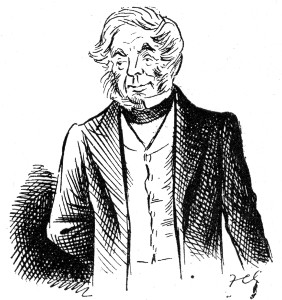 LORD PALMERSTON.
LORD PALMERSTON.
Talking of this new departure with one of the oldest members of the House, he tells me a delightful story, which I have never found[Pg 493] recalled in print, and it is too good to be buried in the pages of Hansard. At one time, in the run of the Parliament of 1859-65, Lord Palmerston being Premier, a rumour shook the political world, affirming the resignation of the Chancellor of the Exchequer, Mr. Gladstone. The newspapers were neither so alert nor so well informed in those days, and the rumour drifted about, neither confirmed nor contradicted. At length, Mr. Horsman could stand the uncertainty no longer, and from his place in the House of Commons he asked Lord Palmerston whether there was any truth in the report.
The Premier approached the table in his gravest manner, and the crowded House was hushed in silence for the anticipated disclosure. He had, he said, just come from a meeting of the Cabinet Council, and could not pretend to be uninformed on the matter of the question submitted to him. The House, however, knew how stringent was the oath of a Privy Councillor, and how impossible it was for one in ordinary circumstances either to affirm or deny a report current as to what had taken place within its doors. Lord Palmerston was evidently struggling between a desire to tell something and disinclination to tamper with his oath. As his manner grew more embarrassed, the interest of the House was quickened. All heads, including that of Mr. Horsman, were craned forward as he went on to observe that, perhaps, in the peculiar circumstances of the case, he would be justified in saying that, at the Council just held, the Chancellor of the Exchequer had been present and had displayed no sign of intended resignation.
"In fact," said Lord Palmerston, turning round to face Mr. Horsman, seated at the corner bench below the Gangway, "my right hon. friend has had his ear at the keyhole of the wrong door."
I have received a sheaf of correspondence arising out of the article in the February number, cataloguing the Old Guard who were in the House of Commons twenty years ago and stand there to-day. One or two demand acknowledgment as adding to the information there garnered. Mr. Thomas Whitworth, of Liverpool, a member of the House of Commons from 1869 to 1874, has made independent investigation, with the result of adding several to the names I gave. These are Sir Charles Dalrymple, Mr. Duff (who has just retired from Parliament on his appointment to the Governorship of New South Wales), Sir Julian Goldsmid, Sir John Hibbert, Sir J. W. Pease, Mr. J. G. Talbot, Mr. Abel Smith, and Mr. James Round. Mr. Whitworth adds Mr. Charles Seeley. That is an error, since Mr. Seeley does not sit in the present Parliament—having been defeated at the General Election when he stood for the Rushcliffe Division of Nottinghamshire.
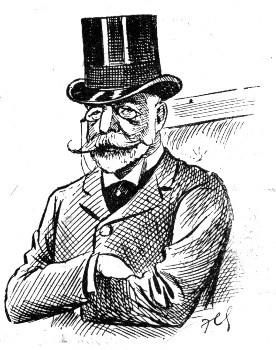 MR. DUFF.
MR. DUFF.
"Sir Thomas Lea (not Mr. Lea) was, in 1873," Mr. Whitworth writes, "member for Kidderminster, and is the only English member of that date who has changed into an Irish one."
The present member for Londonderry was certainly "Mr." Lea in 1873, his baronetcy dating from 1892, being one of the recognitions made by Lord Salisbury of the services of the Dissentient Liberal allies. The reference to Sir William Dyke as Liberal Whip was, as the context shows, an obvious slip of the pen, Sir William having been for many years prominent in the Conservative ranks as an able Whip.
One of the late Mr. Miall's kinsmen points out that "it was Edward Miall, M.P. for Bradford, not Charles," who, side by side with the late Mr. Fawcett, fought Mr. Gladstone on the Irish University Bill, and did much to bring about the subsequent débâcle of the Liberals.
Finally, Mr. Johnston, of Ballykilbeg, writes from the House of Commons: "In your interesting paper, 'From Behind the Speaker's Chair,' in The Strand Magazine for this month, you say, 'Mr. Johnston, still of Ballykilbeg, but no longer a Liberal, as he ranked twenty years ago.' In politics I am to-day what I was twenty years ago. Always anxious to vote for measures for the good of the country, and sometimes being in the Lobby with Liberals, I never belonged to that party. Mr. Disraeli, in a letter which[Pg 494] I have, expressed his regret that I should have been opposed, in 1868, by some Belfast Conservatives, and did all in his power to prevent this. I was always, as he knew, and Lord Rowton knows, a loyal follower of Disraeli."
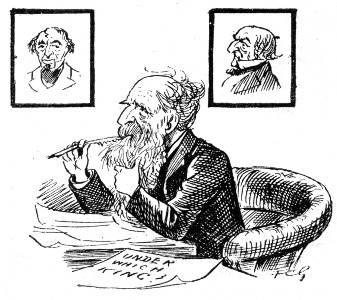 MR. JOHNSTON.
MR. JOHNSTON.
In conversation, Mr. Johnston adds the interesting fact that when in 1868 he was first returned for Belfast, he was in the habit of receiving whips from both sides of the House, a remarkable testimony to the impression of his absolute impartiality thus early conveyed to observers. The House of Commons, by the way, is ignorant that in this sturdy Protestant it entertains a novelist unawares. Mr. Johnston has written at least two works of fiction, one entitled "Nightshade," which presumably deals with the epoch of the fellest domination of Rome; and the other "Under Which King?" a, perhaps unconscious, reflection of the unsettled state of mind with which the hon. gentleman entered politics, and which led to embarrassing attention from the rival Whips.
The interest attached to Lord Randolph Churchill's reappearance on the Parliamentary scene proved one of the most interesting and significant incidents in the early days of the new Parliament. There is no doubt that, whatever be his present views and intentions, Lord Randolph years ago convinced himself that he was cut adrift from the political world, and that it had no charms to lure him back. He began by giving up to Newmarket what was meant for mankind, took a share in a stable, and regulated his social and other engagements in London not by the Order Book of the House of Commons, but by the fixtures in the "Racing Calendar." He was seen only fitfully in his place at the corner seat behind his esteemed friends and leaders then in office. A year later he went off to Mashonaland, and for a full Session Westminster knew him no more.
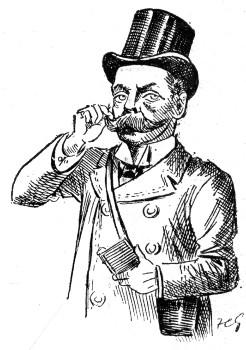 "NEWMARKET."
"NEWMARKET."
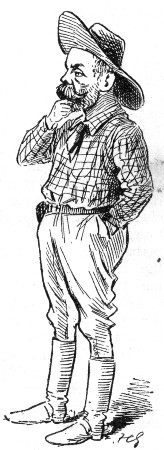 "MASHONALAND."
"MASHONALAND."
When the new Parliament began its sittings Lord Randolph in private conversation was not less insistent as to the permanency of his act of renunciation. He was tired of politics, he said, and saw no future for himself in an assembly where at one time he was a commanding figure. Some of his friends, whilst puzzled and occasionally staggered by his insistence on this point, have always refused to accept his view of the possibilities of the future. A dyspeptic duck gloomily eyeing an old familiar pond might protest that never again would it enter the water. But as long as the duck lives and the water remains, they are certain to come together again. So it[Pg 495] has been with Lord Randolph Churchill, who in this Session has, quite naturally, returned to his old haunts, and with a single speech regained much of his old position.
It is possible that accident, untoward in itself, may have had something to do with hastening the conclusion. When the House first met amid a fierce tussle for seats, Lord Randolph found his place at the corner of the second bench in peril of appropriation. If he desired to retain it, it would obviously be necessary for him to be down every day in time for prayers. Rather than face that discipline he would suffer the company of his old colleagues on the Front Opposition Bench. As a Privy Councillor and ex-Minister he had a right to a seat on that bench equal, at least, to that of Sir Ellis Ashmead-Bartlett. One evening, coming in at question time and finding his seat appropriated by an Irish member, he dropped on to the remote end of the Front Opposition Bench, hoping he did not intrude. His old colleagues warmly welcomed him, made much of him, entreated him to go up higher, and it came to pass that the House of Commons grew accustomed to seeing the strayed reveller sitting in close companionship with Mr. Arthur Balfour. If the whole story of the tragedy of Christmas, 1886, were known, it would appear more remarkable still that from time to time he should have been observed in friendly conversation with Mr. Goschen.
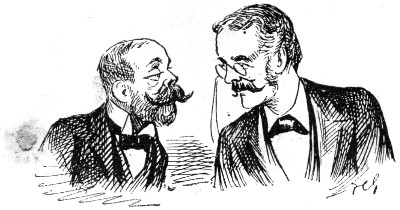 "IN CLOSE COMPANIONSHIP."
"IN CLOSE COMPANIONSHIP."
It was from this quarter that, within the first fortnight of the Session, Lord Randolph rose to make his rentrée. It was characteristic of him that he had sat silent through the long debate on the Address. That meant nothing, except the occupation of a certain space of time. There was no substantial amendment before the House, nor any prospect of the existence of the new Government being challenged on a division. But when the Home Rule Bill was brought in, things were different; there was a tangible substance round which statesmen might give battle.
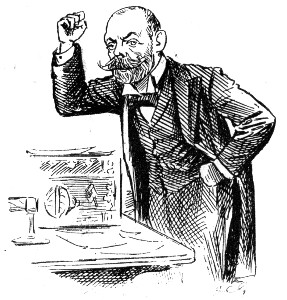 "ROSE TO MAKE HIS RENTRÉE."
"ROSE TO MAKE HIS RENTRÉE."
It was known that Lord Randolph would resume the debate on this particular night, and the thronged state of the House testified to the deathless personal interest he commands. Not since Mr. Gladstone had, a few nights earlier, risen to expound the Bill was the House so crowded. The Prince of Wales, accompanied by the Duke of York, returned to his seat over the clock, whilst noble lords jostled each other in the effort to obtain seats in the limited space allotted to them. It happened that the débutant was destined to undergo a serious and unexpected ordeal. His time should have come not later than five o'clock, questions being then over, and the House permitted to settle down to the business of the day. But there intervened a riotous scene, arising on a question of a breach of privilege. This extended over an hour, and throughout it Lord Randolph sat in a state of almost piteous nervousness.
That was a sore trial for the intending orator, but it reacted with even worse effect on the audience. The House of Commons, though it likes its dishes highly spiced, cares for only one such at a meal. Like the modest person in the hymn, "all it asks for is enough"; and in such a scene as that which raged round the Irish indictment of the Times for breach of privilege it found sufficiency. There are only two, or at most three, men in the House who could have kept the audience together after the prolonged excitement sprung upon it. Very few left their seats when, at six o'clock, Lord Randolph Churchill appeared at the table.[Pg 496]
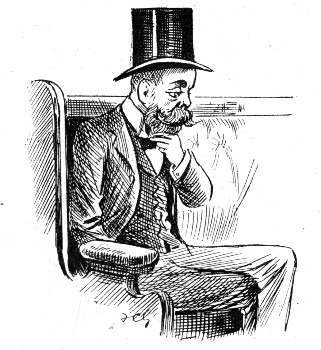 "PITEOUS NERVOUSNESS."
"PITEOUS NERVOUSNESS."
What had just happened, taken in conjunction with this peculiar position, plainly told upon him. He was nervous, occasionally to the point of being inaudible, and did not mend matters by violently thumping the box at the precise moment when otherwise the conclusion of his sentence might have been heard. Some people said in their haste he was but the shadow of his former self, and that he had done well all these years to remain in the background. But the faults of this speech were all of manner. Those who listened closely, with whatever painful effort, recognised in it the old straightforward, vigorous blows, the keen insight, the lucid statement, the lofty standpoint from which the whole question was viewed with the gaze of a statesman rather than with the squint of a politician. Those whose opportunities were limited to reading a full report of the speech perceived even more clearly that Lord Randolph had lost none of his ancient power, had even, with added years and garnered experience, grown in weighty counsel.
His second speech, delivered on the Welsh Suspensory Bill, being free from the accidental circumstances that handicapped his first effort, confirmed this impression. Reassured in his position, confident of his powers, encouraged by a friendly audience, he equalled any of the earlier efforts that established his fame.
What will happen to Lord Randolph in the future is a matter which, I believe, depends entirely upon the state of his physical health. I have written elsewhere, with perhaps tiresome iteration through the six years he has been wilfully trying to lose himself in the wilderness, that he might win or regain any prize in public life to the attainment of which he chose seriously to devote himself. His indispensability to the Conservative party is testified to by the eagerness with which hands are held out to him at the earliest indication of desire to return to the fold. That by his loyalty to the party he has earned such consideration is a truth not so fully recognised as it might be if he were less modest in putting forth a claim. If he had been a man of small mind and mean instincts, what a thorn in the flesh of Lord Salisbury, Mr. Smith, and Mr. Balfour he might have proved in the whole period following on his resignation up to the dissolution of the last Parliament!
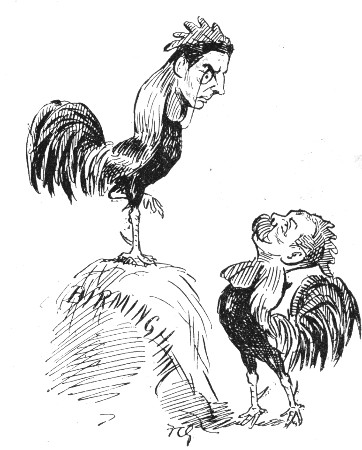 "BIRMINGHAM."
"BIRMINGHAM."
There were many inviting turning points in his career where he had only to lift hand and voice, and a belated Government, living upon the sufferance of not too-affectionate allies, would have found themselves in a strait place. It will suffice to recall one. It happened four years ago last month. On one of the earliest days of April, 1889, the Conservatives of Birmingham turned to Lord Randolph and invited him to contest the seat vacated by the death of Mr. Bright. I have reason to believe that at that time, and for some years earlier, it had been the dearest object of his political life to represent Birmingham.[Pg 497] As early as 1885 he had, recklessly as it seemed, gone down and tried to storm the citadel even when it was held by so redoubtable a champion as Mr. Bright. He had not been very badly beaten then. Now, with the Conservatives enthusiastically and unanimously clamouring for him, and with the assistance of the Dissenting Liberals which, had he presented himself, could not have been withheld under penalty of losing the seat, he would have been triumphantly returned.
Happening at this particular time, in view of his strained relations with Lord Salisbury, election by such a constituency would have placed Lord Randolph in a position of personal influence not equalled by that of any private member. The moment seemed ripe for the birth of an organized party raising the standard of social Toryism, and under that or any other flag there are always ready to rally round Lord Randolph a number of Conservatives sufficient to make things uncomfortable at Hatfield. He had only to go in and win, and had he been inclined to play his own game he would have done so. But it was represented to him that his candidature was distasteful to a powerful ally of the Government; that if he insisted in accepting the invitation, the compact between Dissenting Liberals and the Conservatives would be straightway broken up; and that thereupon Mr. Gladstone would romp in with his Home Rule Bill. It was a bitter pill. But Lord Randolph swallowed it. Unmoved by the angry, almost passionate, protestations of the deputation from Birmingham that waited upon him, he withdrew his candidature, sacrificing himself and his prospects on the party shrine.
Now, Lord Randolph, travelling on other less independent and less interesting lines, seems half inclined to make his way back.
NOTE.—"Pictures and Painters of 1893," an Illustrated Guide to the Royal Academy and the other chief picture exhibitions, being the Fine Art Supplement of "The Strand Magazine" and "The Picture Magazine," and containing 112 pages of pictures, with portraits of artists, beautifully reproduced on tinted papers in a variety of colours, will be published as early as possible in May. Price 1s.
The one afternoon train was due at Middleford, a small, straggling, and not very prosperous town, where terminated a branch line from a junction on the South-Western Railway—a line for which, after long-protracted opposition and delay, a grant had been obtained too late, traffic having merged in the direction of a neighbouring place.
"Middleford! Middleford!"
As the train drew up at the platform, one passenger only, a young man of about eight or nine and twenty, stepped out and stood for a few moments looking about him as if in some uncertainty. He was, in fact, debating with himself as to whether he would, after all, pay the chance visit he had gone there to make.
He had not gone by invitation other than was conveyed in the words: "Don't forget to look me up, if you chance to be anywhere in our neighbourhood, Meredith," spoken by a young fellow between whom and himself there had been some degree of intimacy at the University, as the two parted to go their different ways. The usual words, not generally estimated above their value; and the idea of acting upon them had not occurred to Allan Meredith until he found himself stranded for some hours at the junction, and, turning over the leaves of Bradshaw, came upon the name of Middleford, and remembered that it was Laurence Verschoyle's place. Finding that it was not more than five or six miles from the junction, and that the train was just starting, he had, on the impulse of the moment, taken a ticket and jumped in.
He stood for another moment or two still hesitating, little imagining the influence his decision would have on his future life, and unable to account for his irresolution—a state of mind so unusual with him. He presently shook himself free of the feeling, and decided, since he had got so far, that he would go on. He inquired the way of the porter, who had been curiously eyeing him, and, leaving his bag at the station, set forth for the Priory.
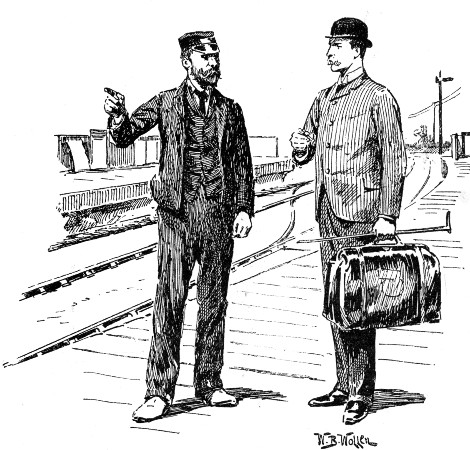 "HE INQUIRED THE WAY."
"HE INQUIRED THE WAY."
As he walked along the not very interesting country road, his thoughts reverted again to the man he was going to see. What had become of him since they had parted three years previously—Verschoyle, the first favourite of his set, who, with his good intellect, brilliant, witty, and versatile, had seemed capable of almost any mental feat? True, he had done nothing beyond give the impression that he could do a great deal if[Pg 499] he chose; "and," thought Allan Meredith, "carry home a sheaf of bills, I expect. He ought to have been the moneyed man, and I the one obliged to keep to the grindstone, perhaps. I don't know; the very necessity for doing something may have given him the kind of impetus he needed—to say nothing of having to keep up the prestige of an ancient name, which must be some spur to a man."
He had reached the cross-roads, and was recalling the somewhat vague directions the porter had given him. "Straight on till you come to a finger-post that seems to point back to the station, but doesn't; take that road, sir—the Priory lane, it's called—until you come to a swing gate, leading into a field; cross that, keeping the footpath to the left, mind you, till you see a stile; get over that, go through the lodge gates right opposite—though it isn't a lodge now, and there ain't no gates, only posts—and up an avenue, where all the trees have been cut down, and there you are. The old place you'll see before you is the Priory."
Time and weather had effaced whatever information the sign-post had once afforded, and there was nothing for it but to take the direction in which it pointed.
He walked slowly on, speculating as to what sort of welcome he was likely to receive from Verschoyle's people. How little he knew about them. Frank to effusiveness in some directions, Verschoyle could be reticent enough in others, and rarely alluded to his family. That he was an only son, and, at his father's death, had inherited but the wreck of a once large property, Allan knew. He had also heard that the widowed mother was still living.
What was Verschoyle doing?—living upon the small property, farming the land; or had he, as he had sometimes talked of doing, gone in for literature, and carried his wares to the London market? At that time his wares had appeared to Allan Meredith likely to be worth a great deal; but, with his three years' added knowledge and experience, he was now inclined to estimate them somewhat differently. Verschoyle's intellect had, indeed, revealed itself chiefly by fitful flashes, brilliant and dazzling enough in their effect at the moment, but leaving no lasting impression of very high powers; and this, with his mercurial temperament, might render his success in the future doubtful.
Allan Meredith had proceeded some distance, and was beginning to think that he must have passed the swing gate without noticing it, when, on turning a bend in the lane, he saw a young girl walking in advance. He quickened his steps a little in order to overtake her, and make inquiry as to whether he was going in the right direction, noting, meanwhile, her general appearance so far as to infer that she was a farmer's daughter; or, rather, as he thought with a half smile, what a farmer's daughter is conventionally supposed to be like. Thick leather shoes, a plainly made gown of some light grey stuff, and short enough for country walking; a large brown straw hat, with neither flower nor feather to adorn it; and ungloved hands, in the one swinging by her side a strap buckled round two or three tattered-looking books. After a moment or two, he recognised something more. Taking note of the firm, light step, the carriage of the head, the perfect ease and freedom of the tall, graceful figure, he mentally ejaculated: "A lady; aye, and with some individuality of her own, too!"
His step had evidently not been heard on the soft, springy turf, and he was fast lessening the distance between them, some curiosity now mingling with his desire for information, when she turned out of the lane and passed through a swing gate. Here she paused for a moment, looking back, and their eyes met.
Yes; just such a face as he, a dreamer of dreams, had sometimes pictured to himself, but hardly hoped to see in the world of reality. A face too grave and troubled for her years—she looked barely eighteen—but how beautiful with its clear, steadfast eyes and general expression so simple, frank, girlish, and, at the same time, so intelligent and thoughtful! She was regarding him with a surprised, questioning look, which reminded him that he was gazing too pertinaciously.
A little consciously he lifted his hat and asked: "Can you direct me to the Priory?"
"The Priory?" she repeated in a low voice, her eyes fixed more intently upon him, and her hand tightening on the gate.
"Mr. Verschoyle's place. I was directed at the railway station, but do not feel sure that——"
"Whom do you want to see there?" she put in abruptly—almost ungraciously.
Nor was the tone assumed; this was not the girl to affect the brusquerie of unconventionality any more than the suavity of conventionality—it was rather that of one in deep anxiety, and unaccustomed to veil her thoughts.
"Mr. Verschoyle," he replied.
"On—business?"—the expression of dread, or whatever it was, deepening in her[Pg 500] face, white now to the lips; as, on the impulse of the moment, she pressed back the gate as though to bar the way.
"No," he murmured. To have brought such a look to such a face!
She still eyed him with the same unquiet scrutiny, as though debating something in her mind; then hurriedly asked: "But why? Where do you come from?"
He might very well have asked what interest his relations with Verschoyle could have for her; but he felt that there was some grave reason underlying her anxiety, and was not inclined to take offence. Moreover, there was no necessity for mystery on his side; and, therefore, he might as well reply openly and directly to her question.
"From Grayminster. My name is Meredith."
"Are you a friend of his? Mr. Verschoyle is my brother"; still a little hesitatingly, and, as it were, on the defensive.
He raised his hat again. "We were at Wadham together, Miss Verschoyle, and, chancing to be in this neighbourhood, I thought I would look him up for half an hour's talk over old times."
The colour came into her cheeks and a smile to her beautiful lips, although both faded too quickly. "I remember your name now, Mr. Meredith. I have often heard my brother speak of you," moving aside for him to pass through the gate as she added: "If you will come with me, I will show you the way."
He bowed, passing quickly through to her side. His indecision had entirely vanished now, and a visit to the Priory seemed the most desirable thing in the world. To think of Verschoyle not mentioning that he had a sister—and such a sister!
"I fear I must have seemed terribly rude when you first spoke to me, Mr. Meredith," she said, looking up into his face with a smile, as they proceeded along the path that skirted the field. "The truth is, I was afraid—that is, I thought you were—someone else," flushing with the consciousness that she was saying more than she had meant to say.
He hastened to assure her that it had been quite evident no discourtesy was intended; mentally, the while, congratulating himself upon not being "someone else," then quietly changed the subject. "I have not seen your brother since we left Oxford, Miss Verschoyle. Your only brother, is he not?"
"Yes; and I am his only sister. My mother, Laurence, and I live at the Priory."
"Mrs. Verschoyle is well, I hope?" with suddenly developed interest in everything that concerned her.
"My mother is not worse, I am glad to say, than she has been the last five years. She is always an invalid." Had not Laurence told him that much?
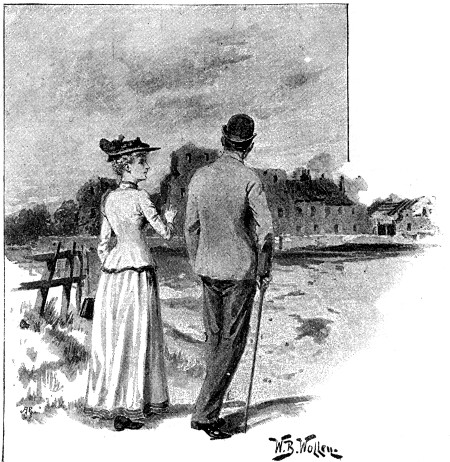 "THERE IS THE PRIORY!"
"THERE IS THE PRIORY!"
"Was it anxiety about her mother's health that had brought that look to her face?" he was thinking. "No; it must be something more than, or at any rate[Pg 501] different from, the kind of trouble which might spring from such a cause."
He murmured a few words of sympathy; her clear eyes turned to meet his, with how different an expression from that he had first seen in them! There was even a little girlish fun in them, as she asked:—
"What kind of place do you imagine the Priory to be, Mr. Meredith?"
"Well, one naturally attaches a little mediæval romance to the idea of a Priory"; adding, after a moment's reflection—there were certainly no signs of prosperity about her—"and it ought to be somewhat dilapidated, I suppose—in the picturesque stage of decay. It must be difficult to keep those old places in thorough repair."
"Very," she replied, her face shadowing. Then, with a side glance at him and again attempting a jesting tone, she went on: "Difficult, too, as it crumbles away, to find room for ancient retainers, old pictures, heirlooms, and the rest of it. Now prepare your mind, Mr. Meredith, when we turn this next bend—There is the Priory!"
He was prepared now to see some dilapidated old place, but hardly for that which met his view. The Priory! That desolate-looking remnant of a building, standing forlornly against the summer sky! Portions of the walls, some high, some low, and all of great thickness, still remained here and there, indicating the plan of the old Priory; but, at this distance, even these seemed to form part of the surrounding brickfields. By no effort of the imagination could the inhabited part of the building be supposed to be the abode of prosperous people. All was desolation and decay, without picturesqueness. Even the aspect of the grounds about it, which might once have lent their aid as a setting to the picture, seemed now only to accentuate the fallen fortunes of the house. Every acre of the ground about it, once of some extent and beautifully wooded, had been sold piecemeal—the greater part for brickfields. On the side they were approaching there seemed no redeeming feature in the dismal scene. No; not likely to be spacious reception-rooms, nor offices for an army of ancient retainers there! Courtesy itself was dumb!
"The Verschoyles have not much left to be proud of, you see, Mr. Meredith. We are not invaded by picnic parties and artists in search of the picturesque; but you see the worst of it from this side."
At that moment the figure of a man was seen emerging from some side entrance, and hurriedly making his way towards the ruins, in an opposite direction from that whence they were approaching.
"Laurence!"—hurriedly calling out, as he seemed to take no heed: "A friend to see you."
He turned; seemed to hesitate a moment; then came slowly towards them. As he drew nearer, and recognised who the visitor was, he hastened his steps, his whole face brightening. "Meredith!" he ejaculated, in a tone of relief. "Where have you sprung from? How are you, old fellow? Quite an age since I saw you last."
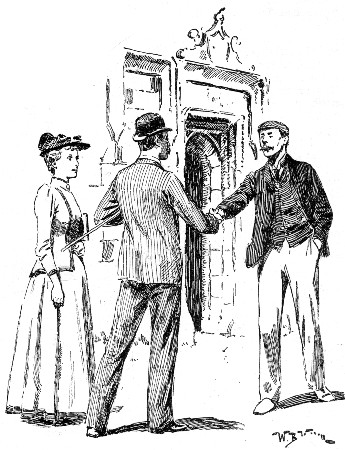 "WHERE HAVE YOU SPRUNG FROM?"
"WHERE HAVE YOU SPRUNG FROM?"
Allan Meredith grasped the hand extended towards him, all the more heartily, perhaps, because it was the hand of Miss Verschoyle's brother, as he explained, "I was at the junction, and being so near, thought I would look you up."
"Glad to see you, old fellow. You know this is my sister?"
"Yes; Miss Verschoyle was good enough to show me the way."
She turned to leave them with the words: "Dinner will be ready in an hour, Laurence."
"All right!"
Meredith had time now to notice that there was the same expression of dread in the brother's face he had seen in the sister's, but with a difference. In her face it was simply fear; in his it was this and something worse. Unlike his sister, looking straight at you in her trouble, his eyes were either downcast or averted: shifting uneasily from one object to another. The whole man was changed—it seemed demoralized—since Meredith had last seen him. His very figure had lost its elasticity, and become slouching and cowering.
"What have you been doing with yourself the last three years?" asked Meredith.
"Oh, all sorts of things; going to the bad, chiefly. Not much opportunity for doing that or anything else here, you may think," noticing the direction which the other's eyes took. "No; I have gone farther afield. Spent two years in London; tried my hand at all sorts of things, and failed. I am a failure all round."
"Nonsense, man; if you take that tone you may be."
"There is no other tone to take, now," moodily.
"Give up in that way, with your abilities, and the world before you!"
"It seems easy enough to you, I dare say. It did to me before I tried. There is no need for you to put your theories to the test, or you might find that men occasionally fail, even though they have hands and brains to work with. Some have to go down, and I'm one of them—that's all!"
"That is not Miss Verschoyle's creed, I think?"
"My sister! She has been telling you about the wretched teaching business, I suppose? She, at any rate, is not cursed with the family pride. I can't endure to see her go about giving lessons to the clodhoppers round here. Does no end of drudgery about the house, too."
It had come to this: the sister was working for both; and Verschoyle did not even see what his allowing her to do so meant! "What kind of pride was this?" thought Meredith, his tone showing, perhaps, a little of what was in his mind, as he gravely replied:—
"I can quite understand your objecting to that. You must let your friends use what interests they have to get you into something, Verschoyle."
"It would be of no use; at any rate, until——no necessity for going into that," moodily kicking a stone across the path. What he wanted just then was money, and this was not the man to whom he could turn for that, with his talk about setting to work. How could he say to this man that he had squandered the last remnant of the small property which had come to him; and that they were liable to be turned out of the old home, such as it was, at any moment now—his invalid mother, and the sister who had striven so hard to keep things together—unless he could obtain money to stave off matters, at any rate for a time? Pressure was now being brought to bear upon him, and threats used that, unless he paid off the sum of five hundred pounds—a sum there seemed no possibility of procuring—charges of fraudulent borrowing would be brought against him which he might find it difficult to combat in a court of law; and he was living from hour to hour in fear of arrest.
The Priory itself, and everything it contained of any value, to the last family portrait that hung upon the walls, had been either mortgaged or sold. If a few heirlooms, in the way of carved furniture—a cabinet or what not—had been allowed still to remain, it was to, as long as possible, keep the knowledge of the worst from his mother and sister.
He had, in the first few moments of their meeting, hurriedly speculated as to whether anything could be made out of the other's chance visit; but his hopes, if they amounted to that, had very quickly died as he remembered the past. There had been nothing large-handed or generous, according to his interpretation of the words, in Meredith. He had shown no inclination to part with his money without a quid pro quô, and lived as though he had not a pound to spare, instead of an income of some ten or twelve thousand a year. He had lost his father in his early boyhood, and the property, carefully nursed for him during a long minority, had largely increased.
That, like many who spend little[Pg 503] upon themselves, Meredith could be even lavishly generous to others, and that there was none to whom one in need could so safely turn for help, Verschoyle did not suspect. He would have been not a little surprised could he have known that many a man had to thank Meredith for help given just at the right moment, and given so quietly that none but the two most concerned were in the secret. Meredith, in fact, cared nothing for the luxuries of life. Capable of doing his share in the world's work, steadily exercising his best faculties, and mentally and physically invigorated by the process, he was almost unable to comprehend a man such as Verschoyle had come to be.
"No; it would be of no use," summed up Verschoyle, eyeing him askance. "If I began to tell him about being in need of a few hundreds, he would want to know the whole story; and it would be no good trying to throw dust in his eyes. I wonder what he would do if I told him point-blank that I am liable to be hauled off to gaol at any moment for lack of five hundred pounds? Button up his pockets and scurry off without waiting to test the Priory hospitality, perhaps; or, worse still, begin to preach."
Seeing that the other was disinclined to be communicative, Meredith changed the subject, introducing any topic he could think of which he thought might interest him. In vain. Both felt that they were farther apart than when they had last met. There was, in fact, a barrier between them which neither knew how to remove. Engrossed in his own reflections, Verschoyle did not keep up the first semblance of bonhomie; a little, indeed, resenting Meredith's efforts in one direction, since he did not seem likely to make any in another of more importance.
Both men were equally relieved when a ruddy-cheeked servant-maid appeared at the door, and informed them that dinner would be ready in ten minutes now. Verschoyle led the way into the house, showed Meredith to a room, and then availed himself of the opportunity to say a few hurried words to his sister.
"Remember, Madge: there's no necessity for offering him a bed. Only a chance visit; that means nothing; and, therefore, dinner is quite enough. How have you contrived it?"
"Oh, pretty well. No need for pretence. He must know by the general aspect of things how it is with us."
"Well, give the mother a hint not to press the hospitalities."
"He would not care to remain if she did, I should think; there is nothing to attract him here"; adding, with a little surprise, "but I should have thought you would have been glad to welcome anyone, dull as you find it, Laurence."
"If I were not in such straits I might. You know I am at my wits' end just now; liable to be seized at any moment for that wretched debt."
He had given it the name of debt to her, and she had not the slightest suspicion that it was anything worse.
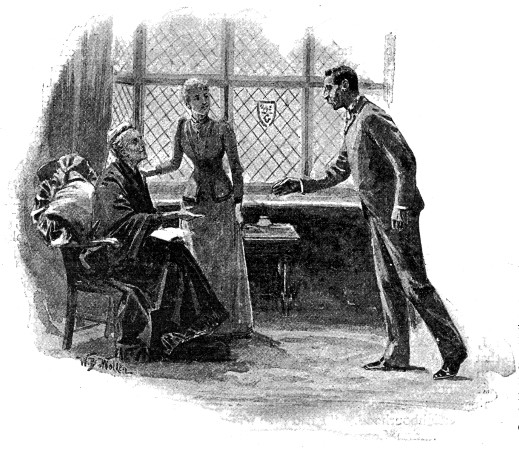 "MEREDITH WAS INTRODUCED."
"MEREDITH WAS INTRODUCED."
At that moment Allan Meredith entered the room, which not even the shabby furniture and appurtenances of the dinner table could render mean looking, with its noble proportions, oak ceiling, carved, high chimney-piece, and oriel window. There was not sufficient carpet even for the fashion—only, indeed, one large old Turkey rug; and that was spread in the recess of the window, where were, also, a finely-carved, high-backed, well cushioned chair, small work and writing tables, and two or three other last relics of better days, devoted to the use of the invalid; a gentle, suffering-looking woman, with traces of great beauty in her thin, worn face.
Meredith was introduced to her by her daughter, with a tone and look which showed she felt that she had still something to be proud of. Her pride in, and loving care of, her mother was, indeed, evident enough. Even his eyes could see how much more thought had been expended upon the invalid's toilet than upon her daughter's, of which the most that could be said was that it was neat as any village girl's might be.
Mrs. Verschoyle received the stranger with the simple courtesy of good breeding. There was no allusion by word or look to the altered fortunes of the house; no attempt at explanation; but a simple, earnest welcome which had its full effect upon Allan Meredith. He noticed, too, at the table that no apologies were made for the dinner, until the contemptuous shrug of the shoulders which Laurence gave as he glanced from the dish of curried mutton at one end to the remainder of the same joint that served as the roast at the other, called forth the reply:
"It is the best I could do, Laurence. There was no time to send into the town, and I hoped that Mr. Meredith might have sufficient appetite after his walk, perhaps, to be able to dine on what we have"; apologizing to her brother, as she had not felt it to be necessary to apologize to their guest.
"That am I, Miss Verschoyle," he said, determined that she should see no lack of appreciation on his side. "I have eaten only a biscuit since eight o'clock this morning"; going on to explain what had brought him to the neighbourhood. "I had got a little out of condition from overwork, and——"
"Overwork!" put in Laurence. "Of what kind?"
"Oh, you know I used to have a fancy for comparing evidence, and latterly I have plodded a little too closely in getting at some I wanted," speaking a little hesitatingly and awkwardly in his desire to avoid seeming to pose. "I needed change of scene and more out-of-door exercise. It happened that a final settlement had, just now, to be made about a small property my father had in this county, and I thought it would be an object, or at any rate give me the change of scene they talked about, to go and look after the sale myself."
"I did not know you owned property in this direction, Meredith."
"It was of very little importance; only a small farm; but there was some competition for it, on account of its joining Lord Drayltown's property. He wanted to take it into his park."
"Did you let him have it?"
"No; it was not so much a question of money with me, and the tenant who had held it so long, and done his best for the house and land, had, I considered, the first claim. He and I settled it together without much law. He is the possessor of the farm, and I have brought away a roll of notes; that's about all."
"I suppose a small farm does not fetch much in these days," said Verschoyle.
"This would have fetched more had I allowed them to bid one against the other; three or four instead of two thousand, I was told."
"Two thousand would seem a pretty good haul to some people. Notes, do you say?"
"Partly; and partly in cheques," replied Meredith, looking a little surprised.
"Do you carry them about with you, Meredith? I mean"—noticing the surprise in the other's face—"is it wise—safe, do you think, to go about these lonely places with all that—" breaking off, and hurriedly adding: "But, of course, we can't let you go to-night. You must put up with what we have to offer, until the morning at any rate." A sudden thought had crossed his mind. Might it not be possible to appeal to Meredith for a loan? "What a quarter of that money would do for me just now! If I could only open my heart to him, as Madge says. Pshaw! Easy enough for girls, such as she, to open their hearts. She wouldn't have been so ready to advise me to do that, had she known all."
"Mr. Meredith would, perhaps, prefer the inn in the town, Laurence; he might find it more comfortable," put in his sister, a little puzzled by the change in his tone; but, supposing it might be only to keep up[Pg 505] appearances, she went on: "There will be a moon, and——"
"Oh, nonsense!" hurriedly interrupted her brother. "You will not mind roughing it for one night, eh, Meredith? Of course you must stay."
"I hope so, indeed," said Mrs. Verschoyle, to whom her daughter had had no time to give the hint her brother bade her give. "I trust you will accept our poor hospitality, Mr. Meredith."
"There, that settles it, Meredith. You can't refuse my mother, now; or she will be lamenting the little we have to offer."
"It is not little to me," replied Meredith, in all sincerity. The chance of spending a few hours in the society of Margaret Verschoyle was, indeed, beginning to mean a great deal to him. He had not, before, met any woman who interested him in this way; and, already, he knew that none other ever would. She said very little now; having, he noticed, become more silent and abstracted as her brother grew effusive, apparently in the endeavour to make up for his previous lack of courtesy.
"This is our only drawing-room, Mr. Meredith," she presently said, as she and her mother rose from the table and went towards the window. "You must please try to imagine we are not here."
"I would rather not do that, Miss Verschoyle," he replied, rising to join them.
"But won't you——? You would not find this claret so bad," said Laurence, adding, as the other declined: "Well, then, a cigar on the terrace, if we can dignify it by that name."
"Not now, thank you. Later on, perhaps, if you will join me."
"Then, I will look after your bag. At the station, didn't you say? We might send Sally's brother, eh, Madge?" hurriedly quitting the room.
Meredith remained with the ladies in the oriel window, whilst the rough-looking maid-servant awkwardly cleared the dinner table, assisted now and again by a smiling word from her young mistress.
"You have a good view from here, Mrs. Verschoyle."
"It is good to me, Mr. Meredith. Fortunately, the brickfields are on the other side; and, seen from here, the part of the ruin, and the old garden and orchard, have a charm of their own for me. But one misses the old elms that used to hide the town, which my daughter thinks looks best when you don't see it," with a smile at the young girl.
"And so do you, dear. Being romantic, you prefer it when there is a mist over it, and you have to imagine what is behind the veil, don't you?" replied her daughter, with pretty defiance. "A serious thing to have a romantic mother, is it not. Mr. Meredith? In these days, too—romance! She had need have a matter-of-fact daughter, had she not?"
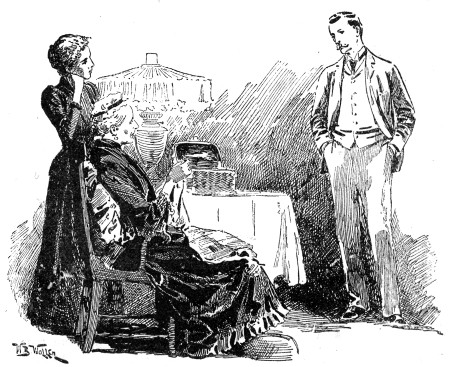 "A SERIOUS THING TO HAVE A ROMANTIC MOTHER, IS IT NOT?"
"A SERIOUS THING TO HAVE A ROMANTIC MOTHER, IS IT NOT?"
He smilingly kept up the same tone, his admiration deepening for the brave heart that could make a jest of her difficulties. How well the mother and daughter seemed to understand each other in making the best of their colourless lives. He soon found they could talk about something besides the narrow experiences of their everyday world. They were accustomed to think intelligently, and were not without a spice of humour, as[Pg 506] well as a romance to cast a glamour over their surroundings. Good listeners, too; showing a desire to hear what was going on in the world of thought; and, now and again, asking questions which kept his wits at work for a reply—a not unpleasant exercise to Allan Meredith, accustomed to use them.
An hour passed quickly away. It was only the uneasy glances the young girl was beginning to cast towards the door which reminded him that Verschoyle had left them so long. When he re-entered the room, Meredith noticed that the sister's eyes turned anxiously towards him.
"I made sure about your bag by seeing after it myself, Meredith," he began. "Remembered the mistakes Sally's brother is apt to make, you know, Madge; and thought he might demand the post bag, or something of that sort."
He appeared more desirous now of making conversation, reminding Meredith of some of their Oxford experiences, inquiring about mutual friends, and what not. But his gaiety did not sit quite naturally upon him, and there was an under-current of excitement in his tone and manner. One there saw that his gaiety was only on the surface, and that he eyed Meredith closely and speculatively when he thought himself unobserved.
"Two thousand pounds! Two thousand!—and a quarter of that would save me," he was thinking. Were the notes in that wallet of which he could trace the outline in the breast pocket of the other's coat? His eyes were turned again and again, as if fascinated, to that breast pocket, while he talked on àpropos of anything that suggested itself. Presently, in reply to some remark of his mother's with reference to the rising moon, and the ghostly way in which its beams seemed to steal about the ruin, he said: "Do you know that we can boast of having a ghost, Meredith?"
"Our very own, who watches over the fortunes of the house," said his sister. "At least, that is the tradition. When last heard of, he was wandering about, with his hand uplifted as if in warning. Not very original, is it? And not of much use, unless he will tell us what we are being warned against."
"Have you seen him, Miss Verschoyle?"
"Oh, no. Even he seems to have deserted us now."
"Speak for yourself, Madge," said her brother, stealing a side glance towards Meredith.
"Have you, then, Laurence?" she ejaculated, turning quickly towards him. "I thought you were inclined to make a jest of the monk."
"I am inclined to do that no longer, perhaps."
"Do you mean that you have seen him? You told me nothing about it, Laurence."
"When I knew what a fright it gave you only to imagine you saw him?"
"But I was only ten years old then, you know. I was frightened, Mr. Meredith," she said, turning to him with a smile. "But even then I was quite as curious as frightened; for though I fell upon my knees and hid my face, I begged him not to go until I got sufficiently used to him to be able to ask what I wanted to know."
"Had he not the grace to do that, Miss Verschoyle?"
"Well, it was only an old military cloak of my father's, which Laurence had hung over a broom in a corner of the school-room to try my courage."
"I wonder what questions you would ask now?"
"Oh, there are so many things one would like to know," the sweet face shadowing, and the eyes taking an anxious expression.
"Is the monk supposed to have a predilection for any particular chamber?" asked Meredith. "Ghosts are uncertain visitors, I know; but it would be something to pass a night where one might be expected."
"You might find it no jest if he came," said Laurence.
"Oh, I should take him seriously enough. In fact, I have something of Miss Verschoyle's feeling. There are so many questions one would like to ask."
She was glancing curiously towards her brother. "Why did he take that tone—he that, until now, had been as ready as the rest to jest at the ghost?" But she had no time to speculate as to what was in his mind. Now that he had returned, she might consider herself off duty in the matter of doing her share towards entertaining; and she had to help Sally to prepare a room for the guest, her invalid mother to attend to, and to contrive a fitting breakfast for the morrow.
The two young men passed out on to the grass terrace before the window, lighted their cigars, and strolled to and fro in the moonlight. There was very little interchange of thought. Allan Meredith was speculating as to how best he could set about helping Margaret Verschoyle's brother; and beginning to fear it would be very difficult to do so, unless he were more inclined than he now appeared to put his shoulder to the wheel.[Pg 507] He had little sympathy for a nature such as Verschoyle's; and, unconsciously perhaps to himself, the few words he uttered conveyed what was in his mind to the other, who was quick to resent it.
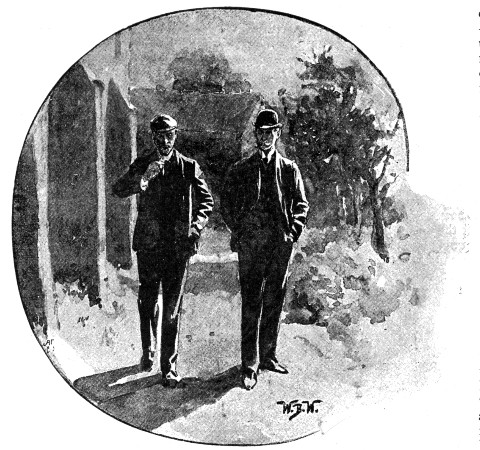 "TO AND FRO IN THE MOONLIGHT."
"TO AND FRO IN THE MOONLIGHT."
"Put me in the way of earning money, indeed! No use asking him for a loan; he would be putting all sorts of awkward questions," thought Verschoyle, with the uneasy consciousness that he would find it difficult to explain without incriminating himself. "No, I won't try it! It must be the other way—there's no help for it now. Once out of this hole, I'll put my shoulder to the wheel, and pay him back with the first money I earn. He isn't likely to want the money if I took all instead of a quarter, and I won't take a penny more than that. It will only be a loan after all, which, if he were like anyone else, I could openly ask him for. Yes, I'll do it! If he sees through the trick, it will be easy to say it was only a jest done to try him. But I think I can manage it so quietly that he won't wake, and then I am safe."
On re-entering the room they had quitted—the only habitable sitting-room the Priory could now boast—they found it untenanted, the mother and daughter having retired for the night. The two men sat in desultory conversation, maintained with some effort, until, in reply to a question from Laurence, Meredith admitted that he had had a long day and was inclined for bed. They went up together, and Laurence showed the other into a large, barely-furnished, and somewhat desolate-looking room, with two doors and one high, narrow, iron-barred window.
"Sorry we have no better quarters to offer you, Meredith."
"I am no sybarite, Verschoyle. You'll say that when you see my room at home. My housekeeper is always bewailing my lack of appreciation of what she calls comfort"—taking out his pocket-book as he spoke, and putting it on to the dressing-table before removing his coat.
Laurence took quick note of the position of the book upon the table. "Well, good-night, old fellow"; adding, with an elaborate assumption of carelessness: "Oh, by the way, I'd nearly forgotten: there's a key in that door—the one belonging to this must be lost, I fancy; but it seems hermetically sealed. You can't open it, you see," turning and pulling at the handle; "and you are safely barred in at the window," with a little laugh.
"All right, Verschoyle. A barred window and a locked door ought to be enough. Good-night," telling himself they must talk over things in the morning. Too late to enter upon what he wanted to say, just then. In the morning Verschoyle should be made to see that here was a friend who was not to be put off; they must go into matters together.[Pg 508] Verschoyle must be induced to set to work, and in the meantime it must be so contrived that the mother and daughter should be better cared for. "Tell him that I have taken a great fancy to this old place; and, between ourselves, give him a few thousands for it, perhaps—to be settled on them—yes, certainly settled on them."
Once in his own room, Verschoyle sank into a seat and buried his face in his hands. "If there were but any other way than this! If only the man had not gone there bragging about his thousands!" trying to persuade himself that there had been bragging, and almost hating Meredith for the wrong he was about to do him. "He would not do it! Let the worst come to the worst—he would not!" springing to his feet again, and fiercely shaking his fist as against some unseen tempter.
The clock in a distant church tower chimed twelve. One vibrated on the night air: it would soon be too late! Morning would dawn, and the opportunity be gone! Shivering with the remembrance of what the morning might bring—ruin, disgrace, his whole life blighted—he once more decided there must be no drawing back. With set teeth and determined eyes he went towards a chair upon which lay a folded garment. He shook it out—a long, dark, military cloak—and proceeded, in awkward but tolerably efficient fashion, to pin the cape so as to, as nearly as possible, resemble a monk's hood. Changing his boots for slippers, he enveloped himself in the cloak, drawing the hood well forward so as to cover nearly the whole of his face; then softly opened the room door, and stood listening with bated breath.
No sound broke the stillness. He stole noiselessly forth, and entered a small room, the door of which was ajar, as he himself had placed it a couple of hours previously. This room opened into the larger one in which was Allan Meredith. Laurence stole silently to the communicating door, locked, and with the key outside. It had been well oiled; but this notwithstanding, there was a slight sound, like thunder to his guilty ears, as he turned the key in the lock.
He waited breathlessly for a few moments again, then, hearing no sound from within, softly pushed open the door and looked in. His eyes were, at once, directed towards the bed. Yes, Meredith was, apparently, fast asleep. To make quite sure, he stood silent and motionless, listening intently. The quiet, even breathing of one in deep slumber reached him. He moved softly towards the dressing-table, his eyes still turned upon the bed; then stood motionless again, a tall black figure in the semi-darkness.
Why did he hesitate? What was it that suddenly impelled him to tell the truth, and cast himself upon the mercy of the man lying there—his good angel battling for him? The scales trembled in the balance for a moment, and then it was as though he had chosen—"Evil, be thou my good"; and the way was, at once, made easy for him.
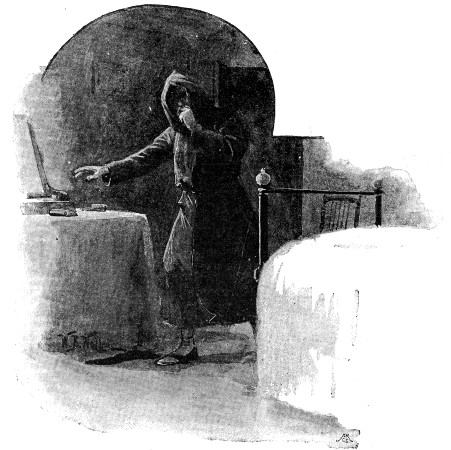 "HIS HAND CLOSED OVER IT."
"HIS HAND CLOSED OVER IT."
His eyes lighted on a dark object, which he knew at once must be what he was in search of, lying on the white toilet cover of the dressing-table. His hand closed over it, his eyes turning once more towards the bed. Not a movement, not a sound!
Pocket-book in hand, he noiselessly crept out, locked the door on the outside again, and sped back to his own room.
Half the danger was over. He had now but to abstract the money he wanted, and replace the book where he had found it. He put the book on the table, and sat down.
"What was that? A sigh—a whispered word? Or was it coward conscience?" He sat back aghast for a moment; then, with a resolute face, bent forward, laying his hand upon the book. Suddenly he paused, raising his head again. A sound—a movement? Surely he heard something! He hurriedly blew out the light, and sat with all his senses on the alert. Again! Something or someone was in the room!
Meredith! Had Meredith seen and followed him—had the time come to act the part of jester? Unconsciously, he was gazing straight before him into the dressing glass, faintly reflecting, in the pale, grey light of the summer night, the objects around. Again a slight movement, hardly displacement, of the air; but sufficient to intimate a presence there.
Should he break into a laugh, and challenge Meredith—should he——Great heavens! Mirrored in the glass, he saw a shadowy form moving silently towards him—a form draped in cowl and gown. The monk!
Laurence Verschoyle fell back in his chair, his eyes fastened upon the figure faintly outlined in the dim light, the left hand raised, as if in solemn warning, and the right stretched forth towards—the pocket-book!
He saw it taken from the table, then everything faded from his vision, and he lost consciousness.
When, at length, he came to himself, it was a little confusedly; and it was some time before he remembered where he was and what had happened. The pocket-book! His eyes went hurriedly over the table. Gone! It had been no dream, then—no trick of the senses. He flung out his arms upon the table and buried his face upon them. Suddenly a faint hope sprang up in his heart. It must have been Meredith! His own fears, and the dim, uncertain light, had imparted the spectral, shadowy appearance, and exaggerated the whole effect. Meredith must have imagined—as in case of emergency he was to have been induced to imagine—that a jest was being played off upon him, and had determined to return it in kind, managing somehow to get himself up for the rôle. Had they not been talking about the monk and his gesture of warning? Yes; Meredith, of course!—beginning to recover his nerve. He had been caught, and Meredith had not been caught; that was all, and he had only to treat the whole thing as a jest.
But all this notwithstanding, there was an under-current of something very like fear in his mind which caused him to watch the slowly broadening light of day with feverish impatience for the time when he could enter Meredith's room. It would not do to go too early, lest his very anxiety should arouse the other's suspicions. Everything now depended upon his being able to treat the whole thing as a jest. He threw off his disguise, washed and dressed, and then sat listening for the usual sounds of Sally's movements about the house.
When the clock struck six he could contain himself no longer, and made his way to Meredith's room, going to the door which opened into the corridor. Meredith, in response to his knock, unlocked the door and admitted him.
"Up already, Meredith?"
"Yes, I am accustomed to rise early."
As he advanced into the room, Laurence darted a quick look towards the dressing-table. There lay the pocket-book! He had been right; it had appeared as a jest to Meredith, and he had played one off in return. "Had I only guessed and kept my wits about me, instead of making a fool of myself, by going off in a fainting fit, the jest might have been better kept up."
"I see you can make, as well as take, a jest, old fellow," he began, with an attempt at a laugh.
"I was too sleepy and lazy to do more than take it, Verschoyle. I saw what was done both times; but the restoration was managed best."
"Restoration?"
"The putting the book back."
Laurence Verschoyle dropped into a chair, gazing at the other with widely opened eyes. "Do you mean to say you did not? For Heaven's sake, tell me the truth, Meredith! You followed me to my room and brought the book back. I—I—saw you!"
"That you did not, and could not have done, Verschoyle. I did not rise from the[Pg 510] bed after I lay down until six o'clock this morning, just before you came in."
"You must—either awake or asleep, you must have!" catching at a last hope that the other might have walked in his sleep.
"No; on my honour; I was tired, but I could not sleep. I saw the ghostly appearance each time: and I was struck by the difference in the second. It was a more ghostly affair altogether. I saw, in fact, only a hand and part of an arm."
Laurence went hurriedly to the door opposite that by which he had entered, and turned the handle: locked on the outside, as he had left it!
"The first came that way," said Meredith, who had followed him with his eyes; "but not the other."
"Meredith, it was I who came, and I came but once!" ejaculated Laurence, shudderingly.
He covered his face with his hands a few moments; then, in sudden desperation, confessed the whole truth. "I meant to rob you! I dressed up as the monk for the purpose. I took the book, intending to abstract five hundred pounds; and, if you woke and challenged me, was going to say that it was done to try your pluck. I had taken it to my room. It lay on the table before me, and I was about to open it, when a feeling I can't describe came over me. I knew I was not alone. I was sitting before the dressing-table, and, glancing into the glass, saw the reflection of a figure standing behind me—the figure of a monk! A deathlike hand was put forth. I saw the fingers close over the book, and then I suppose I lost consciousness, for I can remember no more."
"The monk!" Meredith gazed at the other, and became gravely silent again.
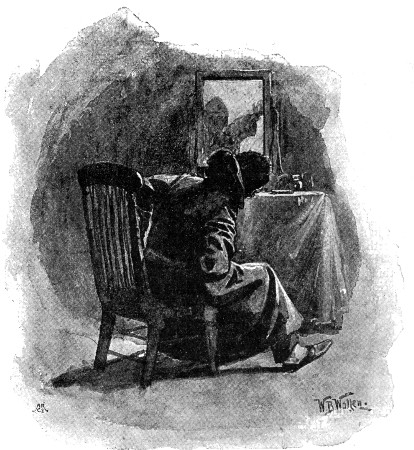 "THE MONK!"
"THE MONK!"
"I was in terrible straits," hurriedly went on Laurence. "I meant last night to appeal to you for a loan; but I fancied you seemed rather hard and stand-offish, and what I had to tell was not easy to tell. There was a prison before me, Meredith, unless I could get money, which there seemed no chance of my being able to get, and the knowledge that you had all those notes about you tempted me. I meant to take the five hundred, put the rest back, and trust to the chance of your not suspecting how it had gone. Of course, I cheated myself with the belief that if I could set myself straight this time, I would put my shoulder to the wheel and repay you somehow. I think I see myself as I am—now, and I know I shall not again try to retrieve my fortunes that way. You can't despise me more than I despise myself!"
"I am very sorry," said Meredith. "I did not imagine you were in such immediate necessity. I only wish you had told me last night, when all this might have been prevented"—still speaking a little abstractedly.[Pg 511] Was it to be regretted, after all, that Verschoyle had been brought face to face with himself in this way, since it had brought about such a revulsion in his mind? He presently decided what course he would take, and went on:—
"Look here, Verschoyle. I intended last night to ask you to let me help you in some way, and only delayed until this morning because I wanted to reflect a little as to the best means of doing so. We will go into that later on. I will only say now that you need be under no anxiety as to the money. I have a good income—more, a great deal, than I desire to spend—and there is a large surplus lying idle at my banker's just now. Use it to set yourself straight with the world, old fellow"; then, as the other made a gesture of dissent: "Let me have my say. You shall repay me when you have made your way—as a man of your ability is sure to do. Nonsense, you have your mother and sister to consider, you know."
"My poor mother and Madge. Meredith, you could never imagine what my sister has been to us."
"Couldn't I?" thought Meredith.
"She has kept us going the last six months; and though the pressure was growing heavier and heavier, she never——What a selfish brute I have been!"
"Come, it's something to recognise that!" thought Meredith. "There's some hope for you, after all"; adding to the other: "We will get these bills settled at once, and then we can see what you are most inclined to turn to."
The two young men went down together, and found breakfast awaiting them—a more varied and bountiful repast than had been set before them the previous evening, Sally having run down to an adjacent farmhouse for supplies. The two breakfasted together alone. Mrs. Verschoyle kept her room till later in the day, and her daughter, who was superintending in the kitchen, had only time to look in with a morning greeting.
After breakfast the two young men held consultation together, then set off for the town, called at the lawyer's office there, and sent off sundry telegrams. When they returned to the Priory later in the day, it was explained that Meredith had been helping Laurence with his advice on business matters.
"He is the best old fellow in the world, Madge—acting with the noblest generosity! I think all our troubles will soon be over now," said Laurence to his sister when they were alone.
"Generosity! Oh, Laurence, you won't take his money?" she ejaculated, a ring of sharp pain in her voice. "Not his money!"
"I won't take advantage of him, Madge. I swear it. Something has happened. I am a different man, and my whole life will be changed."
His tone and manner gave her more hope than even his words.
"I am going to set to work in earnest; and he will be repaid for all he means to do."
"Are you sure?" she murmured; adding a little doubtfully, with the remembrance of past experience: "But how?"
"That you will see later on."
She was to see, in another way than that he supposed. Meredith lost no time in striving to gain the prize he had set his heart upon, returning again and again to the Priory until he had won his wife.
It was the last evening of their stay at the old place. On the morrow Margaret Verschoyle was to be his wife, and they were to go direct to his beautiful Devonshire home for the purpose of comfortably installing her mother there, before setting forth on the tour. Mrs. Verschoyle's health had wonderfully improved with the knowledge of her children's bright prospects; and wonders were expected from the soft Devonshire air.
They had been reading a letter from Laurence, full of hope and enthusiasm for the new life he had begun in Canada, where he had chosen to make his start, Meredith having rendered the way easy for him.
As they lingered on the terrace, the happy girl ventured to whisper out the confession that had to be made before she became his wife. She must have no secrets from him now.
"Allan, you know now—Laurence has told you what he meant to do. But there is something else you ought to know. How shall I tell you? He thought he saw a ghost that night; but, oh, Allan, it was I!"
"I don't think he would have done it after all, darling. I believe he would have made a clean breast of it in the morning, in any case."
"But are you not surprised to hear it was I who played the ghost the second time?"
He replied only by a caress.
"I did it in the desperation of the moment, and fear gave me courage."
"The first time I have heard of fear giving courage," taking the sweet face between his hands and looking into her eyes.
"Oh, well! I meant fear for him. I[Pg 512] thought—I feared that Laurence was going into your room—I watched him go; and then, putting on a long waterproof cloak, and drawing the hood over my head to look like the monk, I followed him. It was I who put the pocket-book back."
"How did you manage it?" with a smile.
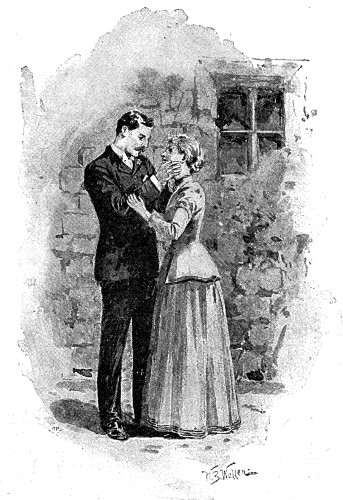 "HOW DID YOU MANAGE IT?"
"HOW DID YOU MANAGE IT?"
"You see, you had left your window a little open. I climbed the thick ivy that runs up the wall—I had often done it when a child—slipped my hand between the bars of the window, and put the book upon the table."
"But you forgot to raise your hand in warning; and ghosts are not generally in such a hurry, I think, to say nothing of the size of the hand."
"It was a scramble; did you hear me fall?"
"I heard a little 'Oh!'"
"Then you did know?"
"I knew Verschoyle had a very good sister."
"Allan, I do not think he suspects. Ought I not to tell him the truth?"
"Not yet. Since the impression has worked such good effects, as well let him remain under it for a while. Time enough to knock down the scaffolding when the building is completed—eh, darling?"
The Boltons, South Kensington, does not cover a very wide area—it is a circle of houses with a church in the centre, surrounded by trees, amongst the boughs of which the birds seem to sing and make merry from New Year's Day to the ringing out of the old year. This is the third time our note-book and pencil have been busily employed in this very pleasant corner of Kensington. At No. 16, Madame Albani has chatted over five o'clock tea and deliciously thin bread and butter; at No. 27, Mr. F. C. Burnand once frankly declared that to become a successful humorist one must needs possess a serious turn of mind, and refuse to yield to it!
I remember this as I cross to the opposite side of The Boltons to No. 11, where the great civil engineer and eminent sanitarian lives—the man who saved many a life in the Crimea, and has numerous works due to his engineering skill, not only in this country, but in distant lands. There is little about his house suggestive of the craft of which he is a past master. He pleads a most artistic hobby: that of pictures; and after spending a day with him and Lady Rawlinson—they have been happily married for sixty-three years—I made a hurried survey of the artistic treasures on the walls once more, and tried to single out a picture which had not some history attached to it. It was impossible. And the day's pleasure ended in not only listening to the story of a not uneventful life, but the bringing away of a collection of pictorial anecdotes of remarkable and often historical interest.
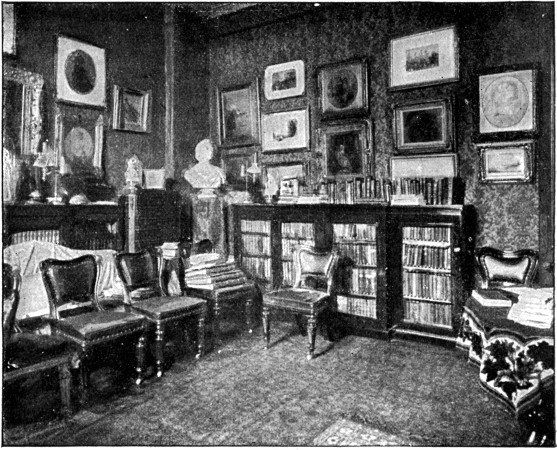 THE STUDY.
From a Photo. by Elliott & Fry.
THE STUDY.
From a Photo. by Elliott & Fry.
In appearance, Sir Robert, though on the very day I sit down to write he enters upon his eighty-third birthday, still retains that striking physique which singled him out as a probable "long liver" in the "fifties." He is tall, and his hair and beard are quite white—his spirits quick, undampable, and merry. That he is an enthusiast on many things is evident from the rapid way in which he discusses his pet subjects. Take Landseer, for instance. The great animal painter never produced a canvas of which Sir Robert could not tell you its story. On matters of hygiene—particularly of that relating to armies in the field—he is an indisputable authority, whilst he has always had the domiciliary condition of the people near at heart—the proper house accommodation of the people is a subject he is always ready to discuss. On all these matters, and many more, the great engineer speaks frankly, kindly, and well.[Pg 514]
The holly-bushes look delightfully green from the study windows. Here is a fine bust of Her Majesty, by Noble, and a statuette of Miss Florence Nightingale, with whom Sir Robert frequently came in contact during the Crimean War. There are several family portraits; and a couple of strikingly clever sketches of Paganini, by Landseer, draw from their present possessor the remark that he never heard the famous violinist, because the prices charged for admission were beyond his means, but he caught sight of him by waiting at the door of the theatre until he came out. Marshall, the painter, is represented by an old lady picking a goose.
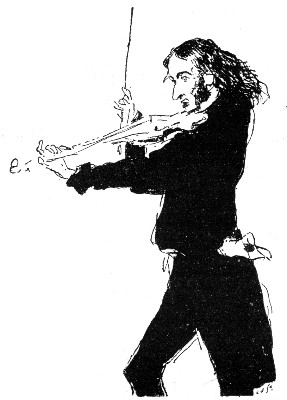 PAGANINI.
By Sir Edwin Landseer.
PAGANINI.
By Sir Edwin Landseer.
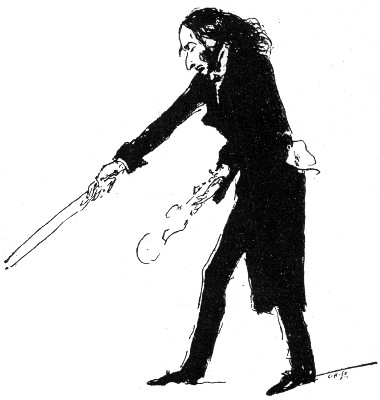 PAGANINI.
By Sir Edwin Landseer.
PAGANINI.
By Sir Edwin Landseer.
"I like that picture," said Sir Robert, "because the face is the nearest resemblance to my old mother I ever saw. There's a couple of curious sea pieces," pointing to a pair of pictures done on two pieces of rough deal board—"Storm" and "Calm." "They were painted by Richard Dadd, the mad artist. He had an illusion that his father was the devil. He was pronounced mad, and was confined in Broadmoor Lunatic Asylum. But come upstairs."
On the upper landing hang several remarkable examples of Dadd's work. One is a canvas executed before he went out of his mind; two depict his efforts afterwards. One of the latter is an Eastern market place, the other "The Crooked Path"—an incident from the "Pilgrim's Progress"—done on a sheet of brown paper, and dated Broadmoor, September, 1866. Every face painted bears the sign of insanity! The staircase, which is flooded with light from the beautiful stained-glass window, has many fine canvases, notably Landseer's original study for the companion to "Bolton Abbey in the Olden Time," a genuine Holbein of Harry the Eighth, a Linnell, small but precious, for it cost three hundred guineas, and the sketch for Sir Joshua Reynolds's "Holy Family."
In a small ante-room near here hangs a portrait of Miss Florence Nightingale as she appeared when engaged in her noble duties in the Crimean War. We pause for a moment before a moonlight scene—a picture of the graveyard in the Crimea, and Sir Robert crosses to a table and takes from it a forty-two pound shot, which he places in my hand—a shot of steel, forged and not cast.
"I keep that picture to remind me how very near I was being put to rest there myself," he said, thoughtfully; then, pointing to the cannon ball, he added, "Yes, and that very nearly did it. The story goes a long way to prove that nothing is ever lost by being polite."
Sir Robert Rawlinson is probably the only man living who has been knocked off his horse by a cannon ball. It was Sunday morning, the 18th of June, 1854, in the Crimea, that Sir Robert—then Mr. Rawlinson—was riding out with some young artillery officers down a ravine called "The Valley of the Shadow of Death." A great crowd of our soldiers were assembled on Cathcart's Hill, and the Russians began firing. Mr. Rawlinson called out to a captain:—
"I'm not going any farther; good morning," and raised his hat to salute him. As he did so the shot came whizzing along in front of him, cutting the reins, the pommel of the saddle, and driving a steel purse against the crest of the hip-bone,[Pg 515] making a large flesh wound, and seriously bruising the bone. The rider thought he was cut in two.
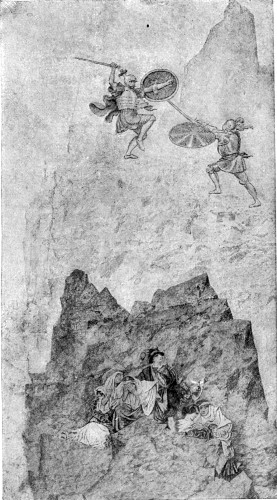 THE CROOKED PATH.
From a Painting by Richard Dadd.
THE CROOKED PATH.
From a Painting by Richard Dadd.
"Now, had I not raised my hat," said Sir Robert, merrily, "my right arm must have been taken off, as the shot perforated my coat beneath the arm. It has left a deep hole in my hip as a gentle little reminder!"
How pleasant were the picture stories told of the etchings and engravings in the bedroom! Over the door are the dogs of Sir Walter Scott, by a pupil of Tom Landseer—valuable, for it is the only proof taken from the plate in that state. And the Landseers! Over the mantel-board are "Night" and "Morning," and near by an etching—and Sir Robert said he considered it better than the engraving—of "The Monarch of the Glen," a picture which Landseer originally painted for the Refreshment Room of the House of Lords for 300 guineas, but which, much to the artist's chagrin, was rejected by a Fine Arts Committee, of which the Prince Consort was chairman. Here is "The Midsummer Night's Dream."
"I was talking to Landseer one day," said Sir Robert, "and I asked him why he had painted the dwarf yellow.
"'Oh!' he replied, 'that's mustard-seed, and he must be strong!'
"You notice the white hare in the picture," continued Sir Robert. "Landseer never made mistakes, but if anybody imagined he did, he was very smart in replying to the charge. A lady pointed out to him that she thought the rabbit was wrong—she had never seen a rabbit's legs placed like that. Landseer was equal to the occasion, for he replied:—
"'That is not a rabbit, madam; it's a white hare!'"
In a corner is the engraving of the portrait of Landseer himself, with a couple of dogs peeping over his shoulder. It was painted when the artist was sixty-three years of age with the aid of a looking-glass—and the retriever and collie came and looked over their master's shoulder to see what he was doing. What better title could have been found for it than "The Connoisseurs"? Landseer gave this picture to the Prince of Wales. We talked for a long time about Landseer. In Sir Robert's earlier days he was associated with Robert Stephenson, and we remembered a little story of a picture specially painted for Stephenson by Landseer.
"Stephenson was a man of a very kindly disposition and exceptionally simple tastes,"[Pg 516] said Sir Robert, "and some railway people wished to present him with a piece of plate of the value of 500 guineas. He had already received some £2,000 worth of plate, and assured his would-be kindly donors that he would rather have a picture by Landseer. This remark delighted the artist very much, and he said: 'This is the first time I ever heard of a fellow who preferred a picture to silver plate. Well, he shall have a good one.' The result was 'The Twins.'"
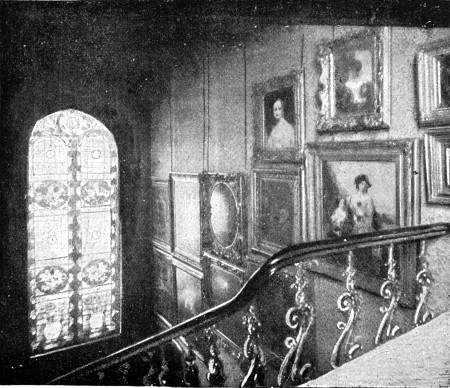 THE LANDING.
From a Photo. by Elliott & Fry.
THE LANDING.
From a Photo. by Elliott & Fry.
I could not help asking Sir Robert to allow me to tell him the sequel to this incident—a little anecdote related to me by the late Mr. Henry Graves, the famous print-seller, of Pall Mall, who probably knew Landseer better than any other man. The picture shows a sheep with twins by its side, and was the only painting the artist ever finished straightaway, instead of working on a number at the same time, as was his wont.
The picture was in the possession of Mr. Graves. He received a communication from America, saying that Landseer's work had never been seen in America; could it be lent for exhibition for a month in New York, in consideration of which they would take 500 guineas' worth of proofs, and insure it for £1,000? Here is the story in Mr. Graves's own words:—
"My American correspondent came over to look to the safety of the picture. We were dining together with some friends one night, and about eight o'clock he said:—
"'I must be off to Liverpool—the boat goes at twelve o'clock to-morrow.'
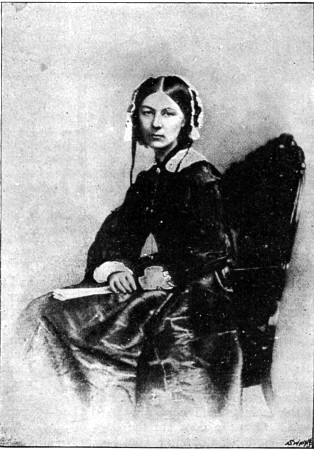 MISS FLORENCE NIGHTINGALE.
From a Photograph.
MISS FLORENCE NIGHTINGALE.
From a Photograph.
"I pressed him to stay, remarking[Pg 517] he could go by the early train in the morning and be in good time. He remained, and left on the morrow; the train was delayed, and he lost the boat. That vessel went down. But what about the picture? We wrote over to New York so as to get the necessary documents to claim the insurance, but they replied, 'What do you mean? The picture is being exhibited!' I had sent 'The Twins' in good time to Liverpool, and the authorities there noticing the case labelled 'Valuable picture by Landseer—great care,' and having a boat then going, were just in time to get it on board. Indeed, I believe it was the last thing received on board by the captain. So the picture went before, and the agent fortunately went after, the boat that was never heard of. It now hangs in the house of Mr. Stephenson's nephew."
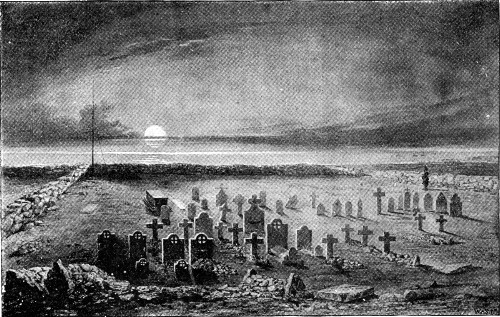 GRAVEYARD IN THE CRIMEA.
GRAVEYARD IN THE CRIMEA.
The drawing-room walls are covered with works of art—Sidney Cooper, George Frip, Müller, J. B. Pyne (who was Müller's master), Absalon (who designed the grand curtain for Her Majesty's Theatre), and Brittan Willis are all well represented. Absalon gives "Crecy" and "Agincourt" as they are to-day. In the latter picture the mill is shown where it is said the King stood while the Black Prince won the battle. A striking portrait of Lady Blessington is by Shalon, and there are no fewer than three valuable portraits of the Queen, one of which is the chalk drawing by Winterhalter, and the other is the original picture of Her Majesty painted by Parris from the orchestra of Drury Lane Theatre, a reproduction of which was published in the third number of this Magazine, together with the story associated with it, told me by the late Mr. Henry Graves, who sat by the side of Parris when he made the sketch. Lewis is responsible for "Interior of a Harem."
"Very expensive man to buy," Sir Robert said. "A few of his pictures were to be sold, and I attended the sale. One was a little larger than this, on a similar subject, and I thought I would buy it as a companion work. But it went for eleven hundred guineas!" Over a fine cabinet are a pair of dogs in pencil, by Landseer. "Racket" was drawn when he was ten years of age and "Pincher" a year later. The Satsuma ware and Sèvres china scattered about the apartment are exceptionally choice, and the curious cloth which covers the table in the centre of the room—a table, by-the-bye, which belonged to our Ambassador to France during the great Revolution of 1793—came from the Sultan's palace at Constantinople, and is worked with His Majesty's name in silk in the centre.
But what is unquestionably the most interesting among the contents of the drawing-room is the cabinet of Japanese ivories. It contains probably the finest collection[Pg 518] of such Japanese handicraft in miniature in the kingdom. There is everything in ivory, from a beggar with his rosary to a beauty with painted cheeks and almond-shaped eyes. You may handle the quaintest of ideas carried out in ivory; a skeleton carrying a baboon—calculated to beat Holbein's "Dance of Death" all to pieces; skulls with cobras intertwined—indeed, the serpent is everywhere; and all with some mystic meaning.
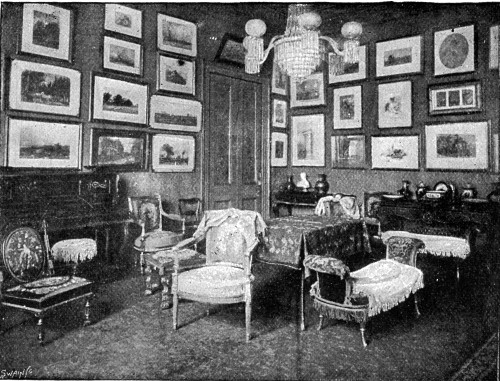 THE DRAWING-ROOM.
From a Photo. by Elliott & Fry.
THE DRAWING-ROOM.
From a Photo. by Elliott & Fry.
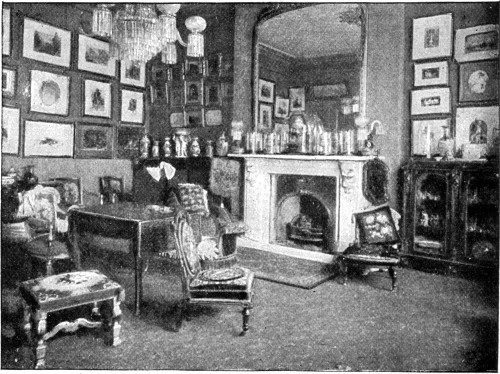 THE DRAWING-ROOM.
From a Photo. by Elliott & Fry.
THE DRAWING-ROOM.
From a Photo. by Elliott & Fry.
"The date of the workmanship of these," said Sir Robert, "must go back for centuries."
"I should think to the very beginning!" Lady Rawlinson remarked. And amongst these curios are rare jade bowls of white and green, and shining in the midst of all—as big and almost as brilliant as the noonday sun—is the largest ball of pure rock crystal in Europe. An exquisitely-carved rhinoceros horn in the shape of a goblet might possibly come in useful, for the legend associated with it runs that should poison be put in it, and some unkind friend request you to drink, the deadly liquor would disappear of its own accord.
We looked in at the small library, and then went into the dining-room. As in the drawing-room, the walls are hidden from view by artistic works—Landseer, Frith, Phil Morris, Müller, Ansdell, Ansdell and Phillip, Hefner, Weiser, Creswick, Sant, John Wilson, Junr., Solomon, and Henry O'Neil—the latter artist's "Return of the Wanderer" being in a conspicuous position. As Sir Robert points them out, he seems to see an unwritten story on every canvas. He singles out the Müller as his greatest treasure, for it was the last and possibly the best work the artist ever chronicled with his brush, and he died eight days after its completion.
Pointing to the first study of Frith's "Dolly[Pg 519] Varden," Sir Robert said: "Frith painted three 'Dolly Vardens.' One of these was a commission from Dickens in 1844, for which he received £20. When Frith asked Dickens if he wanted the sketch, his reply was, 'No, of course I don't.' That is the sketch which Dickens refused, for which I paid the small sum of fifteen guineas. At his sale the picture, for which he gave £20, realized one thousand guineas.
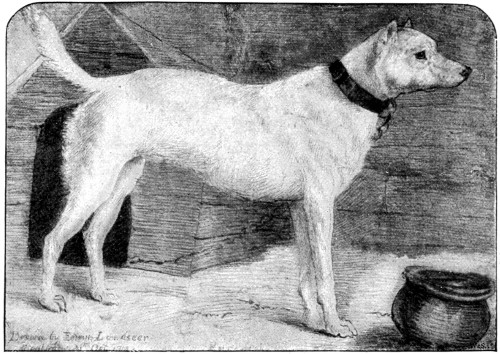 "RACKET."
From the Drawing by Sir Edwin Landseer.
"RACKET."
From the Drawing by Sir Edwin Landseer.
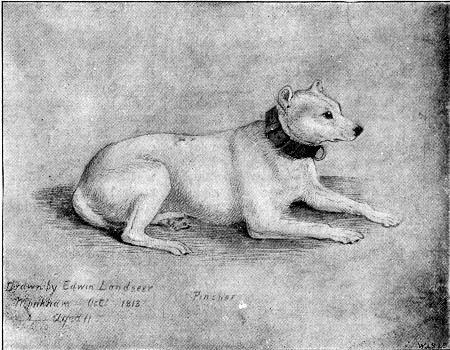 "PINCHER."
From the Drawing by Sir Edwin Landseer.
"PINCHER."
From the Drawing by Sir Edwin Landseer.
"Those donkeys on a common are by Ansdell, R.A. I gave him an order to paint me some donkeys, and he painted them in an old churchyard with tombstones. I complained to him in a joking sort of way.
"'Oh!' he replied, 'I thought a churchyard was just the place for a sanitary commissioner!'
"There is another canvas by Ansdell and Phillip, R.A.—a Spanish scene. Ansdell painted the mule and surrounding landscape, whilst Phillip put in the two figures. The young girl on the mule is Ansdell's daughter. That is Sant's own little girl in the picture called 'The Fairy Tale,' and 'The Gossips' is by Solomon, to which a story was written by Miss Power, the niece[Pg 520] of Lady Blessington. Whilst Solomon was painting 'The Gossips' for me, he was engaged on a portrait of Jenny Lind, who, by the way, used to live here in The Boltons. Solomon told me of some of the great singer's odd expressions which she made use of whilst her portrait was in progress of being painted.
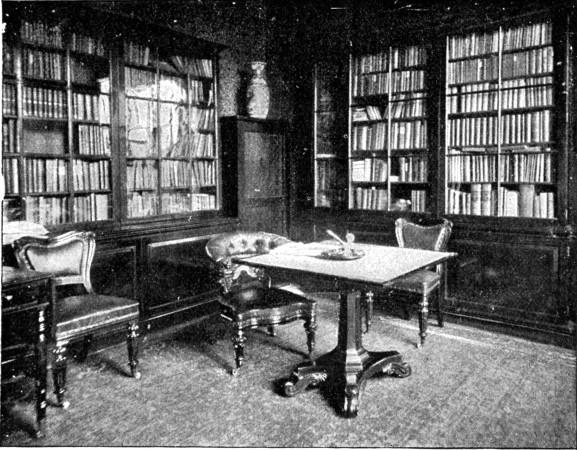 THE LIBRARY.
From a Photo. by Elliott & Fry.
THE LIBRARY.
From a Photo. by Elliott & Fry.
"'No, no,' she would cry, 'it's not like me! You haven't made my nose big enough. Don't you see my nose is all over my face? Oh! and look at my hair. It isn't green enough!'
"'Not green enough?' Solomon exclaimed.
"'No; don't you see that my hair is the colour of what you call hay before it is made?'"
So, brimful of these stories, we sat down together by the fire. I heard of a most useful life—a successful career, conceived and carried out by the man who related it. Whatever success has fallen to Sir Robert Rawlinson's lot has been honestly laboured for. Sir Robert to-day is a real example, a personified definition of—Industry. He refers to it all very quietly—there is not a tittle of over-estimated powers about his speech. He started life with a purpose—he has lived it with a will. Born at Bristol on the 28th February, 1810—his father, Thomas Rawlinson, of Chorley, Lancashire, was a mason and builder, his mother a Devonshire woman. Sir Robert barely went to school—he frankly declares that his education only cost three-halfpence a week. He worked at his father's business at Chorley, and before he was twenty-one he was a stone-mason, bricklayer, millwright, carpenter, sawyer, and even a navvy, and all with a view of grounding himself in everything of a practical nature which would tend to make him an engineer—a profession on which his heart was set.
"When I was one-and-twenty," he said, as he contemplatively turned over the past pages of his life in his mind, "I was residing at Liverpool and entered the Dock office under Jesse Hartley, the greatest dock engineer the world has seen. I remained there for five years, for the last three of which I was Hartley's confidential draughtsman and adviser. Then I went on to the London and Birmingham Railway, the Blisworth contract, under Robert Stephenson. Stephenson was remarkably considerate and indeed a gentleman, and treated me with almost brotherly kindness. I was in charge of the masonry. The railway was in a cutting about two miles long and sixty feet deep through rock, with an intervening bed of clay, which had to be cut out and then filled in with masonry. I was then twenty-six."
Mr. Rawlinson completed the work successfully. At the age of thirty, he once more went to Liverpool, filling the post of Assistant Surveyor to the Corporation. He remained there for two and a half years, when, on the recommendation of his first employer—Jesse Hartley—he was appointed engineer to the celebrated Bridgwater Canal. Then I listened to the story of how he came to design and complete the wonderful hollow brick ceiling over St. George's Hall, Liverpool; the lightest work of its kind, probably, in the world.
"Whilst I was in Liverpool," Sir Robert said, "I met young Harvey Lonsdale Elmes, the architect of St. George's Hall. He was[Pg 521] about twenty-four years of age, yet he captured 1,500 guineas, being the three premiums offered for designs for St. George's Hall, the New Law Courts, and the New Collegiate Institute. We often met and talked together. I assisted him in getting out the plan for the foundation, and I laid the first brick of St. George's Hall. Elmes was consumptive. He went for a time to the Isle of Wight. He became worse, and the doctors ordered him to winter in Kingston, Jamaica. One day, before leaving England, he sent for me.
"'Rawlinson,' he said, 'if anything would give me a chance of coming back with my life, it would be to see my building in your hands!'
"What could I say? I undertook the task until I handed it over to the great London architect, Mr. Cockerel, who completed it."
Now came an important epoch in Mr. Rawlinson's career. In 1848 the Public Health Act was passed and he was appointed the first engineer superintendent inspector. He made the first inquiry and wrote the first report on Dover—he subsequently inspected and reported on the state and condition of towns and villages from Berwick-on-Tweed to Land's End, from Liverpool to Hull.
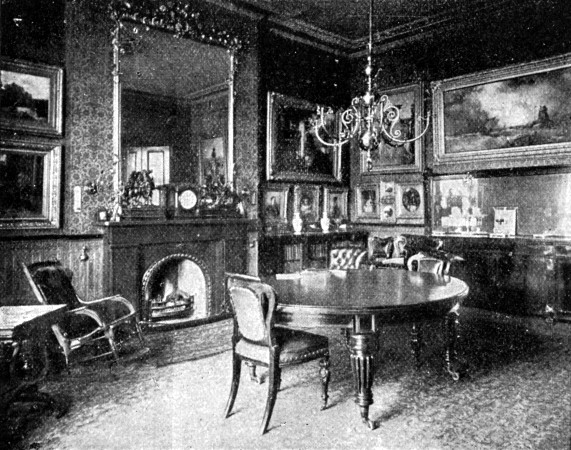 THE DINING-ROOM.
From a Photo. by Elliott & Fry.
THE DINING-ROOM.
From a Photo. by Elliott & Fry.
"The Commission of Inquiry lived until 1854," continued Sir Robert. "It met with such violent opposition in Parliament that it had to be broken up, though it was immediately revived by Lord Palmerston, under the chairmanship of Sir Benjamin Hall. I was at this time engineer to the Birmingham and Wolverhampton Waterworks." The lad who had been stone-mason and bricklayer, sawyer and carpenter, was earning £5,000 a year. It was at this point in our conversation that Sir Robert referred to the Duke of Wellington.
"I used to see him," he said, "walking down from Apsley House to the Chapel Royal, St. James's, in white trousers and blue frock-coat with brass buttons. Whenever he was in London on a Sunday he used to attend the early morning eight o'clock service at St. James's, and when I had any friends who wanted to see the great Duke, I used to take them to church. Frequently he, with myself and friends sitting at a good point of vantage, would be the only people there. But this by the way. Now came the winter of '54 and '55—the time of Crimea. In the spring of 1855 I was sent out as Engineering Sanitary Commissioner to the East. There is a portrait hanging there of Dr. Sutherland and myself taken in our hut in the Crimea.
"I was down in Lancashire one Saturday and came up to Euston in the evening, arriving there at ten o'clock. My wife was there with the brougham waiting for me—much to my surprise. She said, very quietly, 'I've got a note for you from Lord Shaftesbury; he's called several times to-day.' I knew what it meant—the Government wanted me to go out to the Crimea. The note read: 'Dear Rawlinson,—See me to-night if possible; if not, at eight o'clock to-morrow morning.' We drove away to Grosvenor Square at once, but Shaftesbury was dining with Palmerston. I went again at eight o'clock in the morning. He was sitting in his library.
"'Well, Rawlinson,' he said, with a gloomy expression, 'we are losing our poor[Pg 522] army in the Crimea. I've induced Palmerston to agree to a Sanitary Commission. Dr. Sutherland and Dr. Gavin will go, but I want an engineer. Will you go?'
"The whole thing now comes vividly before me. When I learned afterwards that from December to March, out of an army of 32,000 men, 11,000 had died through starvation and climate—in three months more at the same rate there would have been no British Army!
"'I'll go, my lord,' I said.
"He embraced me like a woman.
"'You shall take such powers as men never took before,' he said, and he kept his word. The Commission sailed on the following Thursday, at the end of February, landed at Constantinople on the 6th March, and the next day we went over to the great hospitals on the Asiatic side, where the men were dying at the rate of sixty and seventy a day. The wards were full of sick and dying, there was no adequate ventilation, and the area outside of the hospitals was covered with filth and the carcasses of animals. The cleansing was heavy work. On the second day of our arrival I had the upper portion of the windows broken to let ventilation into the rooms. Armenians and Greek labourers cleared away the carcasses—for the Turks would not touch them—and subsequently the hospitals were white-washed. By mid-summer our hospitals were the cleanest in Europe—so Florence Nightingale wrote home. The mortality decreased from sixty and seventy per thousand to twelve and fourteen, and went on improving. The French did nothing, although they had some palaces on the European side for their sick. They neither drained, ventilated, nor cleansed the surroundings—men, nurses, officers and doctors went down with fever—they telegraphed home for nurses and doctors; the reply was, 'there were none to spare.' Peace was absolutely necessary!"
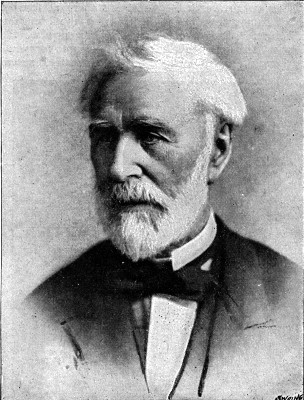 SIR ROBERT RAWLINSON.
From a Photo. by Elliott & Fry.
SIR ROBERT RAWLINSON.
From a Photo. by Elliott & Fry.
Sir Robert referred to all this very quietly, but the value of this work will never be estimated or known. Sir Colin Campbell—afterwards Lord Clyde—who led the Highland brigade at the Battle of the Alma—called him the "Inquisitor General," a compliment, indeed; and to-day the veteran field-marshal, Lord William Paulet, never meets him without gripping his hand and exclaiming: "I'm glad to see you, Rawlinson—had it not been for you I shouldn't be here to-day."
The wound from the cannon ball was the cause of Mr. Rawlinson's return home from the Crimea, but he continued to act until the end of the war. The late Emperor of Germany, Prince Bismarck, and Count Moltke have all acknowledged his services in sanitary matters. In 1864 Lord Palmerston made him a C.B., in 1885 Mr. Gladstone recommended him for Knighthood, and in 1889 Lord Salisbury for a K.C.B. Sir Robert has served on three Royal Commissions; water-works have been constructed under his directions in Hong Kong—the name Hong Kong curiously enough means 'fragrant streams'—and Singapore; and Sir Robert conceived and established a system of main sewerage which has had not a little to do with the health of the people.
Then as we sat together by the window opening on to the green lawn we talked of many a famous man Sir Robert had[Pg 523] known. He spoke of the blunt ways of Garibaldi—rough, uncouth, though not lacking in the heartiness, however, inseparable from a sailor. Then of Lord Shaftesbury, Carlyle, and many more.
"I remember a little incident that happened one day when I was staying with Lord Shaftesbury," said Sir Robert. "We were walking together in the grounds when a gardener approached him, and asked for a gun and packet of cartridges to shoot the blackbirds and thrushes which were ruining the fruit trees.
"'No,' said Shaftesbury. 'You may get nets if you like and cover the fruit, or hire a boy to keep the birds away, or sit up yourself; but if you shoot a bird in my gardens you must go about your business.'
"Next day I was standing with him on the steps. A gun went off.
"'Shooting?' I said.
"'Yes,' he replied; 'that's the keeper shooting your dinner.'
"'Well,' I said, 'if I have to come again into this world I'd be a blackbird or a thrush; I wouldn't be a pheasant or a partridge!'
"I can only hope he forgave me.
"Carlyle? Well, from about 1865, and on to near his death, at the request of the Sage of Chelsea, I spent many pleasant evenings with him. He usually sat on a low seat leaning against the side of the fire, smoking a long clay pipe up the drawing-room chimney. I sat on a chair on the opposite side of the fireplace. I do not remember that we ever had any form of drinkable refreshments during the couple of hours I might be with him in the evening.
"One night I questioned him about the destruction of the manuscript of a volume of his 'French Revolution.' I asked, 'Is it true that an entire volume of the manuscript was lost or destroyed?' when he replied in a tone of distress, 'Yes, yes; it is ower true. I lent it to a friend, and never saw it again.' I said, 'I can hardly comprehend how you got over it.' He replied, 'For two days and nights I could neither eat nor sleep.' I then said, 'Well, but you did get over it, some way?' 'Well, yes,' he replied. 'I just went into the country, and for several weeks did nothing but read Marryat's novels.' Bursting into a loud laugh, the thought of this time seemed now to amuse him. 'Well,' I said, 'and what did you do then?' When he replied, with a deep sigh, 'I just came back and wrote it all over again.' Then he further said, solemnly, 'I dinna think it's the same; no, I dinna think it's the same!'
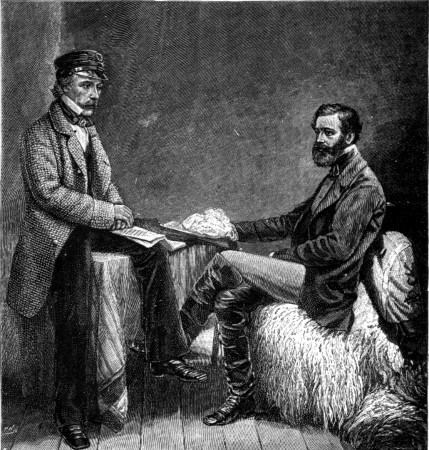 DR. SUTHERLAND. MR. RAWLINSON.
"IN THE CRIMEA."
From a Painting.
DR. SUTHERLAND. MR. RAWLINSON.
"IN THE CRIMEA."
From a Painting.
"On other evenings we had conversations on various matters, as for instance, modern portrait statuary in London, which I said upon the whole was not satisfactory, in which[Pg 524] he agreed. I ended the discussion by saying that if our portrait statuary became much worse, when some monster murderer had been tried and found guilty, the judge, putting on the black cap, should say, 'Prisoner at the bar, a jury of your countrymen having found you guilty of a most atrocious crime, you must be hanged until you are dead, and then a statue shall be erected to perpetuate your memory, and God help your soul.' Carlyle assented, but not in any hearty manner. No doubt I had ventured a little out of my bearings.
"On another occasion I brought on the subject of the attack of Mrs. Beecher Stowe on the memory of Lord Byron. I said there might be something in Byron's separation from his wife neither agreeable nor pleasant, but that I could not believe there was much of truth in the abominable scandals; and that, even if some of it was true, it did not justify Mrs. Beecher Stowe either to make or meddle. I further said that Byron, in his lone death, evinced more feeling for his wife than we have any evidence she ever did for him. In his dying moments he wished Fletcher, his servant, to convey a message to Lady Byron; with his last breath Byron muttered, 'You will be sure and tell Lady Byron.' Fletcher replied, 'I have not heard one word that you have said,' when Byron with an exclamation, 'Ah, my God!' fell back dead."
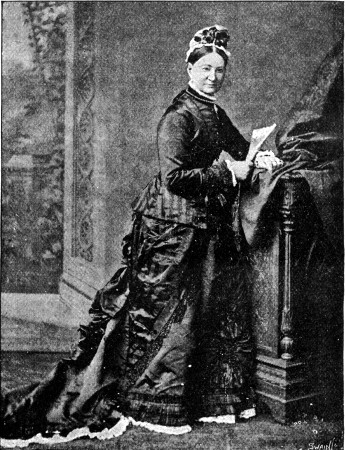 LADY RAWLINSON.
From a Photo. by Fall Baker Street. W.
LADY RAWLINSON.
From a Photo. by Fall Baker Street. W.
"You met Mrs. Carlyle, Sir Robert?" I asked, as we opened the veranda door to examine the bushes in the garden and watch what progress spring was making.
"No, never!"
"But do you know if it is true that Carlyle used to wear an expression of 'Silence, woman,' whenever she was in the room?"
"Well, you know," Sir Robert replied, "Carlyle lived in a house that stood on Thames gravel. Perhaps that accounted for his dyspepsia and her headaches. But I can tell you this: One day Mrs. Carlyle sent a message, saying she wanted to see me particularly. But I was not to go until she sent for me, and that would be when Thomas was away, for if he was at home when I called, she wouldn't be able to get a word in edgeways!"




I was brought up in the village of Montreuil, by the curé of the place. The happiest period of my life was that time when I was a choir-boy, with plump, rosy cheeks, a clear voice, and fair hair, wearing blouse and sabots. As I had given evidence of possessing a musical ear, the good father, who had himself been in former days a notable singer and choir-master at Notre Dame, kindly taught me my notes.
"Listen, Mathurin," he said to me one day: "you are only a peasant's son, but you know well your catechism and sol-fa, and some day, perhaps, if you are good and industrious, you may become a great musician."
This speech filled me with pleasure and pride, and I twanged more frequently and vigorously than ever upon my teacher's shrill and discordant old harp.
The favourite recreation of my leisure hours was to walk to the farther end of the park of Montreuil, and to eat my dinner there with the workmen who were building, in the avenue of Versailles, a little music pavilion, by order of the Queen. It was a charming spot.
I used to take with me upon these excursions a little girl of my own age, named Pierrette, who, because she had such a pretty voice, was also taught to sing by the curé. In her hand she would carry a large slice of bread-and-butter, with which her mother, who was the curé's housekeeper, had provided her. Together we watched with great interest the growth of the pretty little house.
Pierrette and I were at that time about thirteen years of age. She was already so beautiful that strangers would pause by the way to pay her compliments, and I have seen grand ladies descend from their carriages in order to caress her. She loved me as a brother.
From our infancy we had walked always hand-in-hand, and this grew into such a settled habit that in all her life I cannot remember once giving her my arm. Our visits to our favourite spot won for us the friendship of a young stone-cutter, some eight or ten years older than ourselves. He was a gentle-natured fellow, sometimes, but not often, mildly gay. While he worked, we would sit beside him upon a stone or on the ground. He had[Pg 529] made a little song about the stones that he cut, in which he said that they were harder than the heart of Pierrette, and he played in a hundred ways upon the words Pierre, Pierrette, Pierrerie, and Pierrot, to our endless amusement and delight. For our new friend was a poet. His father had been an architect, but in some way (I know not how) had come to ruin, and it fell to Michel to retrieve the family fortune. With his rule and hammer he supported a mother and two little brothers. He worked bravely at his stones, making couplets all the time; with each large block he would begin a new poem. His full name was Michel Jean Sedaine.
My parents I had never known, for they had died in my infancy, both about the same time, of the small-pox. But the curé had been a good father to me. At the age of sixteen I was wild and foolish, but I knew a little Latin and much about music, and was, moreover, a fairly skilful gardener. My life was a very happy one, for it was passed at the side of Pierrette.
One day, as I was engaged in lopping off the branches of one of the beeches in the park and tying them together into a small bundle, Pierrette suddenly exclaimed:—
"Oh, Mathurin! I am so frightened! Look at those fine ladies coming towards us through the alley? What can they be going to do?"
Looking in the direction she indicated, I saw two young women, who were walking at a rapid pace over the dead leaves. One, who was a trifle taller than the other, wore a gown of rose-coloured silk. She ran rather than walked, and her companion kept just a little behind. Like the poor peasant lad I was, I was seized with a kind of instinctive panic, and said to Pierrette:—
"Let us hide ourselves!"
But for that there was now no time, and my terror was redoubled when I saw the rose-coloured lady making signs to my blushing Pierrette, who remained as if rooted to the spot, grasping my hand tightly. I pulled off my cap, and stood leaning against the tree.
This lady came straight up to Pierrette, and, touching her under the chin, as if to show her to her friend, said:—
"Was I not right? Is this not the very thing for my milkmaid's costume on Thursday? What a pretty little girl it is! My child, will you give all your clothes, just as they are now, to the servants whom I will send for them? I will send you mine in exchange."
"Oh, madame!" was all that Pierrette could say.
The other young lady now came forward, and, laying her hand upon Pierrette's bare arm, encouraged her with gentle words, telling her that, this lady was one whom everybody obeyed. Then Madame Rose-colour spoke again:—
"Be sure that you alter nothing in your costume, little one," said she, shaking at the girl her dainty Malacca cane. "See! Here is a handsome fellow who will be a soldier, and to whom I will marry you."
So beautiful was she that I almost went on my knees to her. She had the appearance of a little, good fairy.
She talked fast and gaily. Bestowing a playful pat upon Pierrette's cheek, she turned and tripped away, followed by her companion. Hand-in-hand, according to our custom, we returned home, in silence, but with happy hearts.
I went straight to the curé, and said to him: "Monsieur le curé, I wish to be a soldier."
The good man was astounded.
"How is it, my dear child," said he, "that you desire to leave me? Do you no longer love me? Do you no longer love Pierrette? What have we done to you that you have grown tired of us? And is all the education I have given you to be thrown away? Answer, you naughty boy!" he commanded, with a shake of my arm.
With my eyes fixed upon my shoes, I repeated:—
"I wish to be a soldier."
Pierrette's mother, who had brought in a glassful of water to cool the curé's agitation, began to cry. Pierrette wept also, but she was not angry with me, for she knew well it was in order to marry her that I wished to go away.
At this moment appeared two tall, powdered lackeys and a lady's-maid, who inquired whether the little girl had got ready the costume asked for by the Queen and the Princess de Lamballe.
When these visitors had gone, and the commotion they caused had subsided, I was left alone with the curé, Pierrette and her mother having withdrawn in great excitement to "try on" the contents of the box which the Queen had sent in exchange for the little girl's frock and cap.
My guardian then requested me to relate to him the occurrences of the morning, which I did, somewhat more briefly than I have told them here.[Pg 530]
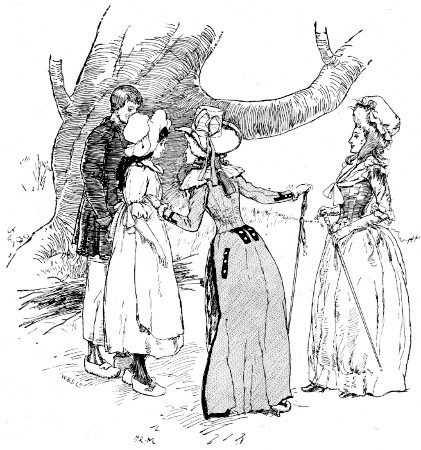 "THE OTHER LADY NOW CAME FORWARD."
"THE OTHER LADY NOW CAME FORWARD."
"And it is for this you would leave us, my son?" said my old friend, when I had ended my recital, holding my hands in his. For a long time he pleaded earnestly with me, setting forth the numerous hardships, perils, and temptations of a soldier's life, which, said he, would unfit me for becoming the husband of such a good, pure little being as Pierrette.
To all which I replied, doggedly:—
"I wish to be a soldier."
I had my way.
I enlisted into the noble corps of the Royal Auvergne. My training began, and I was promised that, if I behaved well, I should be admitted by-and-by into the first company of Grenadiers. I soon had a powdered queue falling in an imposing fashion over my white vest, but I no longer had Pierrette, or her mother, or the curé of Montreuil, and I made no more music.
One fine day, when I, confined to the barracks, was undergoing some absurd little punishment for having made three errors in the management of my arms, I received a visit from Michel.
"Ah, Mathurin!" he said to me, "you are well punished for having left Montreuil. You enjoy no longer the counsel and instruction of the good curé, and you are fast forgetting the music which you used to love so well."
"No matter," said I; "I have my wish."
"You no longer tend the fruit trees and gather the peaches of Montreuil with your Pierrette, who is as fresh and sweet as they."
"No matter," said I; "I have my wish."
"You will have to work hard for a very long time before you can become even a corporal."
"No matter," said I, again; "when I am a sergeant, I will marry Pierrette."
"Ah, Mathurin!" continued my friend; "believe me, you are unwise. You have too[Pg 531] much ambition and pride. Would you not like someone to buy you out, so that you might return to marry Pierrette?"
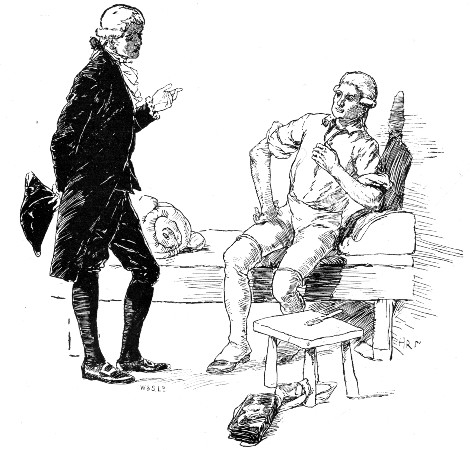 "BELIEVE ME, YOU ARE UNWISE."
"BELIEVE ME, YOU ARE UNWISE."
"Michel! Michel!" I cried; "have you not often told me yourself, 'Each one must make his own lot'? I do not choose to marry Pierrette with the money of others, and I am making my own lot, as you see. Besides, it was the Queen who put this idea into my head, and the Queen must know best. She said: 'He will be a soldier, and I will marry you to him.' She did not say, 'He will return after having been a soldier.'"
"But suppose," said Michel, "the Queen were to provide you with the means of marrying, would you not accept her bounty?"
"No, Michel! Even if such an unlikely thing were to happen, I would not take her money."
"And if Pierrette herself earned her dot?"
"Then, Michel, I would marry her at once."
"Well!" returned he, "I will tell that to the Queen."
"Are you crazy?" I said to him, "or are you now a servant in her house?"
"Neither the one nor the other, Mathurin, although I no longer cut stone."
"What do you cut, then?" asked I.
"I cut pieces, out of paper and ink."
"Is it possible?"
"Yes, my boy; I write simple little plays, easy to be understood. Some day, perhaps, you shall see one."
Meanwhile, my faithful Pierrette did not forget me. And one day a wonderful thing happened to her. She told me all about it afterwards.
It was Easter Monday. Pierrette was sitting before the curé's door, working and singing, when she saw a gorgeous carriage, drawn by six horses, coming through the avenue. It rolled right up to the curé's house, and then stopped. Pierrette now saw that the carriage was empty. As she was gazing with all her eyes, the equerry, taking off his hat with great politeness, begged her to enter the vehicle.
Pierrette had too much good sense to make any needless fuss. She simply slipped off her sabots, put on her shoes with the silver buckles, folded her work, and, assisted by the footman's arm, stepped into the carriage as if to the manner born.
Soon she found herself at Trianon, where she was conducted through gilded apartments into the Queen's presence. With the Queen was Madame de Lamballe, seated in an embrasure of a window, before an easel.
"Ah!" exclaimed the Queen, gaily, "here she is!" And she ran up to Pierrette, and took both her hands in her own. "How pretty she is!" she went on; "what a dear little model she will be for you! Sit there, my child."
With these words, Marie Antoinette gently pushed the bewildered Pierrette into a very[Pg 532] high chair, where she sat with her pretty feet dangling.
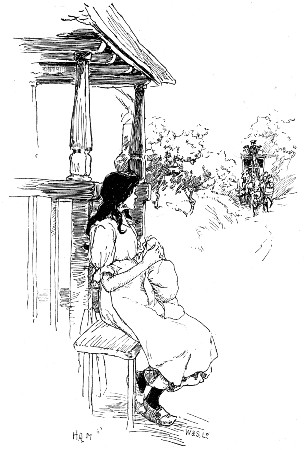 "SHE SAW A GORGEOUS CARRIAGE."
"SHE SAW A GORGEOUS CARRIAGE."
"Now listen to me, little one," continued the Queen. "Two gentlemen will shortly be coming here. Whether you do or do not recognise one of them is no matter, but whatever they tell you, that you must do. You will have to sing; I know that you can sing. Whenever they tell you to enter or to depart, to go or to come, you will obey them exactly. Do you understand me? All this will be for your good. This lady and I will help the gentlemen to teach you, and all that we ask in return for our pains is that, for one hour every day, you will sit for madame. You will not consider that any great hardship?"
Pierrette was so much more than satisfied with the bargain that she could have embraced the Queen in the exuberance of her gratitude.
As she was posing for Madame de Lamballe two men entered the room. One was stout, the other tall. At sight of the tall one she exclaimed: "Why! it is——" then stopped herself.
"Well, gentlemen," said Marie Antoinette, "what do you think of her? Was I not right?"
"It is Rose herself!" replied Sedaine.
"A single note, madame," said the other, M. Grévey, "and I shall know if she be as perfectly Monsigny's Rose as she is Sedaine's."
Then, turning to Pierrette, he said to her:—
"Sing the scale after me thus: Ut, Re, Mi, Fa, Sol."
The girl repeated his notes.
"She has a divine voice, madame!" was his verdict.
The Queen clapped her hands and jumped for joy, as she exclaimed:—
"She will gain her dot!"
Of all these gay proceedings I, of course, was ignorant. Ever since Michel's visit I had felt very wretched. I had no further tidings of my friends at Montreuil, and began to think that Pierrette must have quite forgotten me. The regiment remained at Orleans three months, and I had a bad fit of home-sickness which affected my physical health.
One day, in the street, an officer of our company called me to him, and pointing to a huge play-bill, said:—
"Read that, Mathurin."
This is what I read:—
"By order.
"On Monday next will be given a special performance of 'Irene,' the new work of M. de Voltaire, to be followed by 'Rose and Colas,' an operetta by M. Sedaine and M. de Monsigny, for the benefit of Mademoiselle Colombe, of the Comédie Italienne, who will appear in the second piece. Her Majesty the Queen has graciously promised to be present."
"What has that to do with me, my Captain?" inquired I.
"You are a good-looking fellow," said the officer. "I will get you powdered and frizzed out a bit, and station you at the door of the Royal box."
Thus it came to pass that the night of the performance found me in the theatre, resplendent in full uniform, standing upon a blue carpet, and surrounded on all sides by flowers and festoons.
While awaiting the Queen's arrival, I overheard a conversation between M. de Grévey and the manager of the theatre. The latter[Pg 533] seemed anxious concerning the qualifications of Mademoiselle Colombe, who, apparently, was quite unknown to him, while the other reassured him upon that point, and conveyed to him Her Majesty's guarantee that a sum equal to the half of the night's receipts should be paid to him for the use of his theatre. Evidently, the whole affair had been got up by the Queen.
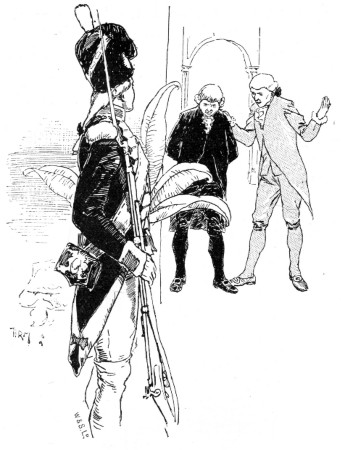 "I OVERHEARD A CONVERSATION."
"I OVERHEARD A CONVERSATION."
Their dialogue was interrupted by a sudden bustle and commotion, and the Queen entered so quickly that I had barely time to present arms. With her was the other young lady whom I had seen at Montreuil.
The performance commenced at once. All the time that 'Irene' was going on, the Queen laughed and chattered, but as soon as the operetta began, she was all attention, her example, of course, being followed by everyone in her box.
Suddenly I heard a woman's voice which thrilled me to the heart, and set me trembling so that I could scarcely hold my gun. Surely there was but one voice like that in all the world!
Through the gauze curtain drawn across the tiny window of the box, I got a glimpse of the performers. It was a little lady who was singing:—
Why! this charming Rose was just like Pierrette! She had her figure, her red and blue frock, her white petticoat, her pretty simple manner, her small shoes with the silver buckles, her red and blue stockings!
"Dear me!" said I to myself, "these actresses must be clever indeed to be able to make themselves look so much like other folks! Here is this famous Mademoiselle Colombe, who, no doubt, lives in a fine house, has several men-servants, and goes about in Paris dressed like a duchess, and she is exactly like Pierrette! But my poor little girl could not sing so well, although her voice may be quite as pretty."
I was so fascinated that I could not turn my head away from the glass, and presently the door of the box struck me in the face. Someone had opened it, because Her Majesty complained of the heat. I heard her say:—
"I am perfectly satisfied. My first gentleman-in-waiting may tell Mademoiselle Colombe that she will not repent having left to me the management of this affair. Ah! it amuses me so much!"
"There is no doubt, madame," said the Princess de Lamballe, "that your good deed is a complete success. Everyone is here. See, all the good townsfolk of Orleans are enchanted with this splendid singer, and the whole court is ready to applaud her."
She gave the signal for applause, and the audience, who, according to custom, had hitherto remained silent out of respect for the Queen, gave full vent to their enthusiasm. From that moment, scarcely a word of Rose's was allowed to pass without tremendous clapping. The Queen was delighted.
At the end of the piece the ladies threw their bouquets to Rose.
"Where is the real lover?" inquired the Queen of the Duc de Lauzun, who thereupon left the box, and beckoned to my captain in the corridor.
Again the nervous trembling seized me,[Pg 534] for I felt that something—I could not guess what—was about to happen to me.
My captain bowed respectfully, and conversed in a low tone with M. de Lauzun. Marie Antoinette was looking at me! I leaned against the wall to keep myself from falling. There were footsteps upon the staircase, and I saw Michel Sedaine, followed by Grévey and the podgy and pompous manager; and they were bringing Pierrette, the real Pierrette, my Pierrette, to me—my sister, my wife, my Pierrette of Montreuil!
The manager was exclaiming joyfully:—
"Here is a good night's work! Eighteen thousand francs!"
The Queen now came forward, and, taking Pierrette's hand, said in her gay, kindly manner:—
"You see, my child, there was no other way in which you could honourably earn your dot in a single hour. To-morrow I shall take you back to the curé of Montreuil, who will, I trust, absolve us both. He will forgive you for playing in a comedy once in your life."
Here the Queen, with a gracious bow, turned to me. To poor, bewildered, stupid me!
"I hope," said she, "that M. Mathurin will deign to accept Pierrette's fortune. I have added nothing to it; she has earned it all herself!"
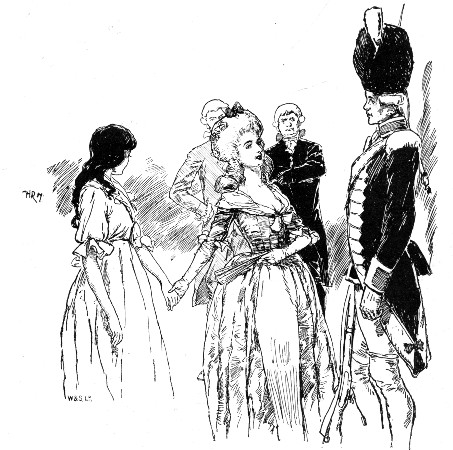 "SHE HAS EARNED IT ALL HERSELF!"
"SHE HAS EARNED IT ALL HERSELF!"

"Your crime," said Lord Justice Pimblekin, "is the most heartless, atrocious, inhuman, and horrible that it has ever been my misfortune to hear of: your long and cold-blooded premeditation; the cynical indifference to the result of your atrocities, combined with the delight with which you have wallowed in human gore; your contempt for all the dictates of honesty, truth, pity, and good faith; your greed, ingratitude, treachery, savageness, meanness, and cannibalism; all these things stamp you as the most atrocious, unmitigated and loathsome scoundrel, savage, monster, and vampire that ever wallowed in the foul and fathomless quagmire of infinite and immeasurable dastardliness.

"Under these circumstances I ought to inflict upon you the severest penalty which the law allows. I say it is my unmistakable duty to sentence you to penal servitude for life, with the cat once a week.
"Mercy would be thrown away upon you.
"Under these circumstances I will disregard my palpable duty, and render the whole proceedings a farce, by sentencing you to a fine of forty shillings, or a month."
The fine being immediately paid, the prisoner left the court amid the congratulations of his friends.
New laurels were added to the already superfoliated wreath of Lord Justice Pimblekin by this fresh masterpiece of judicial wisdom.
He was already the most renowned of all the judges on the Bench, and the admiration and envy of the whole judicial and forensic body.
His verdicts had a character of their own; the severity of his denunciation of inextenuable crime was only equalled by the inadequacy of the punishment dealt out; as he explained on each occasion, he never did his duty.

He designed a mixture of justice, equity,[Pg 536] and mercy; only he left out the first two ingredients. After the mental strain of that historical verdict recounted above, his lordship took a holiday. He had an offer of a seat in a balloon which was about to ascend, and accepted. The machine ascended successfully from his lordship's grounds, sailed majestically out to sea, and disappeared in the distance.

With the utmost anxiety the whole community waited for further news of the balloon; but none arrived. Either the eminent judge had been picked up by a passing ship bound for some remote parts, or he had perished.
A year passed without news; and it was then decided to erect a cenotaph to his lordship in Westminster Abbey.
One evening some time after this decision, Jemmy Wedge and Bill Slinker, the eminent burglars, sat in their humble room near the Mint, arranging the final details of a burglary dated for the following evening. Jemmy's eye, glancing casually round the room, perceived a dim figure standing in a dark corner. With a strong expression of disapproval, Jemmy jumped to his feet and sprang towards the intruding eavesdropper; but stopped suddenly with an ejaculation of surprise as he recognised the well-known and revered features of Lord Justice Pimblekin!


A flood of contending emotions welled up in the mind of Jemmy Wedge—rage at the overhearing of his plans by an intruder, and that intruder an administrator of the law; fear of the consequences; inveterate and deep-rooted affection for the judge who had so often saved him from the well-merited penalties of crime; surprise, wonder.
His arm, raised to fell the eavesdropper, sank impotently to his side: he gasped and stared.
"You need have no anxiety," said Lord Justice Pimblekin in a strange, hollow, far-off voice, "your secret is safe with me. I will not blow the gaff."
These words, spoken with the quiet judicial accent which Jemmy knew so well, yet in the far-off tone mentioned above, made Jemmy's eyes rounder than ever with wonderment.
No word of slang had ever before passed the lips of the judge: for slang might indeed be unintelligible to a judge who knew not what a race-course was, and would ask in court, "What is the 'Stock Exchange'—is it a cattle market?"

Lord Justice Pimblekin's head was drooped hopelessly upon his bosom; and he now covered his face with his trembling hands, while a bright tear crept out between his fingers, as he murmured in a quivering voice, "I am one of you now! I'm a pal—that's what I am; straight, and no kid, my pippin!" The painful effort with which these words were uttered was apparent in his whole frame. He had not finished speaking; he was obviously struggling with another word, which threatened to choke him. With an expression of horror and despair, he clutched his bald head; and then the word came—the single word "Blimey!" It was uttered in the same soft, mincing, judicial accents.
Then his lordship moved across the room and, sitting upon the table near the fire, drew out a short dirty clay pipe, lit it at the candle, and sat puffing at it; an occasional tear still creeping down his furrowed cheek.
"You may proceed with your deliberations with a perfect sense of security," he said anon. "Djeer, old pal? I ain't goin' to give yer away."
Every phrase of this kind evidently inflicted upon the unfortunate judge the most acute pain.
"To convince you how little you have to[Pg 537] apprehend from me," he continued, "I may inform you that I shall never again occupy my former judicial position; in fact, I am incapacitated from doing so by the fact that I am a GHOST!"

Now, Jemmy Wedge and Bill Slinker were superstitious and nervous to a degree, as most burglars are; and at that announcement their hair rose, and they stood gazing at the speaker with glaring eyes and chattering teeth.
"I am sorry to cause you such alarm," said the spectre, "and assure you I should only be too happy to go; but I cannot—it is not permitted me to do so.

"The balloon in which I ascended was found to have some defect in the valve, which made it impossible to descend; it, consequently, after rising to a great altitude, burst, hurling myself and the three other occupants of the car into the sea. I was unfortunately drowned—a most terrible loss to society! The three others were drowned also; but, as they were neither judges nor counsel, but merely ordinary persons, liable to be called as jurors or witnesses, their loss need not further concern us. If they had survived, they would have been subsequently killed at some time or other by their treatment in court.

"Well, I found myself floating among the disembodied spirits in space; and I became conscious that certain of those in my vicinity were eyeing me askance and whispering together in a menacing and most disturbing manner——" At this point the spectre broke down for a moment, and sobbed audibly, his emotion culminating in the words, "Strike me pink!" He then proceeded: "You must excuse this emotion—the whole thing has been too much for me—djeer?——in a most menacing and disturbing manner. Now and again these threatening spirits would beckon to their circle certain of those that passed; and these joined them in their minative demonstrations until, knock me funny! if the whole rabble did not surround me, covering me with vituperation. I gleaned from the evidence before me that they were innocent persons who had suffered in consequence of the inadequate punishments I had dealt out to various criminals during my judicial career. There was a woman who had been murdered by her husband after his release from the seven days I had given him for breaking both her arms and legs; there were seven babies who had been made away with by another malefactor, in his joy at escaping with one month for kicking a policeman to death. There were several hundreds of persons who had succumbed to the practices of a purveyor of diseased meat to the London markets who was an especial protégé of mine and whom I always—after the most scathing comments on his villainy—let off with a fine; and so forth.
"These indignant spectres dragged me before three spirits who acted as judges in those parts, and who, as I understood, had formerly been Mahatmas when living; and these, after hearing the evidence before the court, pronounced upon me a most—s'elp me beans!—most terrible sentence. I was condemned[Pg 538] to return to earth as a ghost, and there remain until the evil consequences of my lapses of duty had fully worked themselves out. This, they calculated, would amount to a sentence of about seven thousand years. There was no option of a fine, while my request for leave to appeal for a mandamus was dismissed with costs. My sentence also provided that I should be compelled to assist in all the crimes resulting from my own leniency, and should be powerless to prevent them by warning the sufferers or the authorities. And," concluded the unhappy spectre, sobbing aloud, "here I am, s'elp me!"


The two burglars were really touched, for they had loved Lord Justice Pimblekin as a true and valuable friend. They knew him to have been an old gentleman whose abhorrence of the vulgarity of crime had been equalled by his sensitive horror of illiterate, vulgar, or slangy speech; and they thus, to a certain extent, understood the painful nature of his present position, for the involuntary use of the idiom and ways of the society in which he was now condemned to mix was a part of his sentence.
Far into the night the judge sat smoking his short spectral pipe and drinking from an unsubstantial pewter pot, while he listened, shuddering, to the plans of the two burglars for the carrying out of their crime. With growing horror he gradually gleaned that the crib to be cracked was the house of his twin brother the Bishop of Hampstead, a lonely mansion near the village of Highgate.

He watched the two malefactors as they cleaned and loaded their revolvers and made other preparations for the expedition. If that judge had done his duty, these two would still have been working out their time for the last crime but seven which they had committed; whereas Lord Pimblekin had let them off for that job with three months, and visited their subsequent deeds with penalties which decreased at a constant ratio, until for the latest—burglarious entry, removal of property valued at £500, wilful destruction of other property valued at £5,000, and maiming of two policemen and one footman—he had given them seven days.

Now, it happened that there had been for the last year or so before the disappearance of Justice Pimblekin a disagreement of a somewhat painful nature between himself and his twin brother the Bishop of Hampstead.
Both were old gentlemen of the utmost purity and philanthropy of principle, to whom the injuring of anyone—especially a brother—would have been an idea of the utmost horror.
Besides this, their mutual affection was really very strong; but they had quarrelled about a matter of principle—a mere trifle: whether a piece of toast should be buttered[Pg 539] on the right or left side; and their feelings had become temporarily embittered.

This painful circumstance naturally increased the horror of the unhappy spectre at the present plans of the burglars, and he made the wildest efforts to go to his brother and warn him; but he was glued to the table.
Just as the clocks were striking 2 a.m., however, he felt that he could move; and swiftly gliding away from the attic, he hurried down into the street and strained every nerve to direct his course towards Highgate.
But every effort was vain; he was drawn, against his will, to a house where an habitual criminal whom his lordship had let loose upon society was engaged in preparing poisoned food for a family.
Having assisted in the mixing of the poison, he passed on and found himself in a room with a swindling company-director whom he had let off with six months instead of fifty years; and here he assisted in the drawing up of a new prospectus specially designed for the benefit of the widow and the fatherless who might happen to have a mite or two to be relieved of.
By this time it was morning; and the judge's ghost found himself in a shed where that diseased-meat purveyor whom he had alluded to was busy packing for the market; and the ghost helped with advice.
All that day he wandered from one criminal to another, from one victim to another; until the following night he once more joined the two burglars Jemmy and Bill at the carriage-gate of the residence of the Bishop of Hampstead. Convulsed with inexpressible grief, the spectre advised the stretching of wires across the lawn to trip up pursuers; then struggling madly against the words which he was forced to utter, he offered, as a ghost, to glide in through the walls and discover the most vulnerable fastenings; an offer which the two burglars eagerly and gratefully accepted. After this the judge's ghost pointed out where the plate was kept, and assisted in chloroforming the butler and stealing the key; and then he led the way to the cabinet in which the Bishopess of Hampstead kept her jewels, and kept watch while it was forced and the valuables were extracted.
All three had safely reached the library on their way out, when a piercing scream rang through the house; it was the scream of the spectre's sister-in-law the bishopess who had just awoke and discovered the loss of the jewels; and in another moment the bishop in his nightcap and slippers stood before them.

He was a brave bishop, and was in the act of felling Jemmy Wedge with a poker, when he recognised his brother; and the weapon fell from his hand, giving Jemmy a chance of whipping out his revolver and firing. The bishop fell; and the judge's ghost and he were left alone. Beside himself with despair, the ghost bent over his brother and tried to weep; but he felt that he was grinning from ear to ear and chuckling derisively. The wounded bishop slowly opened his eyes and gazed at him in grief and horror.

"Peter!" he gasped.
"He, he!" said the ghost. "We're quits now. I said I would round on you, old pal! You've got it now." Then straining every agonized nerve to prevent it, the judge's[Pg 540] ghost began to jig round the prostrate bishop and snap his fingers and hop lightly over him.

The other members of the family and the servants had collected and were gazing upon the scene: Mrs. Bishop glared at the ghost, uttered the word "Peter!" screamed a piercing scream, and swooned.

They carried the bishop and the bishopess upstairs and sent for a doctor, while the members of the family stood around the judge's ghost, gazing upon him with indignation and repugnance. In a hurried consultation they agreed that it would never do to hand him over to the police, as such a family scandal was not to be thought of.
"Do not loathe me," said the unfortunate spectre; "I am only a ghost!"
"A ghost!" cried the family in chorus; "a nice subterfuge! You expect us to believe that, of course? Go! Let us never see your face again!"
Slowly and with downcast eyes the ghost crept out through the bookcase and rejoined Jemmy and Bill to assist in disposing of the swag. They lavished upon him terms of endearment, and insisted on treating him at every public-house in the neighbourhood: and the sight of that respectably-dressed old gentleman with kid gloves and a short clay pipe surprised the pot-boys. The ghost could not consume the liquor, being too unsubstantial. At short intervals he would retire into a dark corner to beat his breast in remorse and anguish.
Presently Jemmy and Bill, who had been whispering earnestly together, turned respectfully to the spectre; they appeared very nervous, as though afraid to broach some delicate matter which was on their minds.
"Beg parding, boss—I mean my lordship"—began Jemmy, hesitatingly, and fidgeting from one foot to the other; "but we was a-going to ask yer if as how you'd 'ave enny objection——"
"Yus," chimed in Bill. "If ye'd take the 'uff if so be as we wos to——"
"Dry up, you, Bill," said Jemmy. "It's just this 'ere, guvnor. We wos a-thinkin' of crackin' another crib next week as yer might ha' heered ov in yer time—well, to bust out with it straight and candid, it's yer own crib as used to be w'en yer wos alive; but, yer see, bein' as how ye're dead now and it ain't o' no more good to yer—there's a nice little lot of old plate as you've got there as we sho'd be proud to 'andle. The on'y thing is——"
"Yus, that's w'ere it is," interrupted Bill. "The o'ny thing is as we might 'ave to knock yer missis—axin' pardon; 'er ladyship—on the 'ed, bein' a light sleeper, her maid ses, and a bit ov a spitfire, d'ye see?"
The judge's ghost attempted to give vent to a cry of indignant horror and forbid the attempt in the most unequivocal way. He struggled to rush forth and inform the police and the community; but he heard himself chuckle and felt himself slap the two burglars on the back, and knew that he was saying to them: "Heave ahead, my bloaters! I owe the old Dutch clock one for the naggings she's treated me to. I'm on this job, that's what I am!" And then he puffed away at his short clay, and kept on chuckling until he felt quite sick with misery.
"He's the right sort, so he is," said Bill, "and no two ways abaat it."
"Right yer are," said Jemmy. "'E's the sort o' pal for me, and no error."
Once more the judge's ghost wandered about from one malefactor to another, and from one victim to another, always assisting the malefactors and jeering the victims, and always welcome as a friend by the former, and cursed as an enemy by the latter. He had no rest night or day; he was constantly racked and harrowed by some new shock of grief or repugnance.
The thing got noised about, how the eminent and respected judge Lord Justice Pimblekin had not been killed in his balloon adventure, but had returned to the country and, disregarding all his old associations of morality, refinement, and respectability, was herding with criminals of the lowest type, and indulging in the most nefarious and vulgar practices.
At this time it was his fate to appear at a select meeting of the directors of that Widows' and Orphans' Fleecing Corporation Limited, the prospectus of which he had assisted in drawing up. His presence at first filled the directors with the gravest alarm; but when[Pg 541] the promoter explained how greatly his lordship had changed, they unanimously appointed him chairman. It was passingly suggested that his lordship's growing evil reputation might prejudice the concern in the eyes of the public; but the promoter, who knew the public well, reassuringly explained that investors were so hopelessly idiotic that a board composed entirely of burglars would not prevent their investing so long as the prospectus contained sufficiently impossible promises of profit; so the ghost of Lord Pimblekin officiated as chairman and assisted in causing several suicides.
Then the night came for the cracking of his own crib, and he continued to give vent to a succession of boisterous chuckles every one of which nearly killed him; only a ghost is a difficult thing to kill. Arrived at his palatial suburban residence, he directed the burglars to the outhouse where the ladders were kept; and the three first ascended to her ladyship's dressing-room where the jewels were. The door between the dressing-room and her ladyship's bedroom being open, the ghost undertook to stand over her with a phantom bludgeon to prevent any noise in the event of her waking. She woke, stared at his lordship, looked at the burglars at work at her bureau, gazed once more at the ghost with a look which froze him, murmured "Peter," and sank back with closed eyes.

Half mad with misery, the ghost directed the burglars to the plate and other valuables, and then looked on chuckling while they tore the silk curtains, jumped on her ladyship's favourite violin, ripped the carpet with a clasp-knife, cut the throat of the pug, and twisted the necks of the canaries and linnets and doves.
Then they left quietly; and, as the ghost followed them out, he was conscious of an immaterial form similar to his own standing at his side. "Come with me," said the form; and they whirled through space until they arrived in the same court in which sentence had been passed upon him. The three Mahatmas were still sitting on the bench, and the chief Mahatma said:—
"Prisoner, your case is one of the worst which it has ever been our painful task to pass sentence upon. Your reckless disregard of what you recognised as your duty and of the consequences of your misdemeanours on the bench render mercy in your case entirely out of place. It is our duty to give you the benefit of the full seven thousand years to which you have been sentenced; we will, however, release you on your own recognisances and allow you to return to earthly existence and again fill your former judicial sphere, with a view to observing how you go on for the future. You will be bound over to come up for judgment if called upon."
Instantly our judge found himself in the flesh once more, and robing for his accustomed seat on the bench. His reappearance caused great surprise, as his evil reputation was now public property and the authorities had removed his cenotaph from Westminster Abbey and sold it to a rag-shop.
However, as it is impossible to remove a judge from the bench even if he murders the Queen, the Royal Family, and the Bench of Bishops, steals the watches of the whole Houses of Lords and Commons, and even defrauds the Inland Revenue, Lord Justice Pimblekin was allowed to remain on the bench; and, as he was a socially influential person, bygones were allowed to be bygones.

But he was a reformed judge. He did his duty, and gave irredeemable criminals what they deserved; fraudulent company directors got the cat, and diseased meat purveyors a lifer, until there was hardly any crime left. Lord Justice Pimblekin's twin brother and wife recovered, and forgave him, and his lordship has not been called up for judgment yet.
J. F. Sullivan
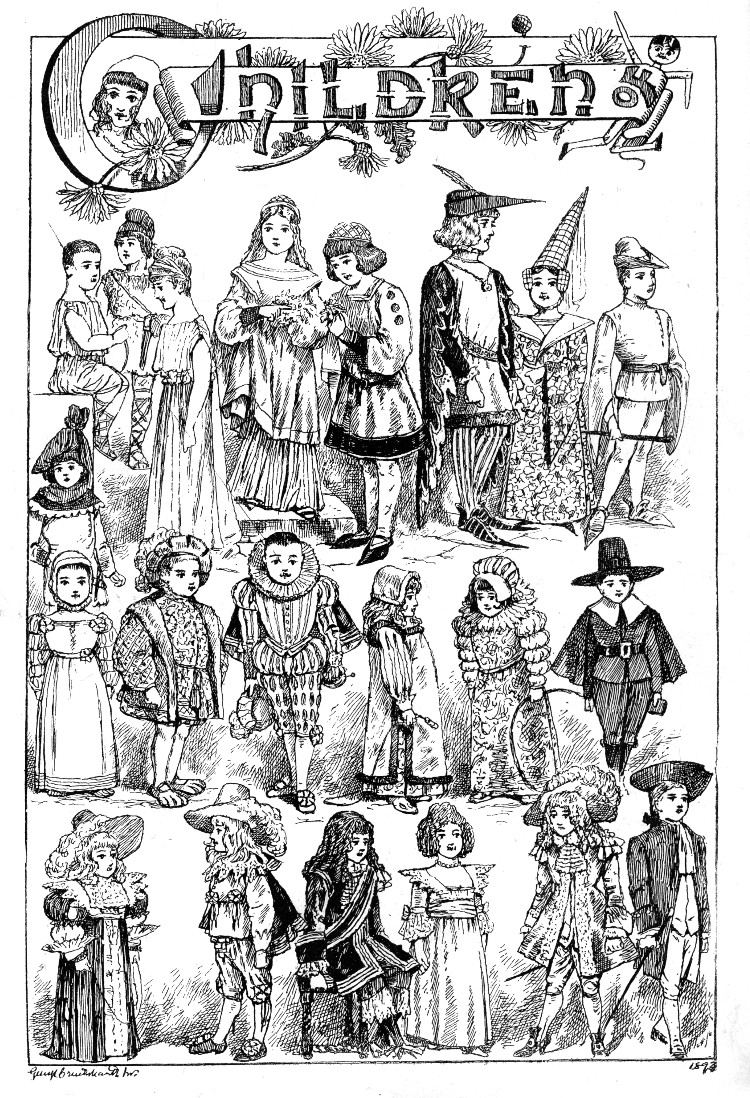
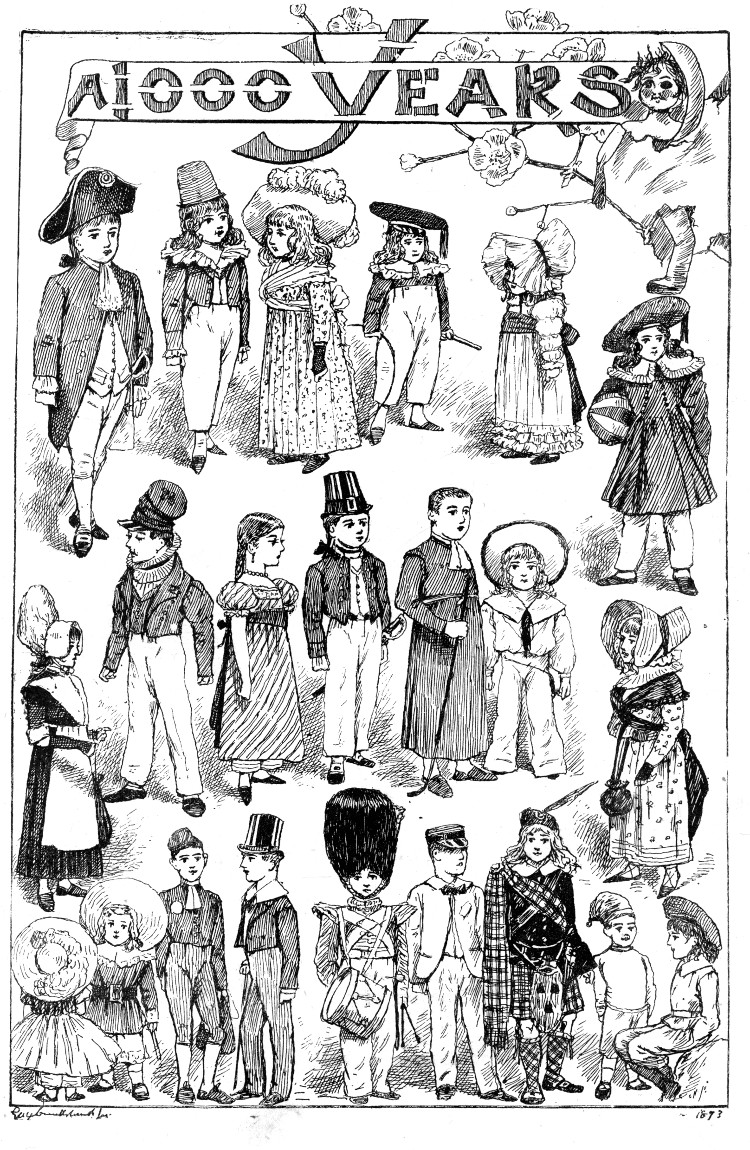
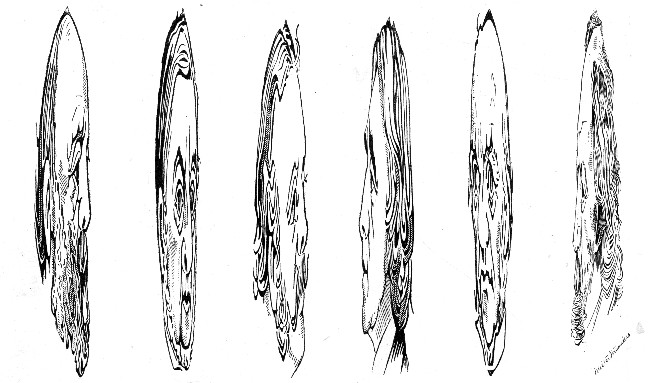 WHO ARE THESE?
WHO ARE THESE?